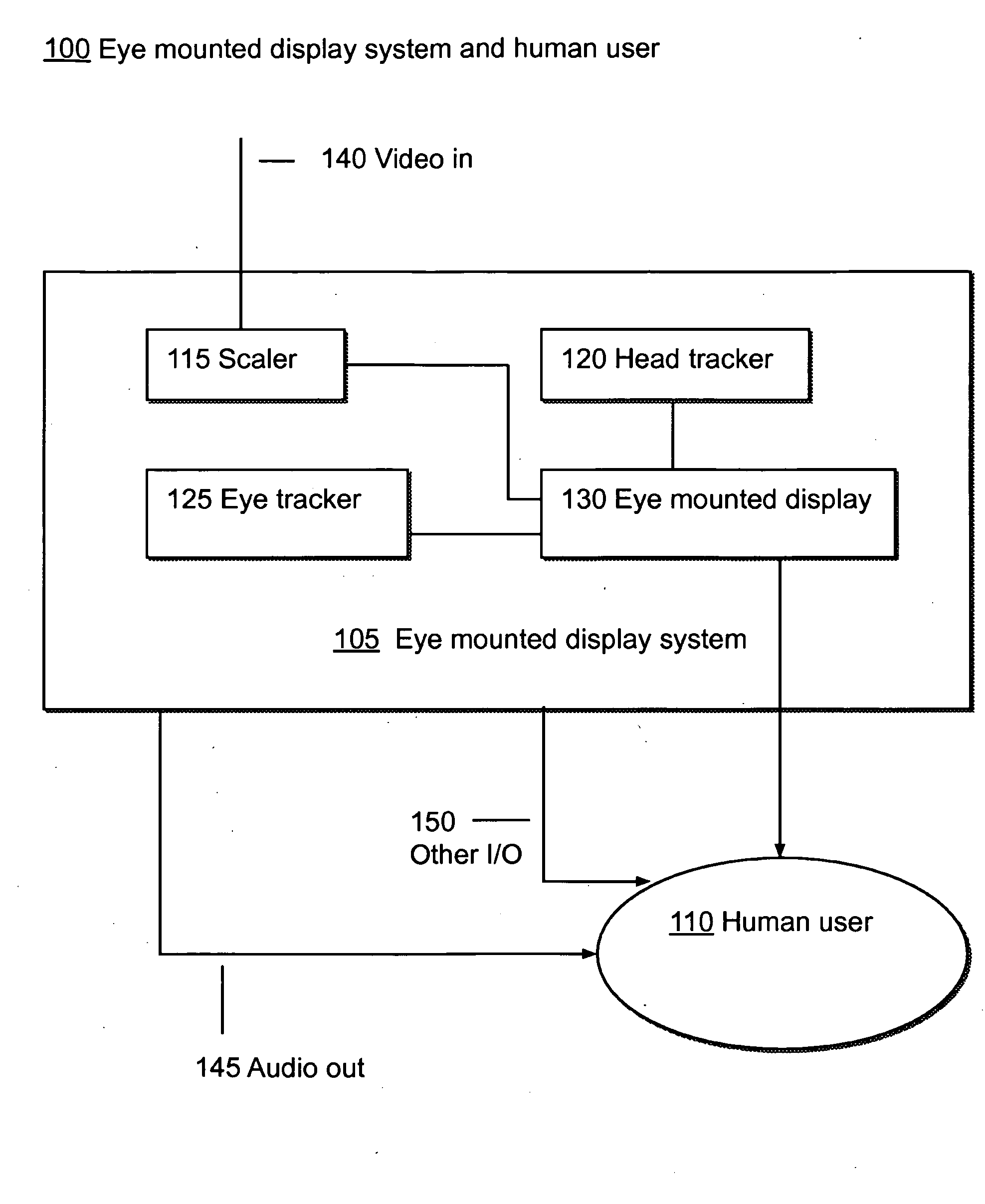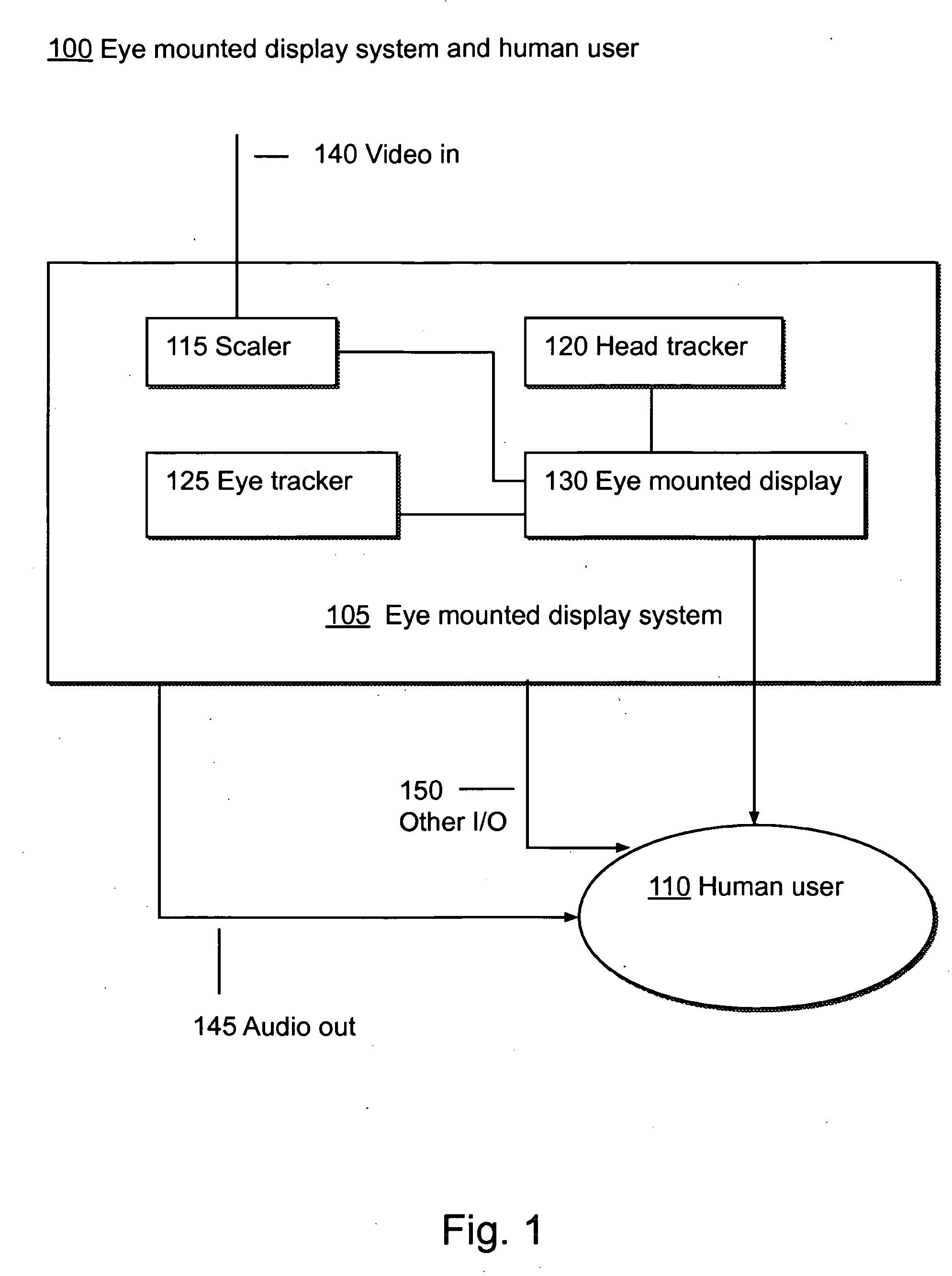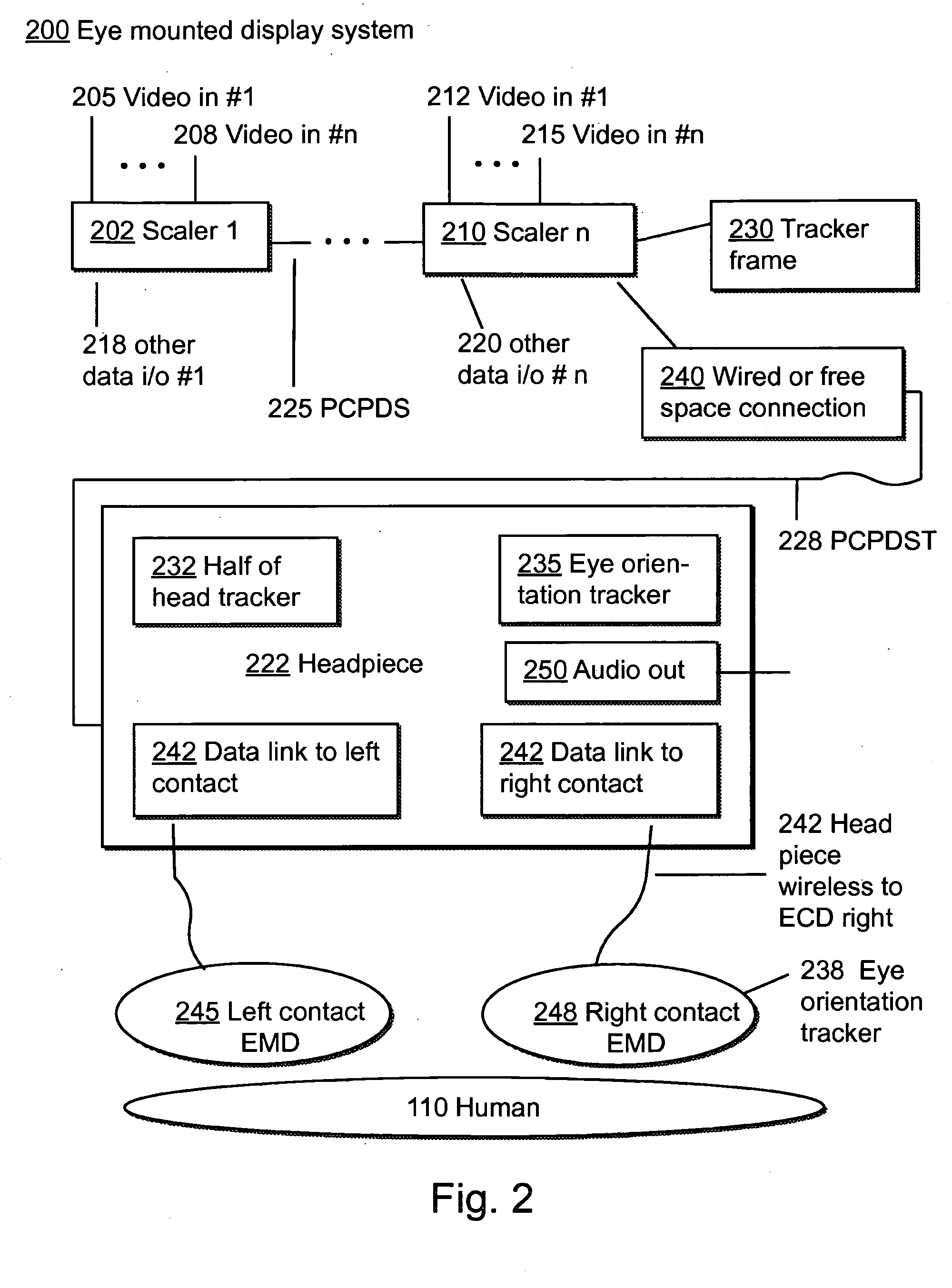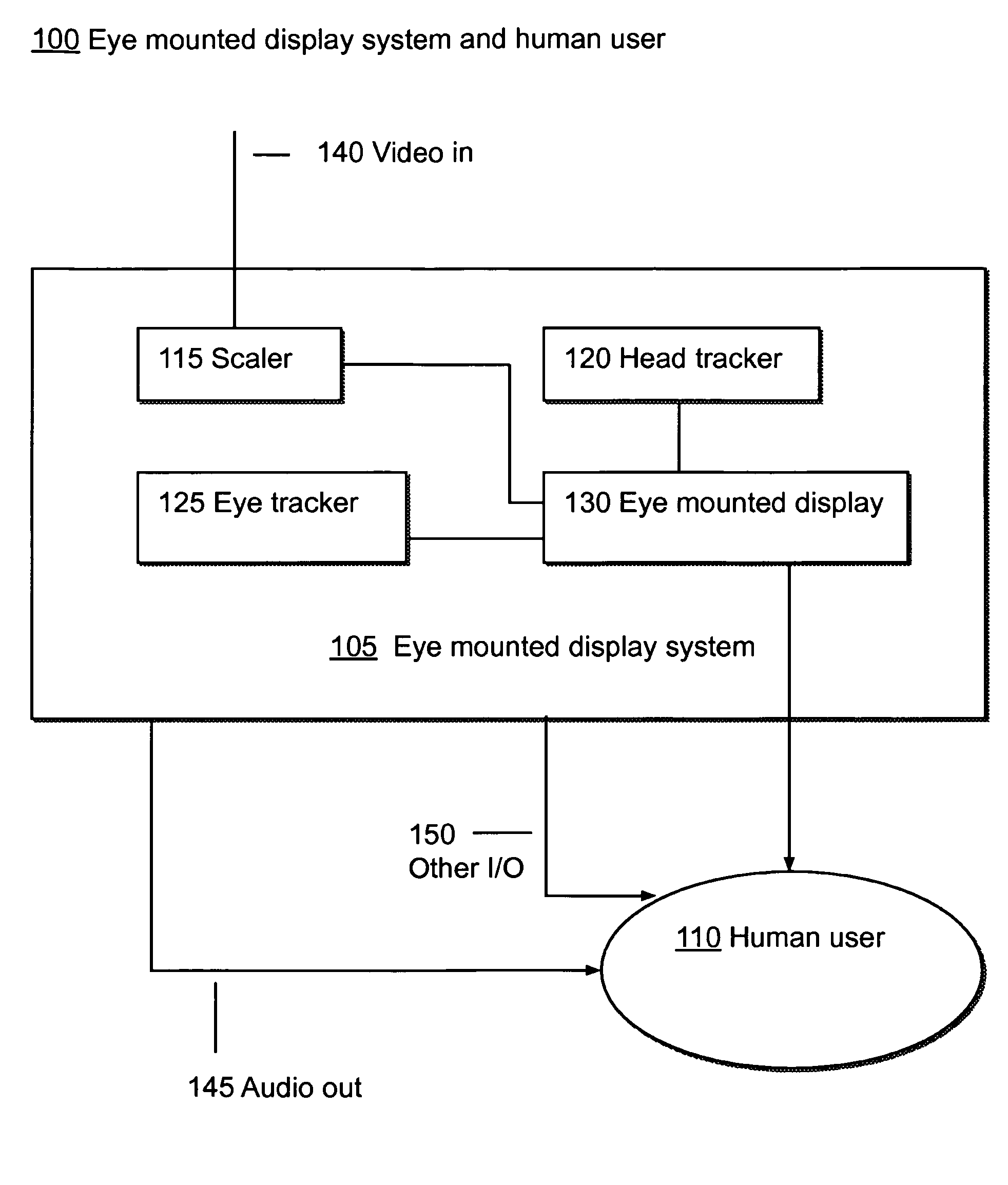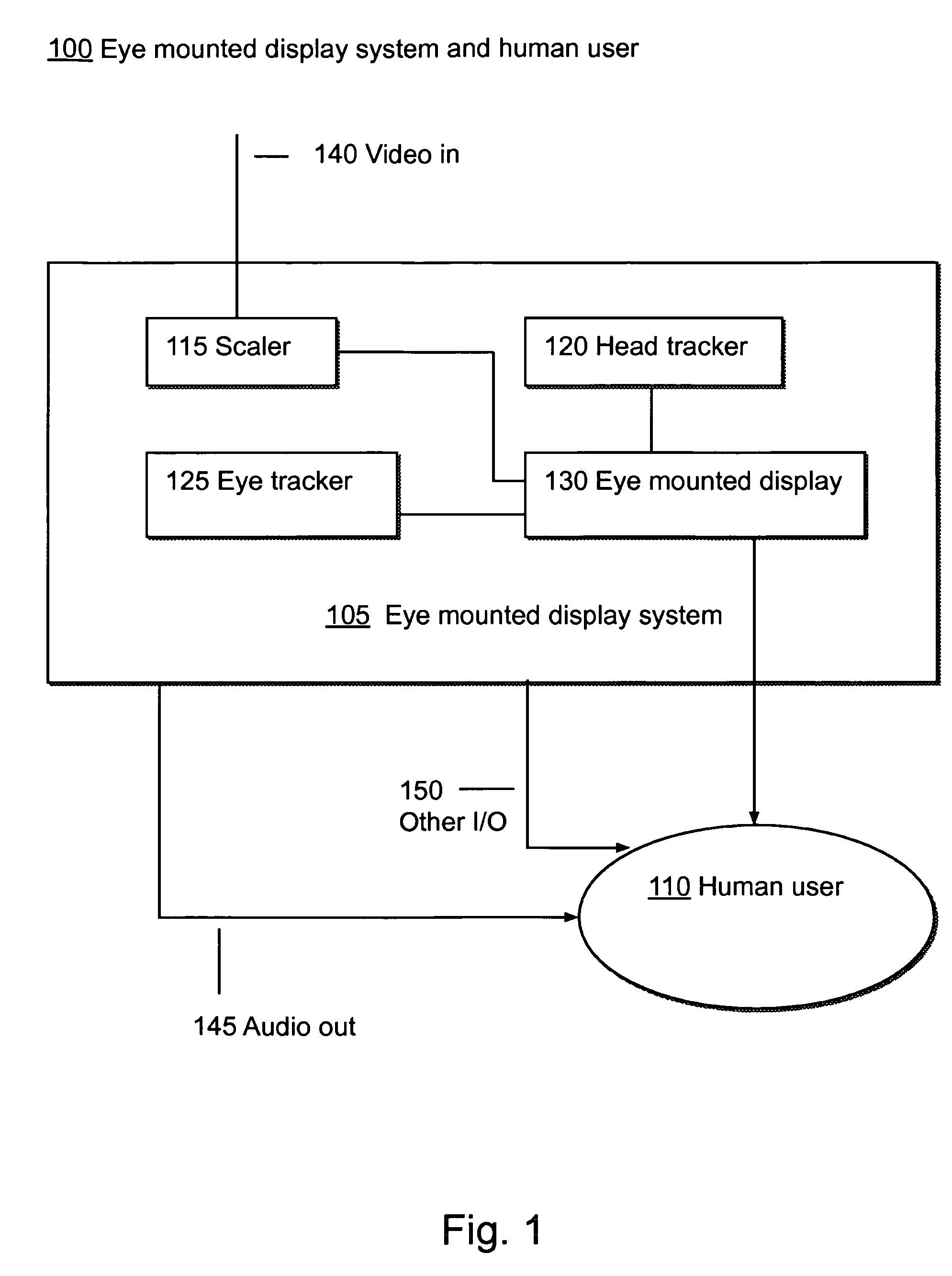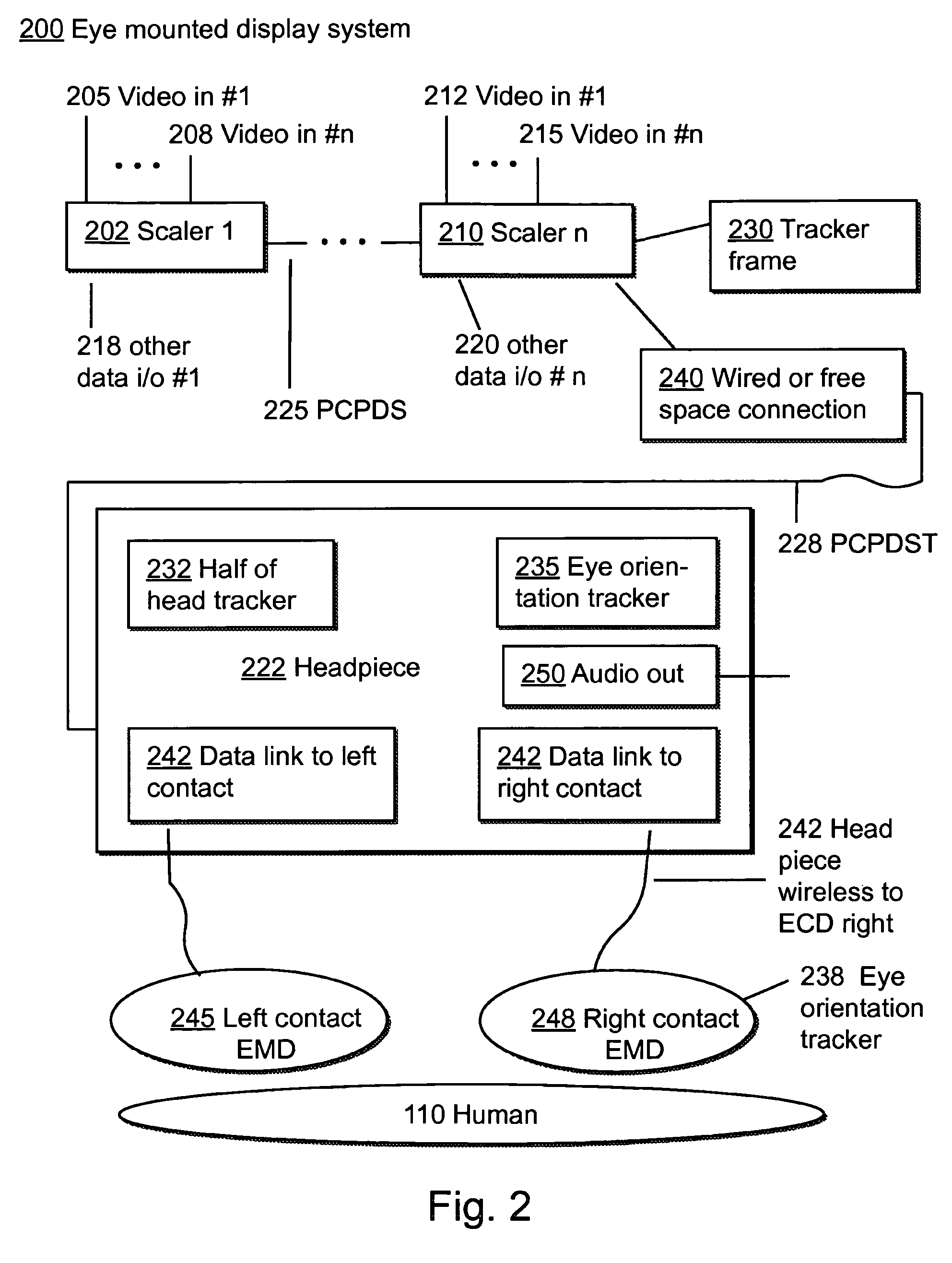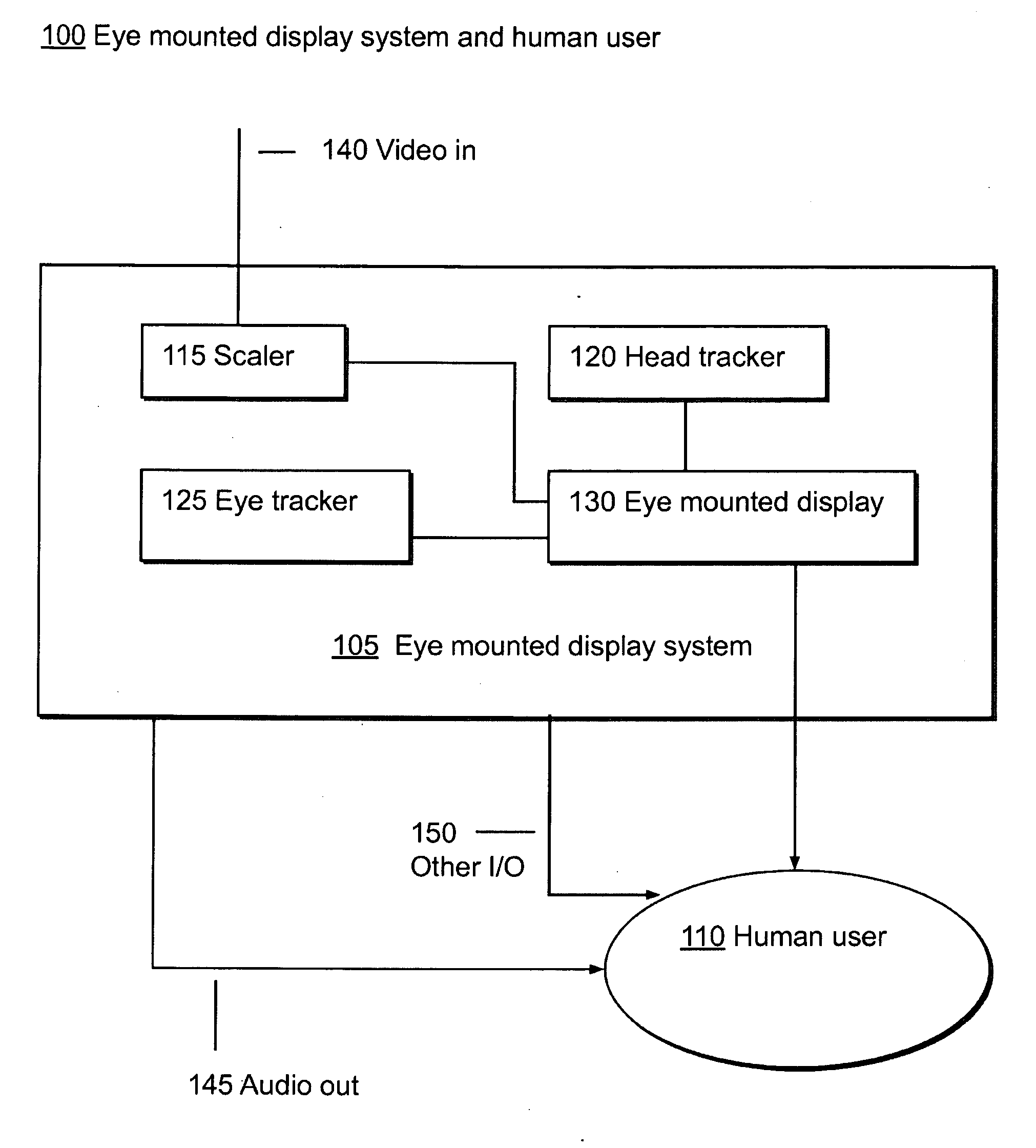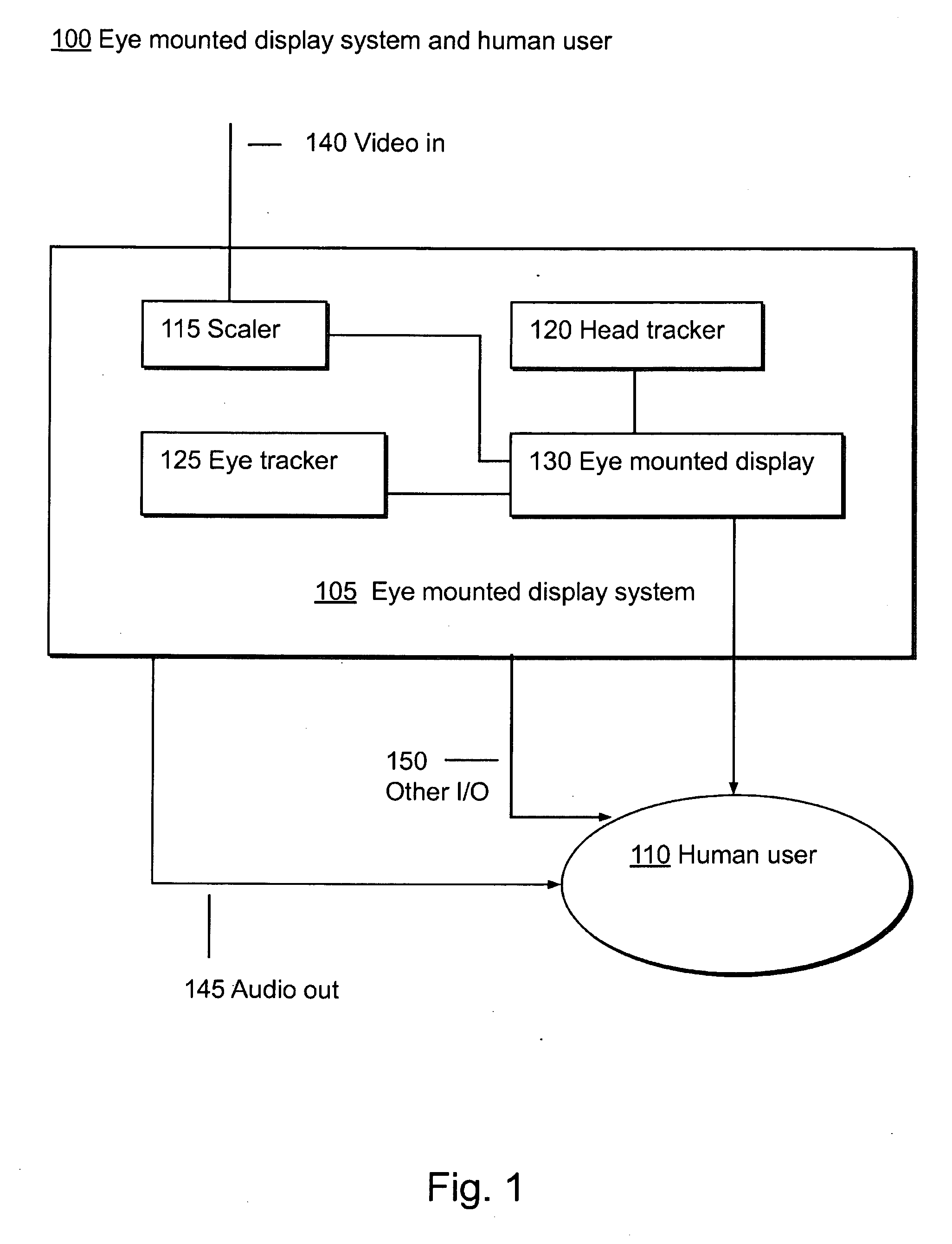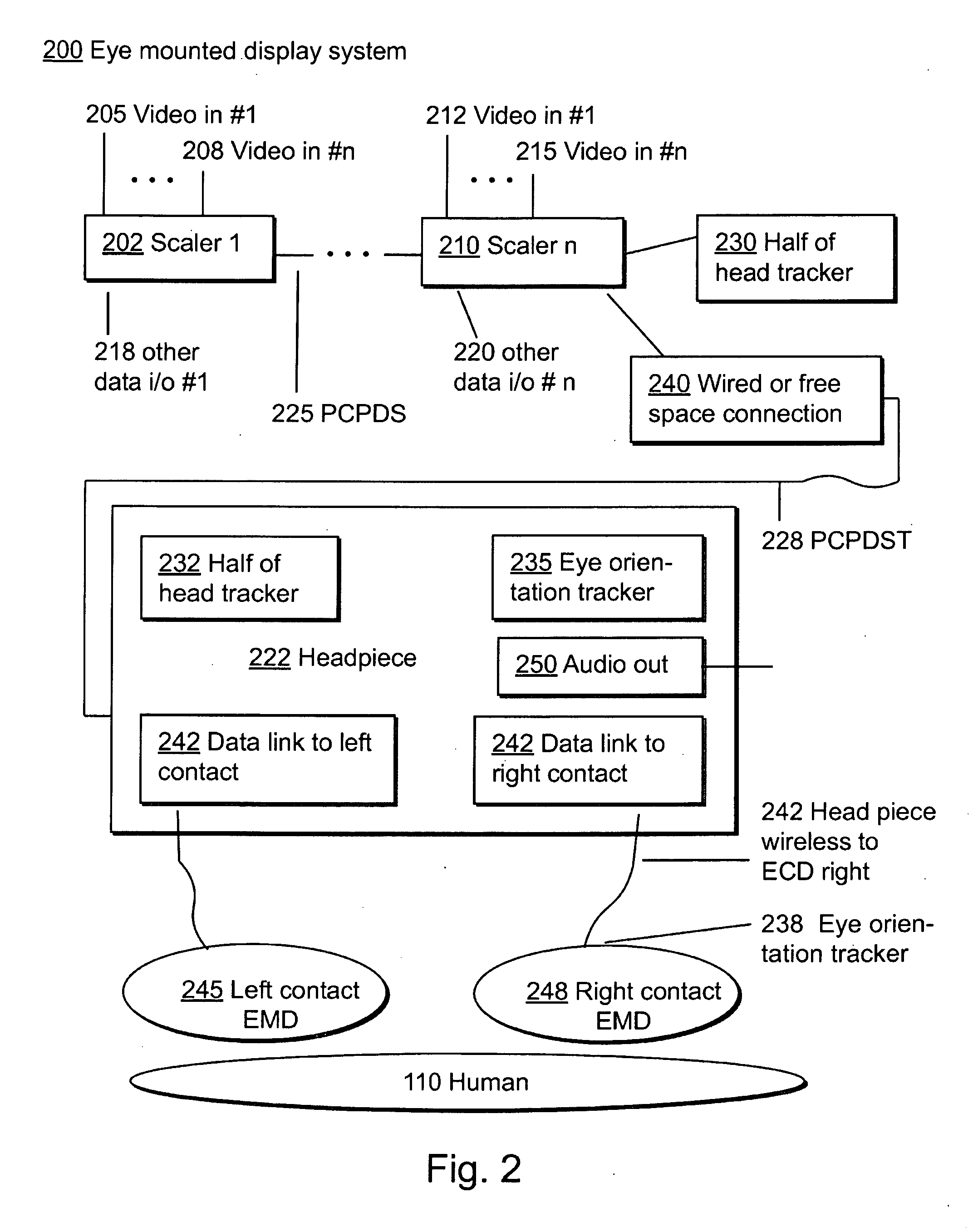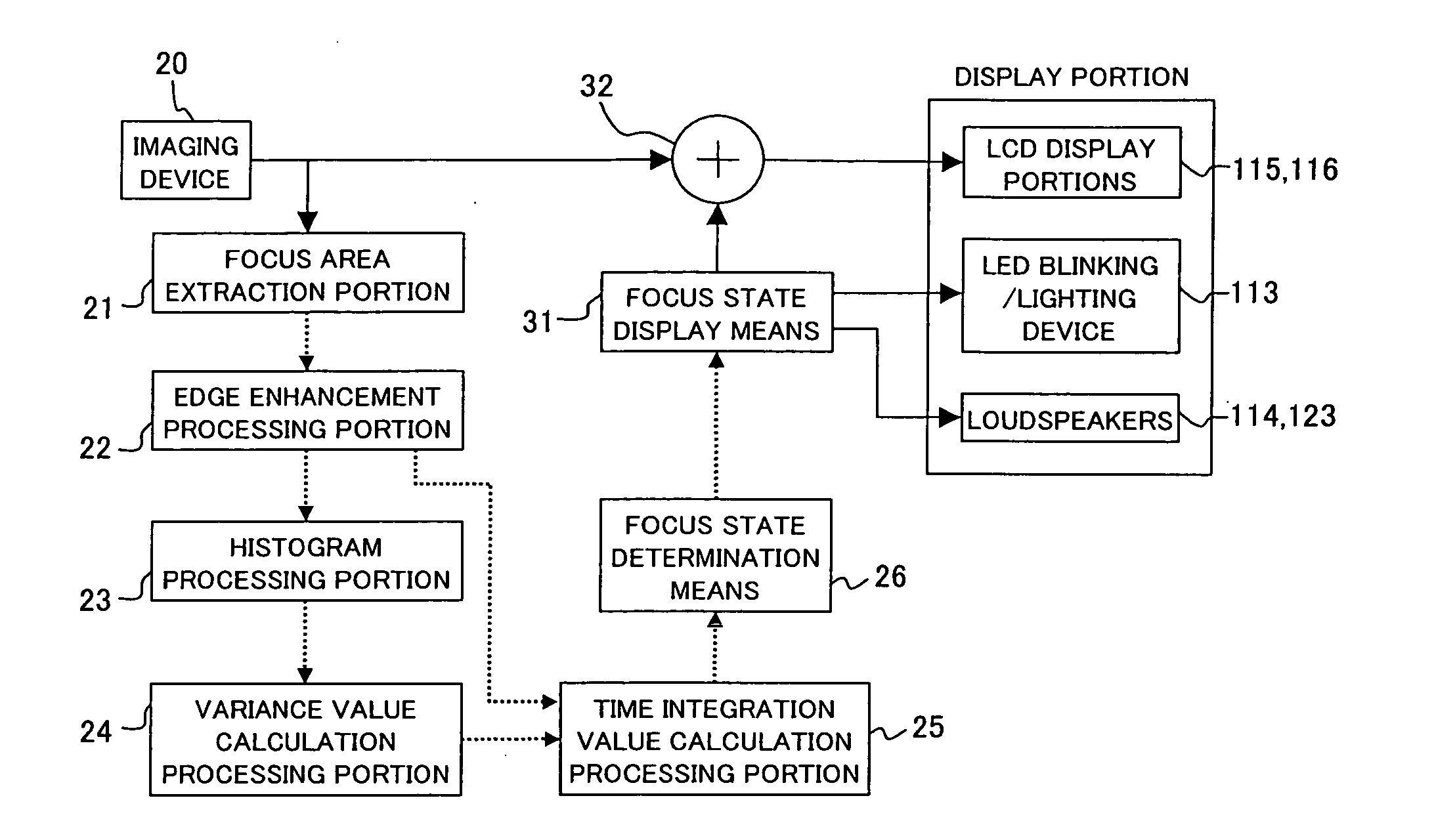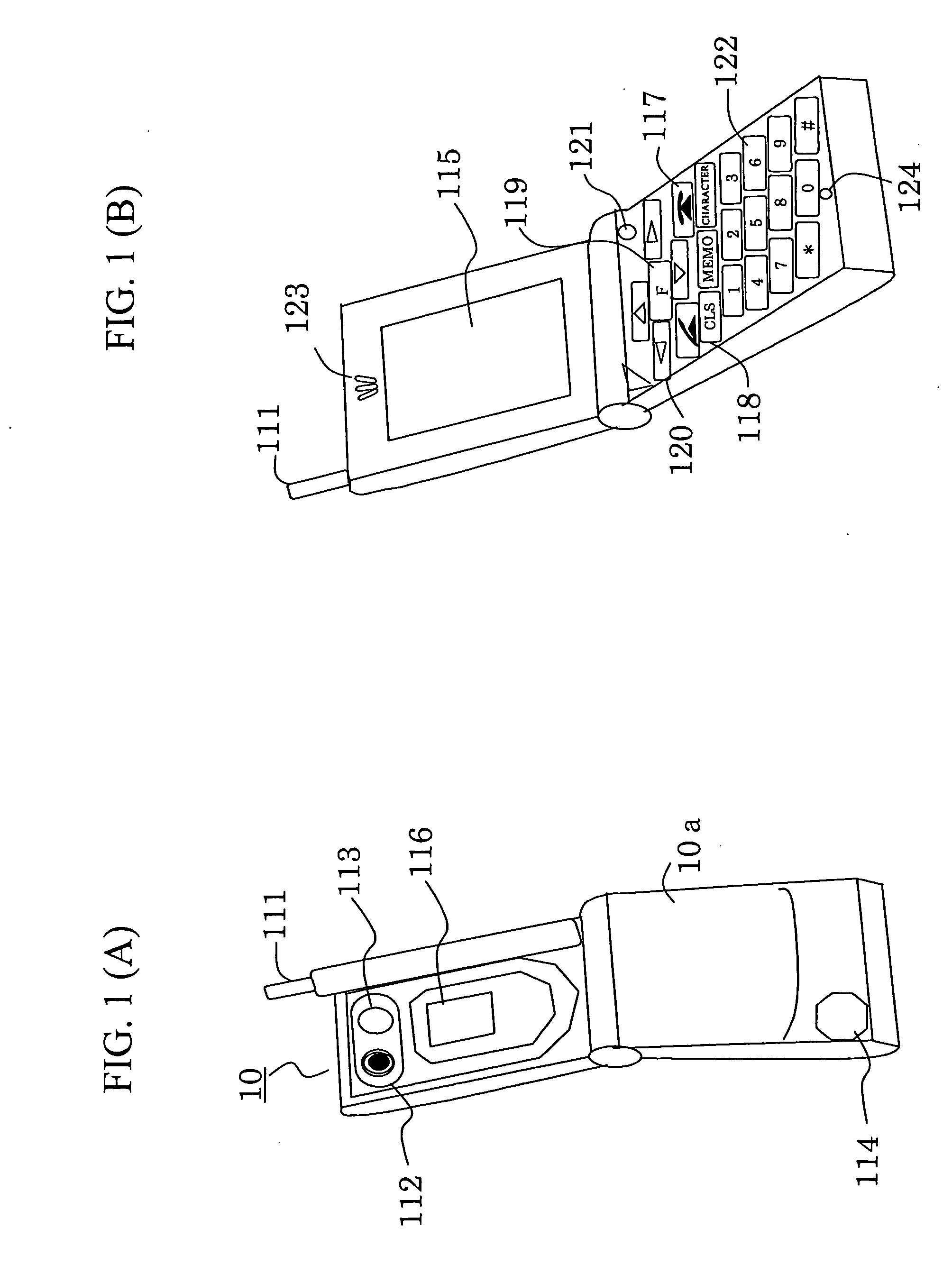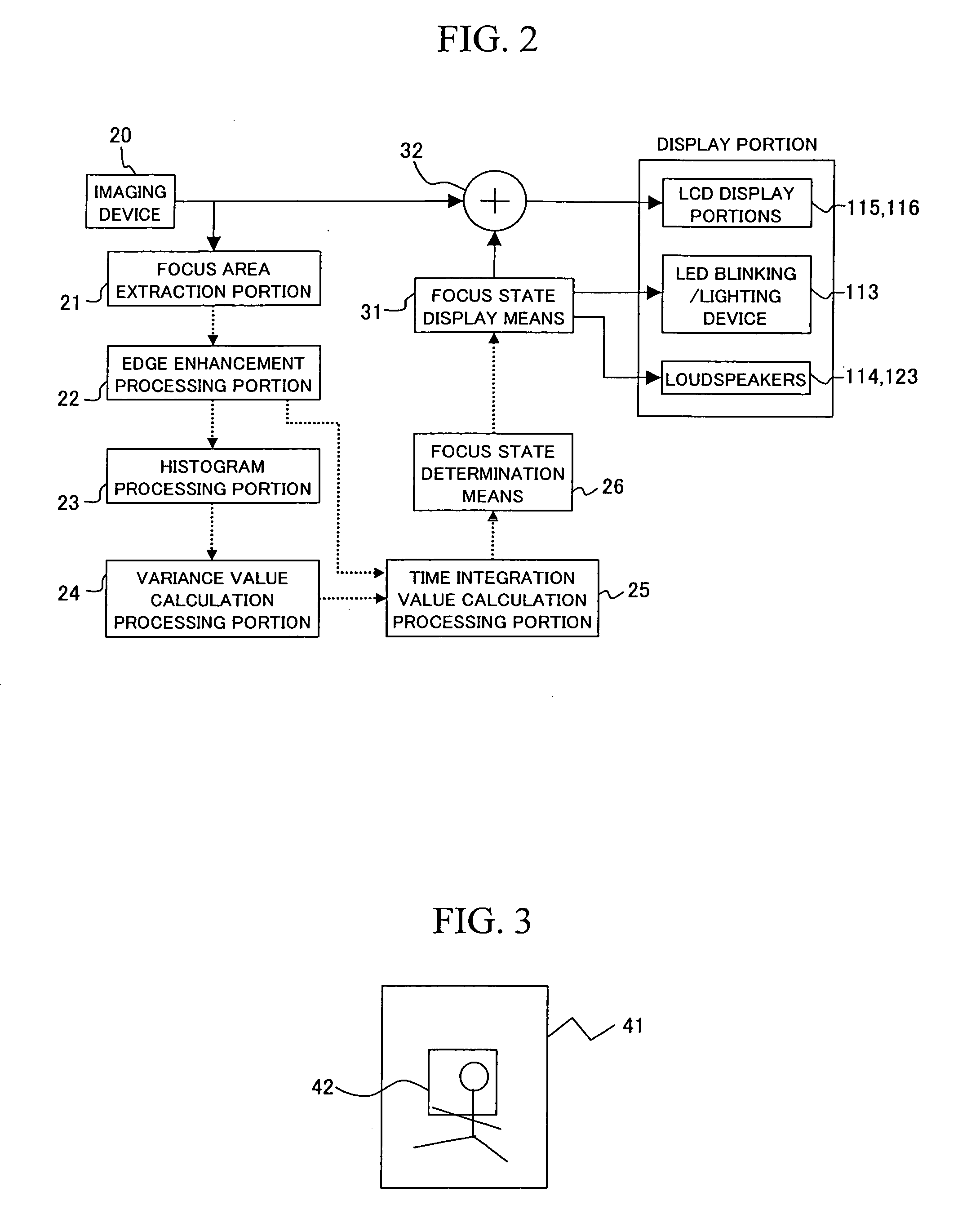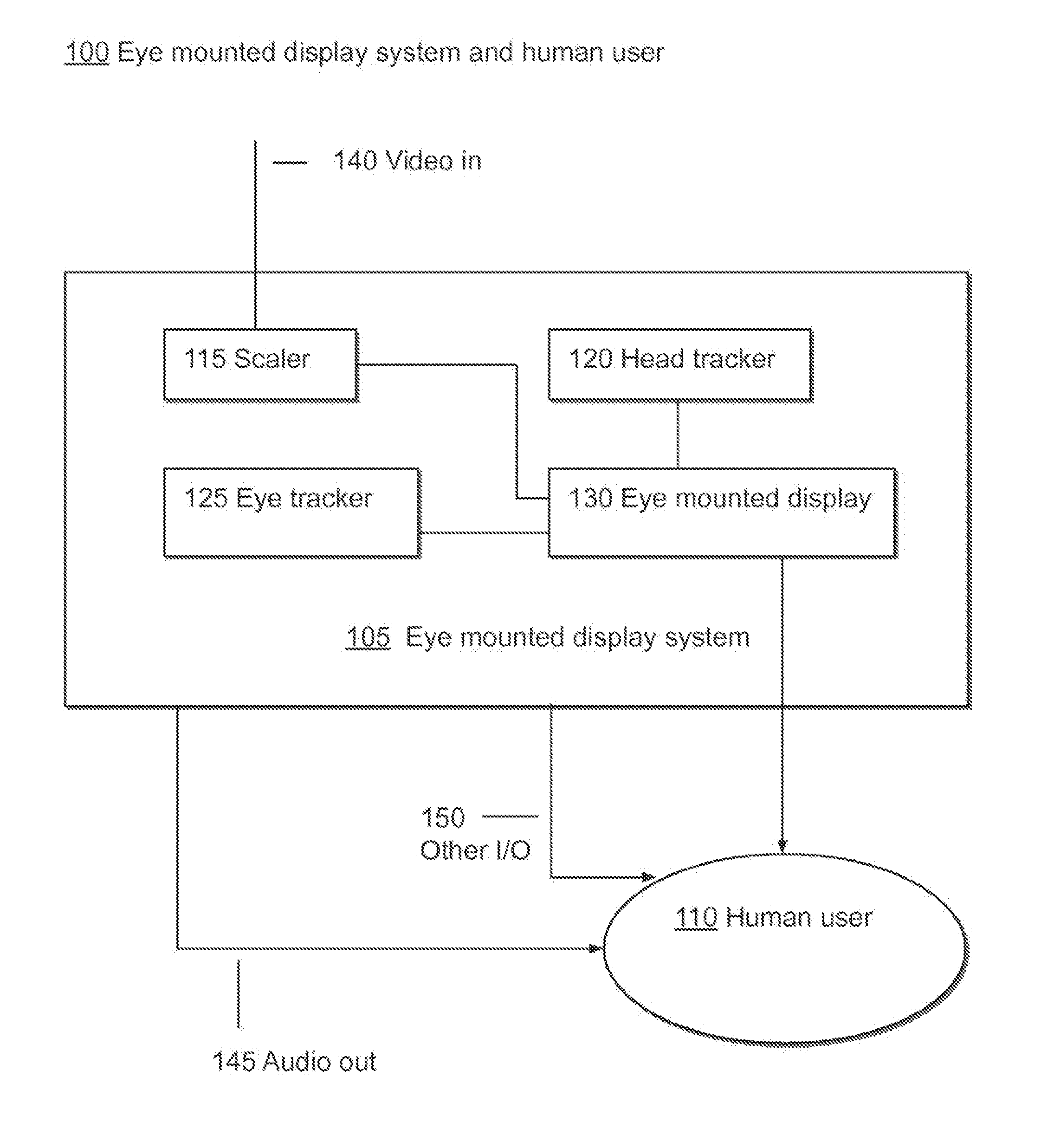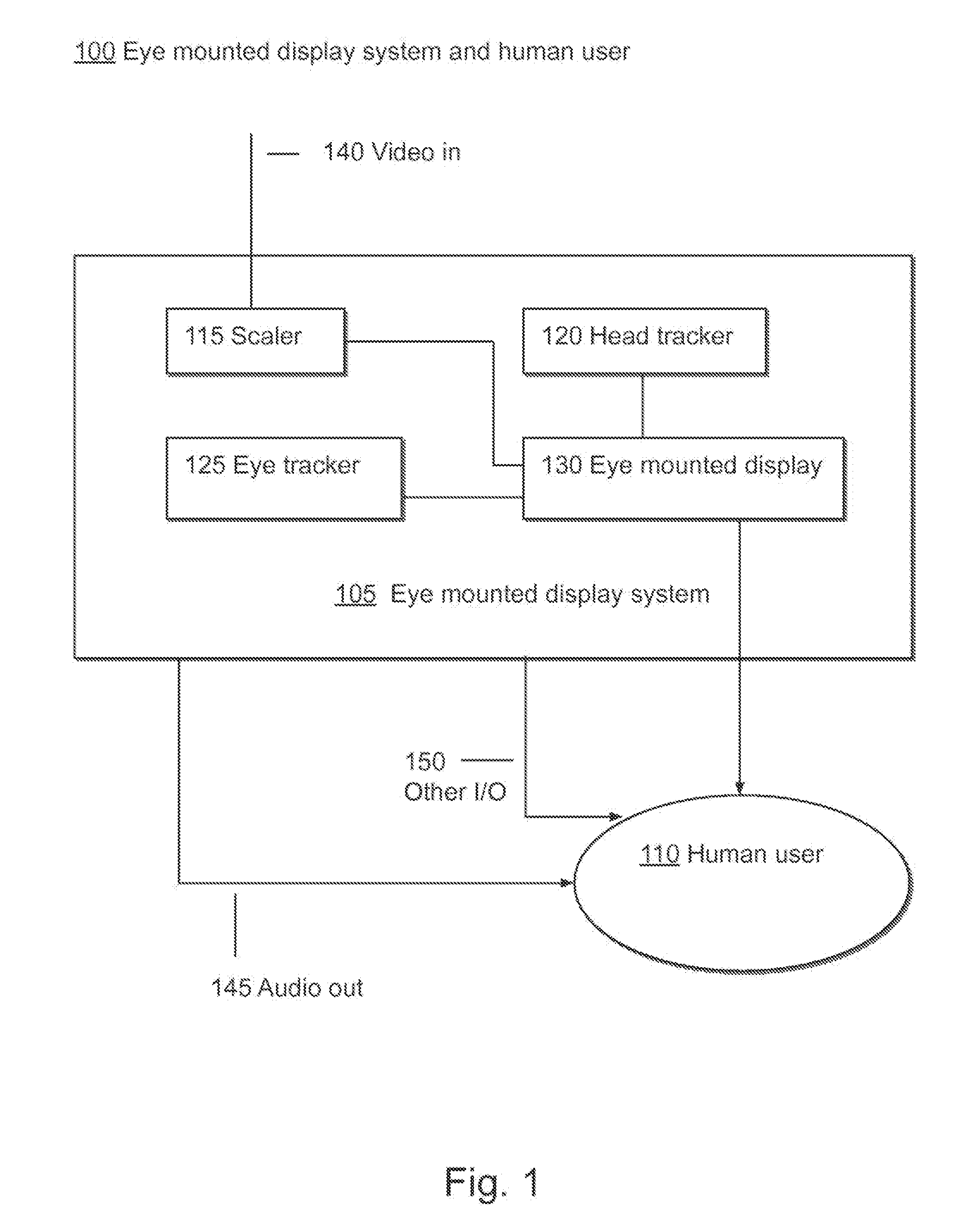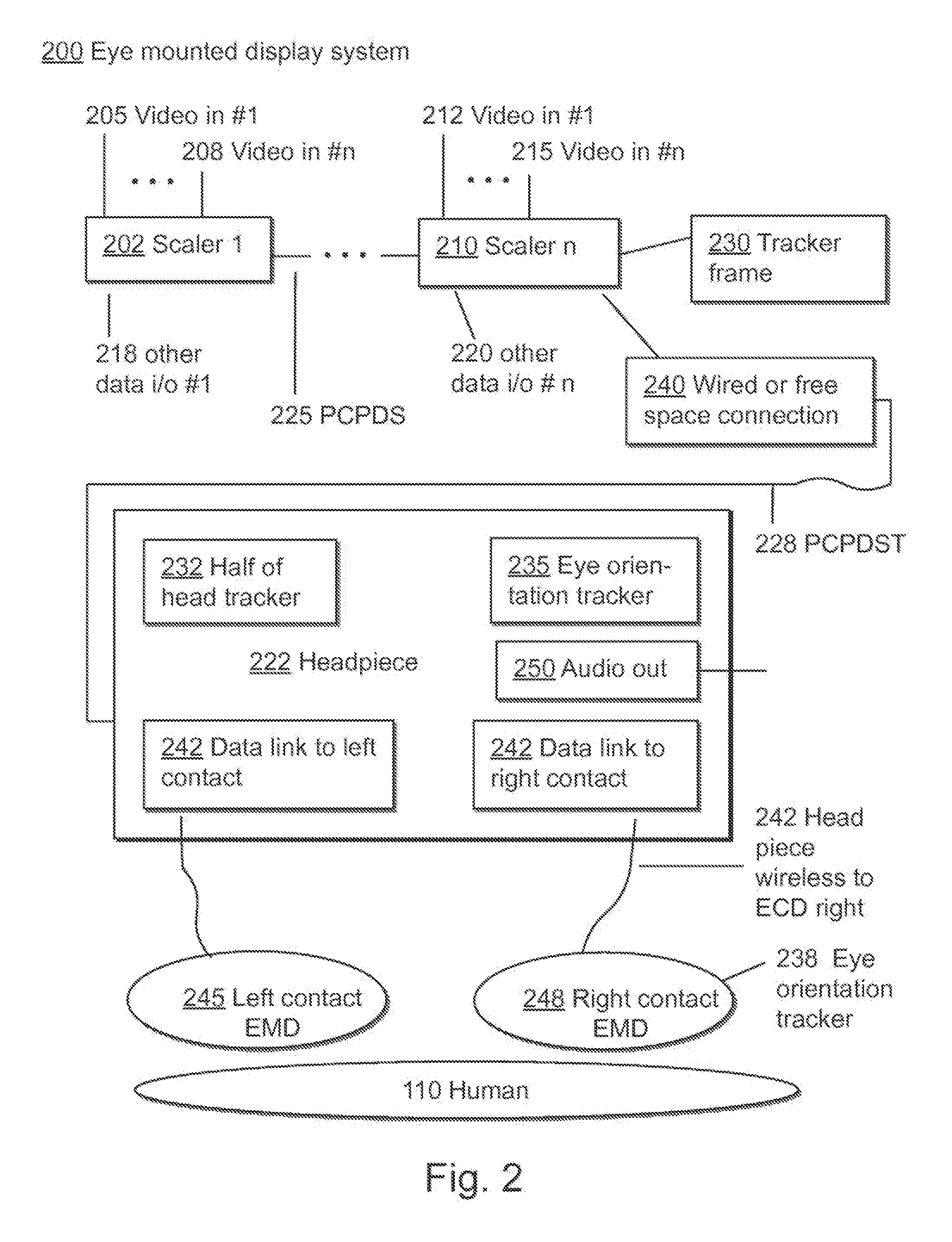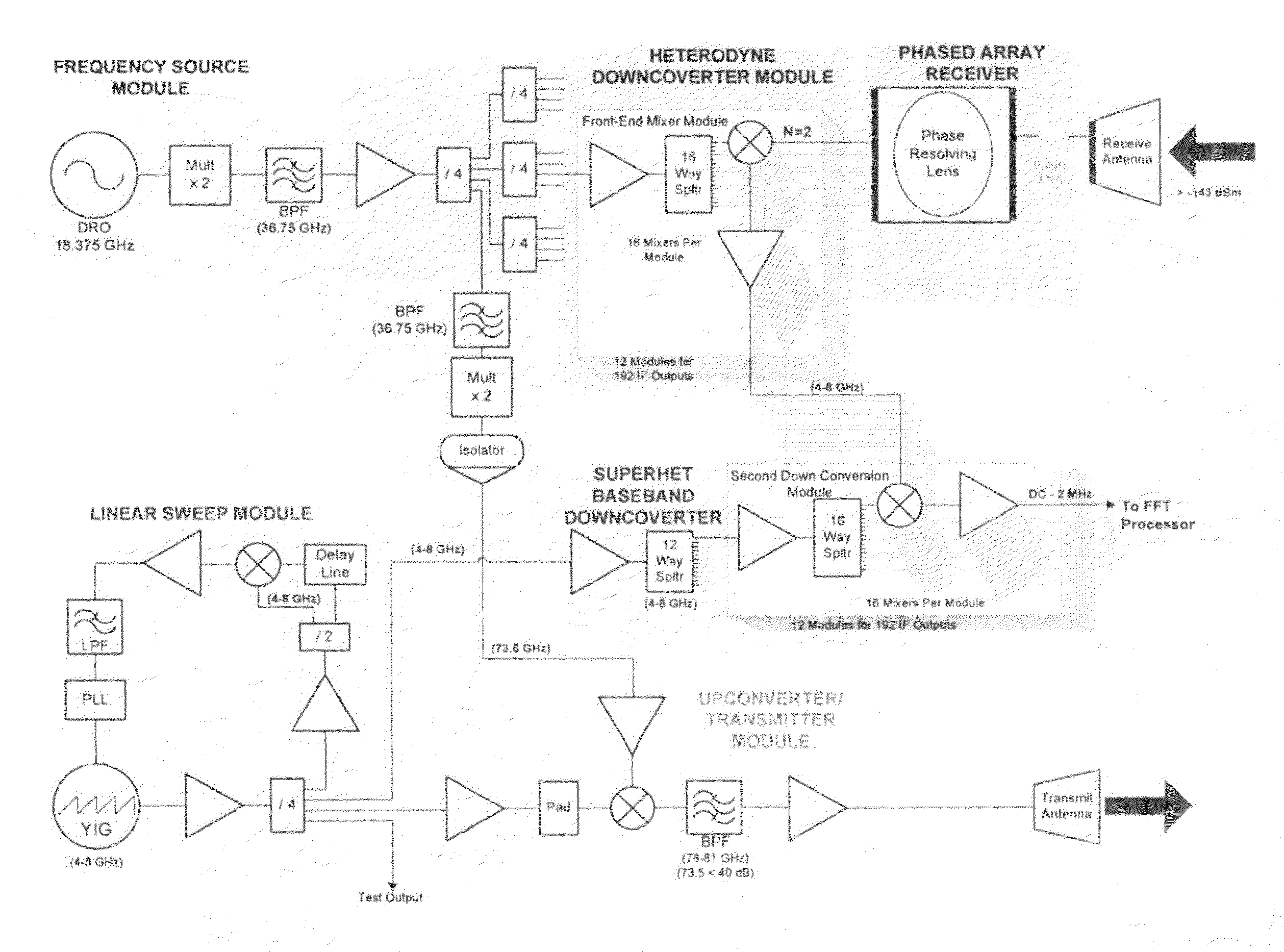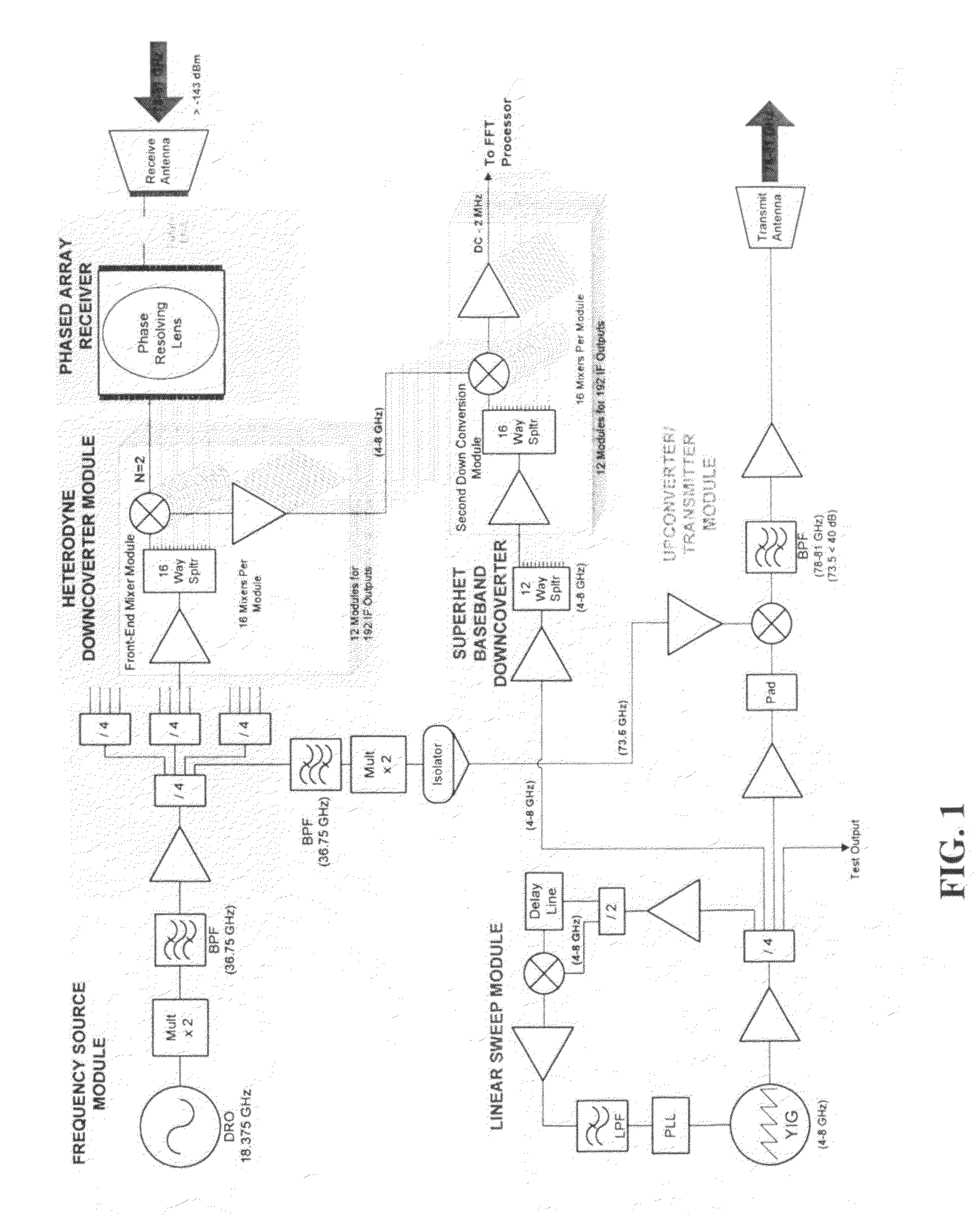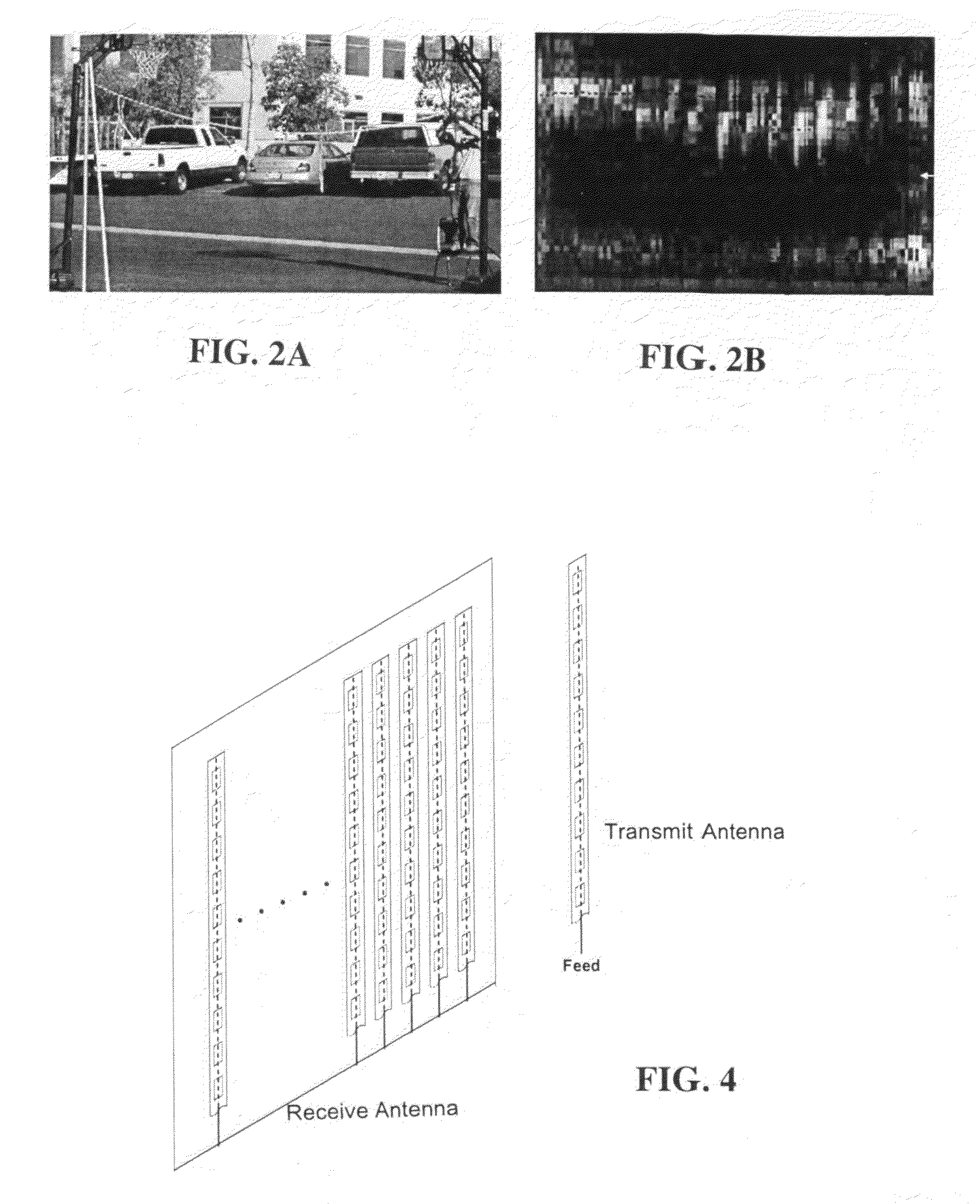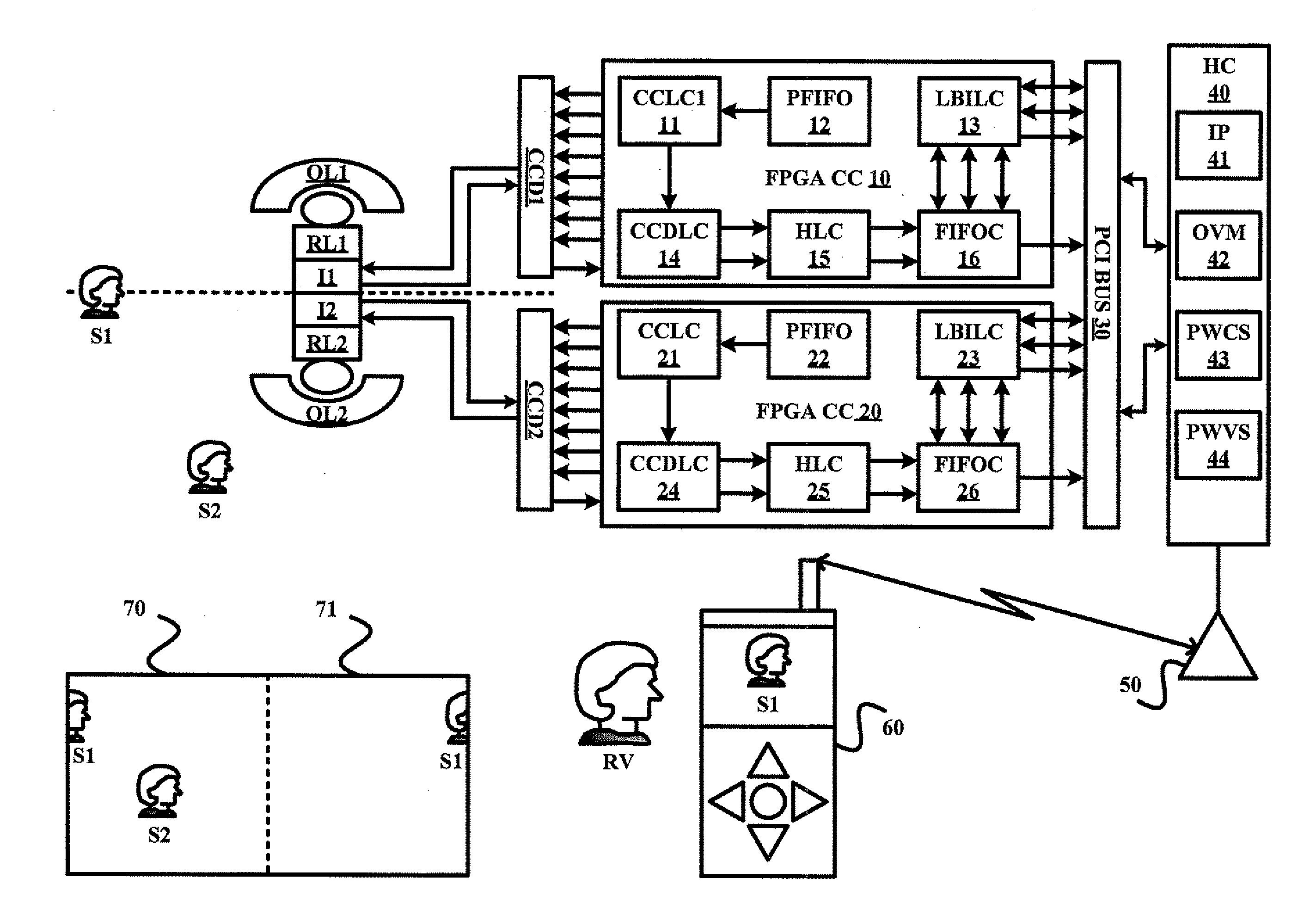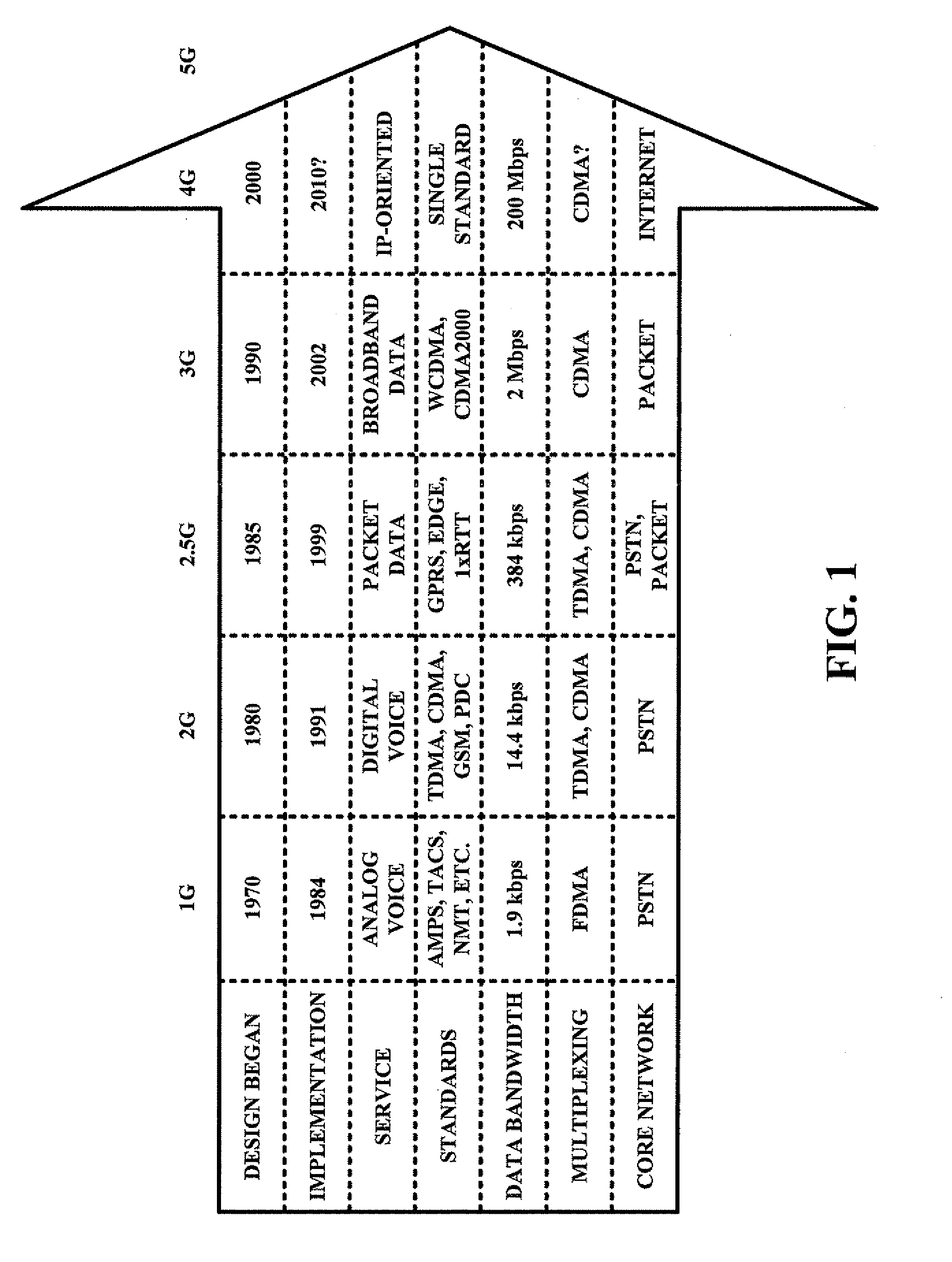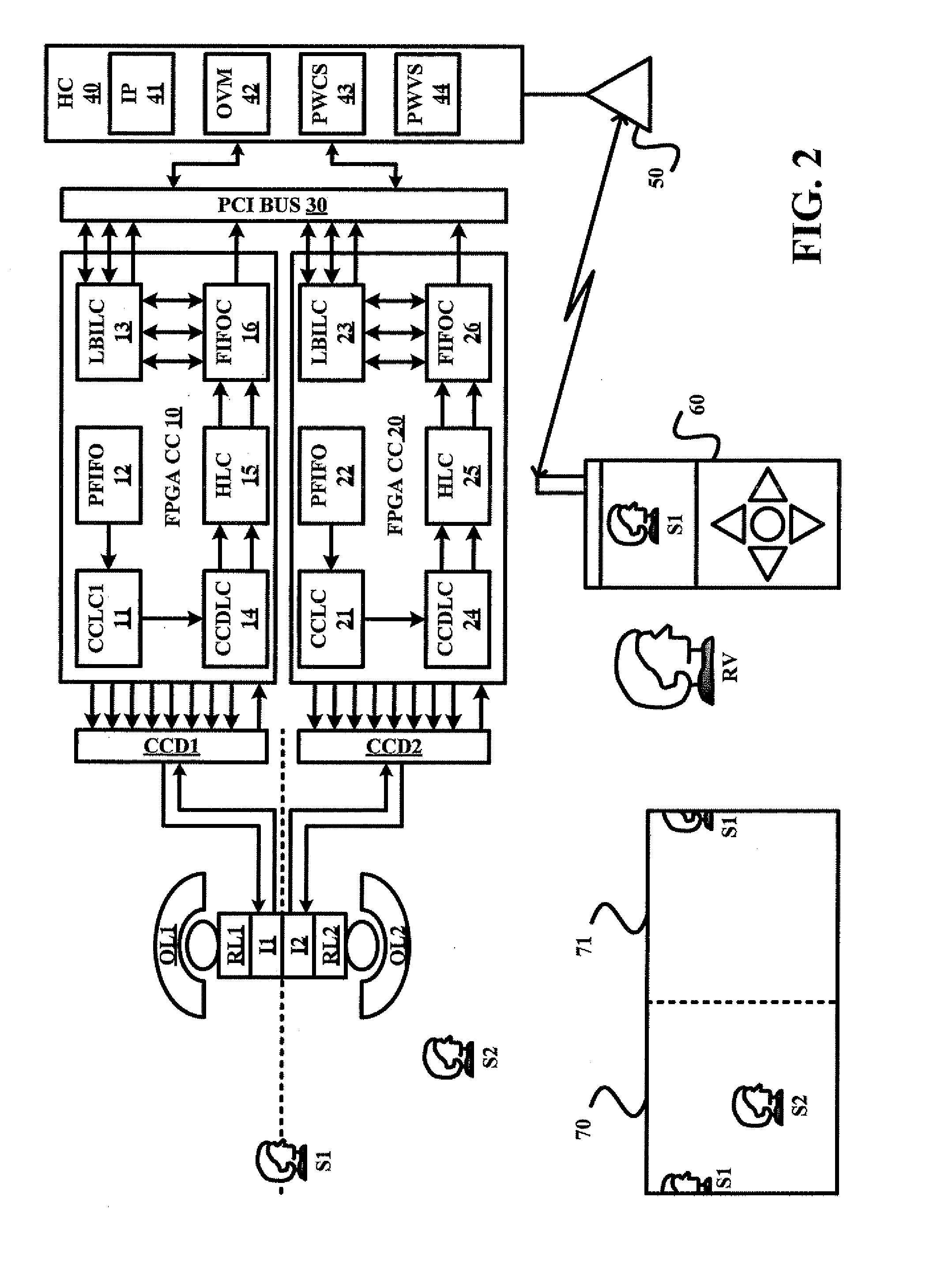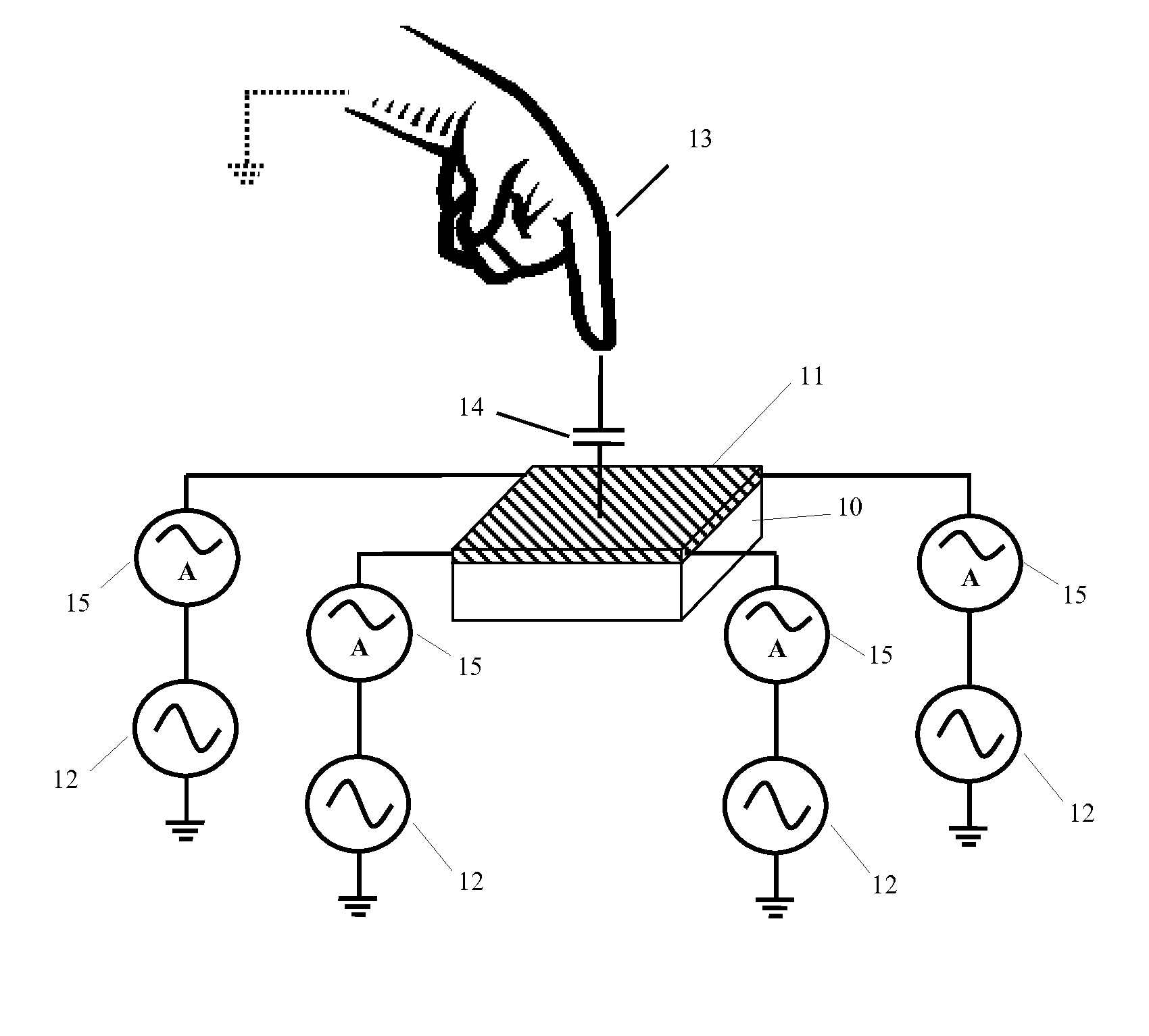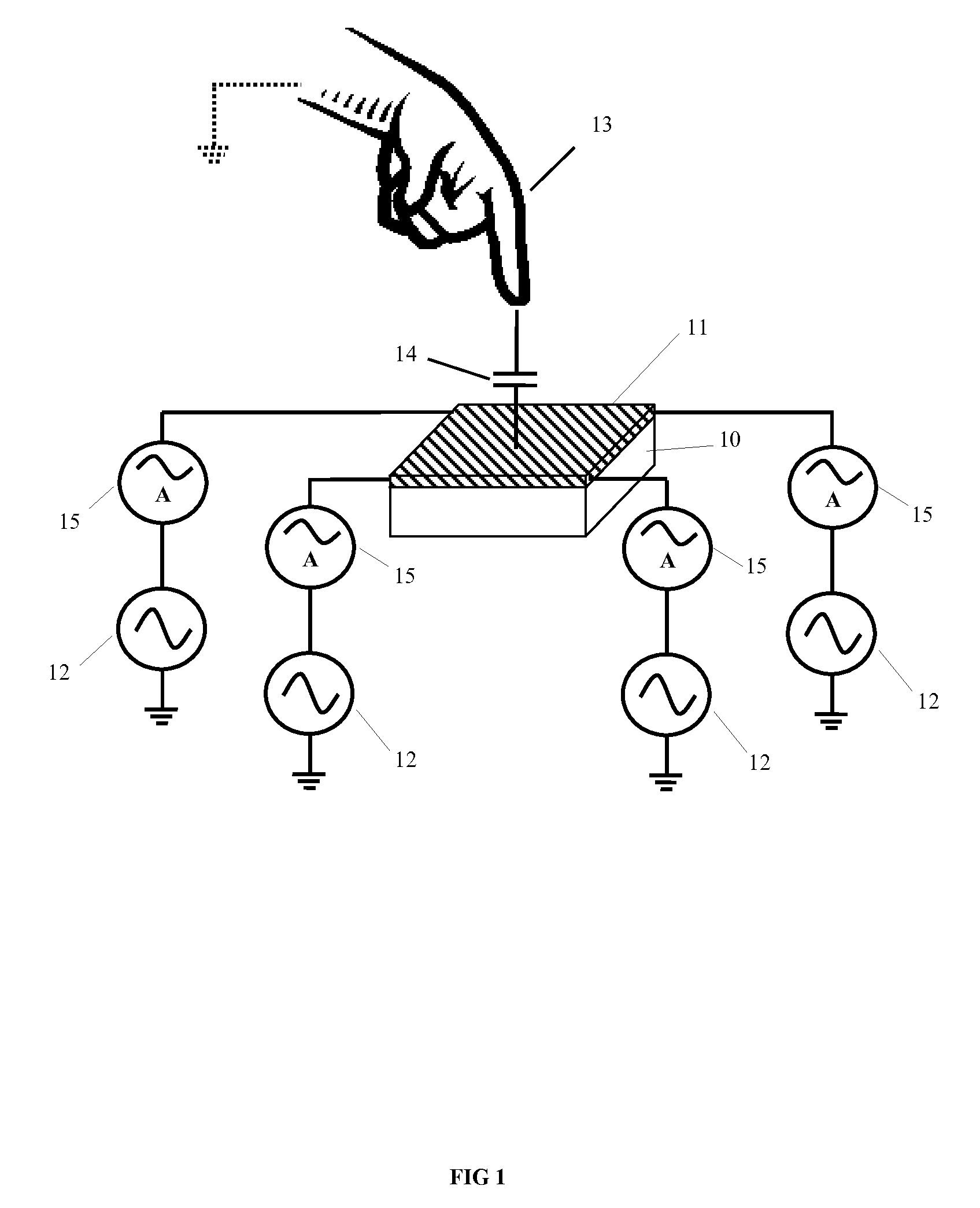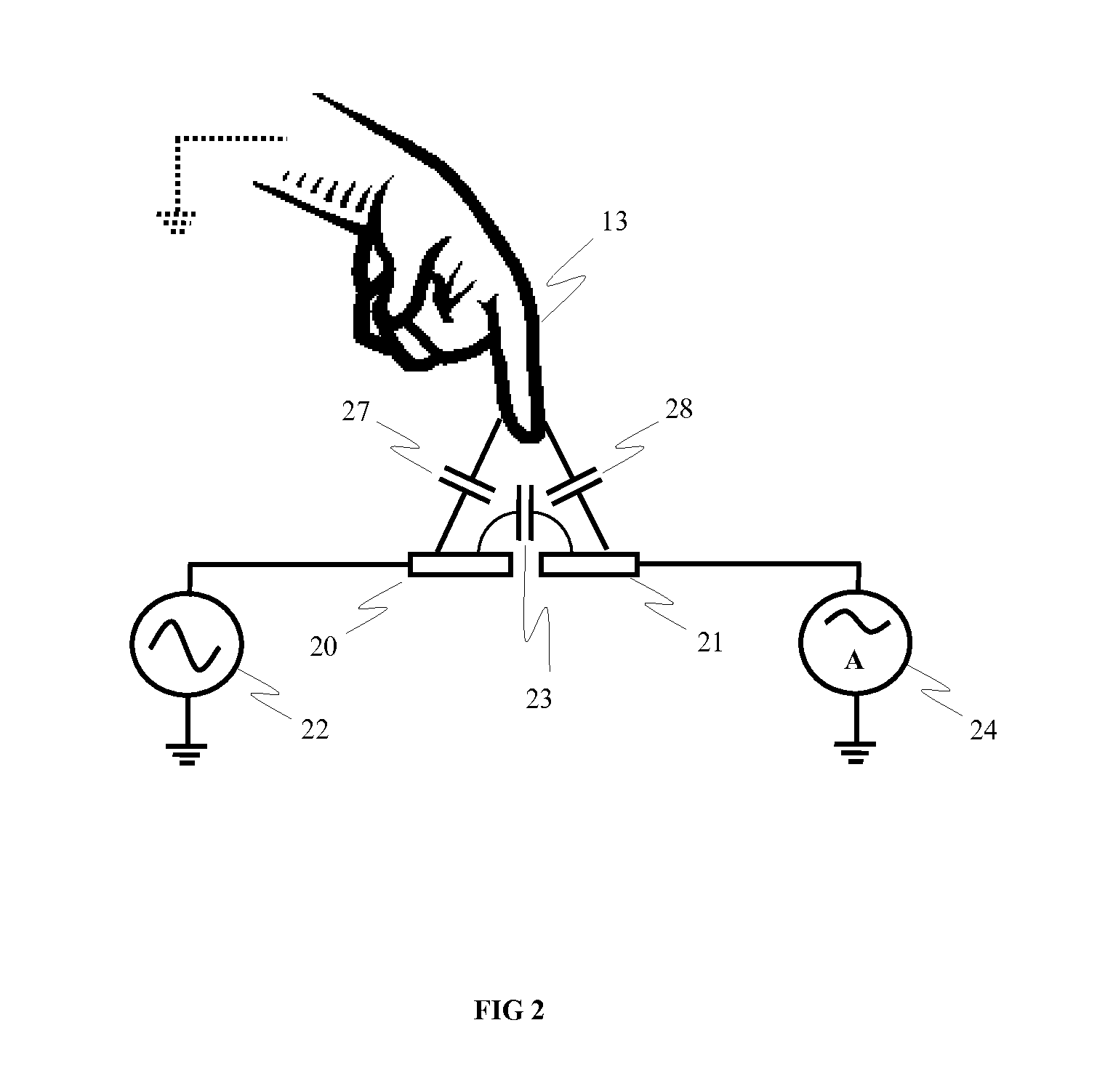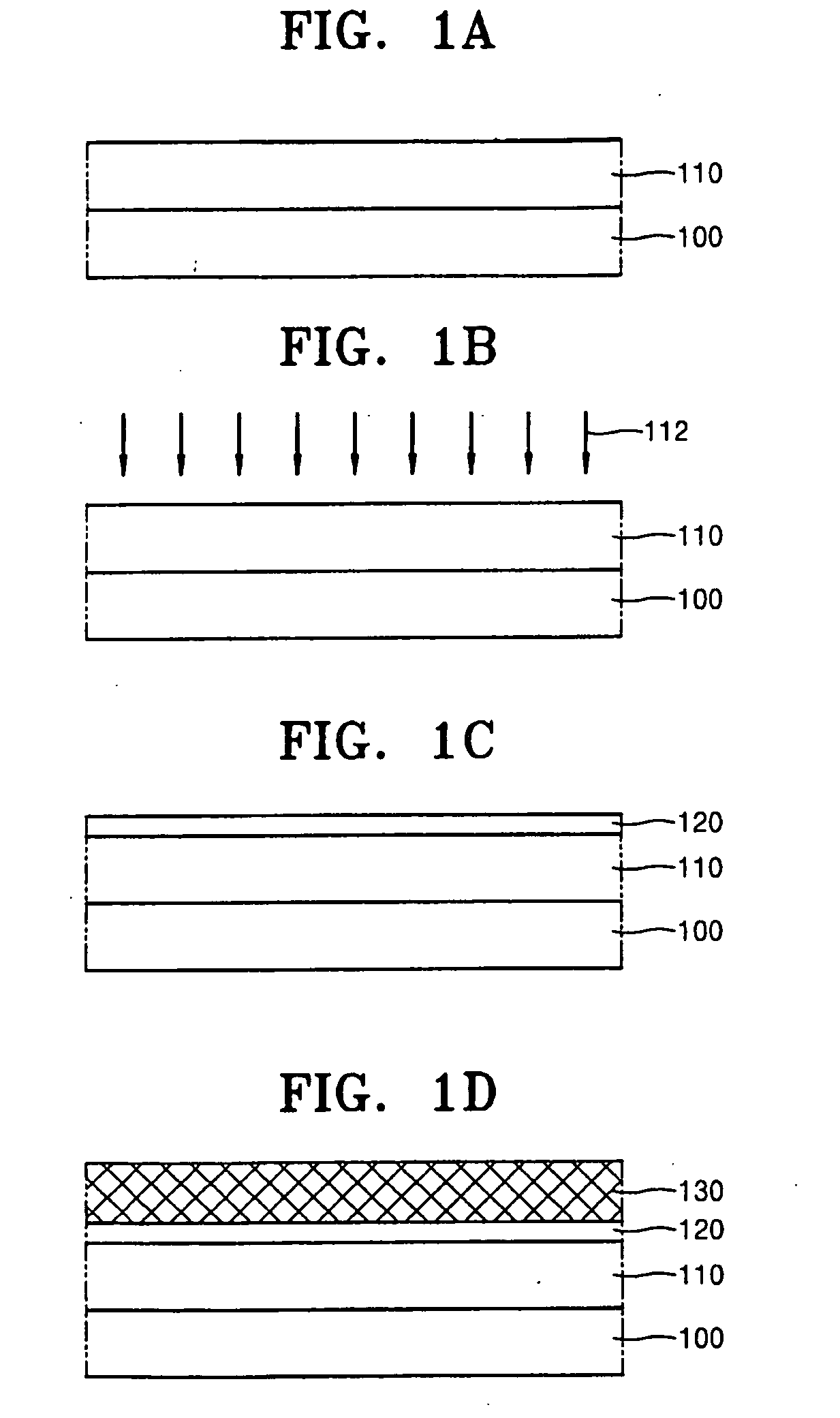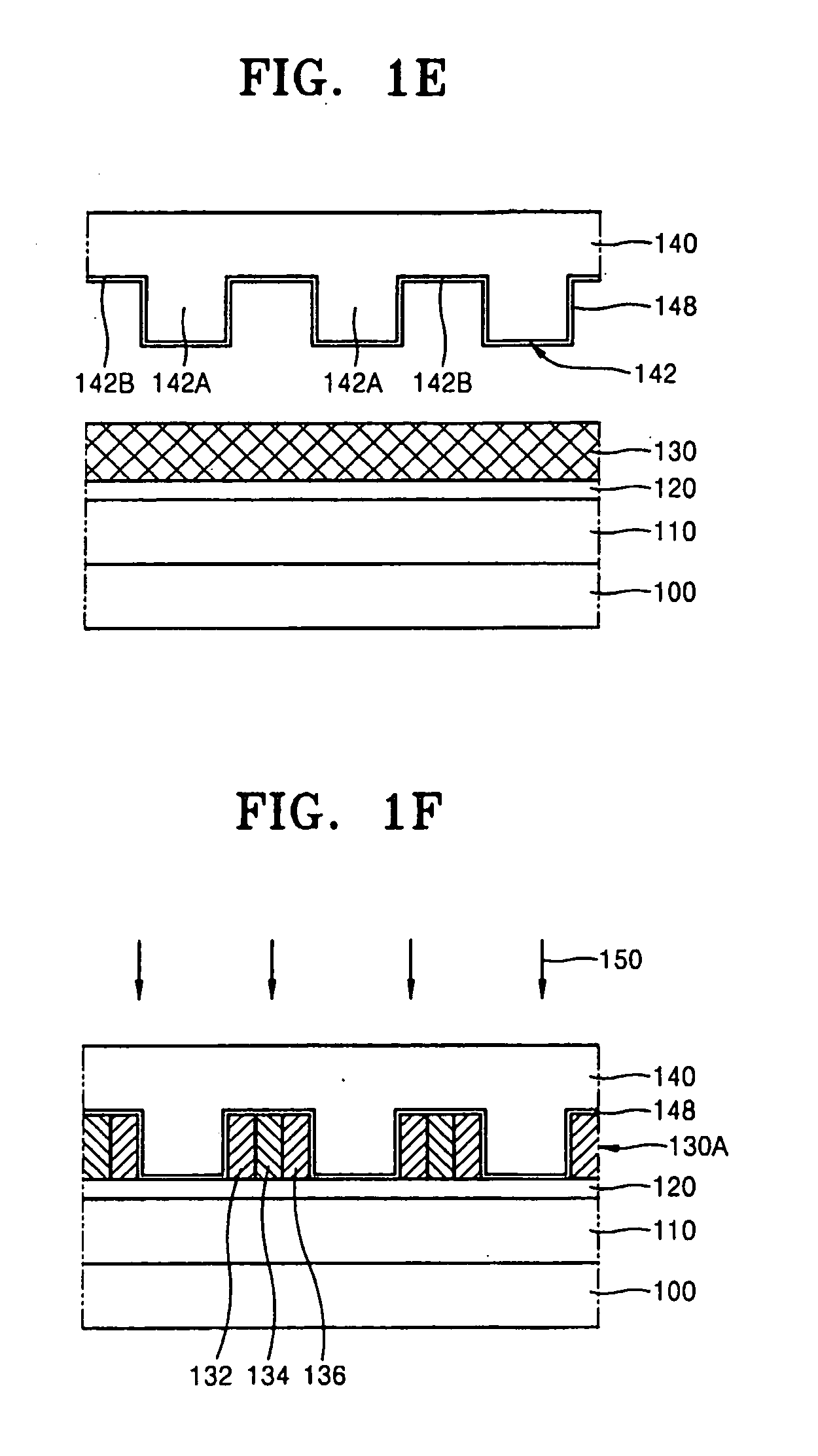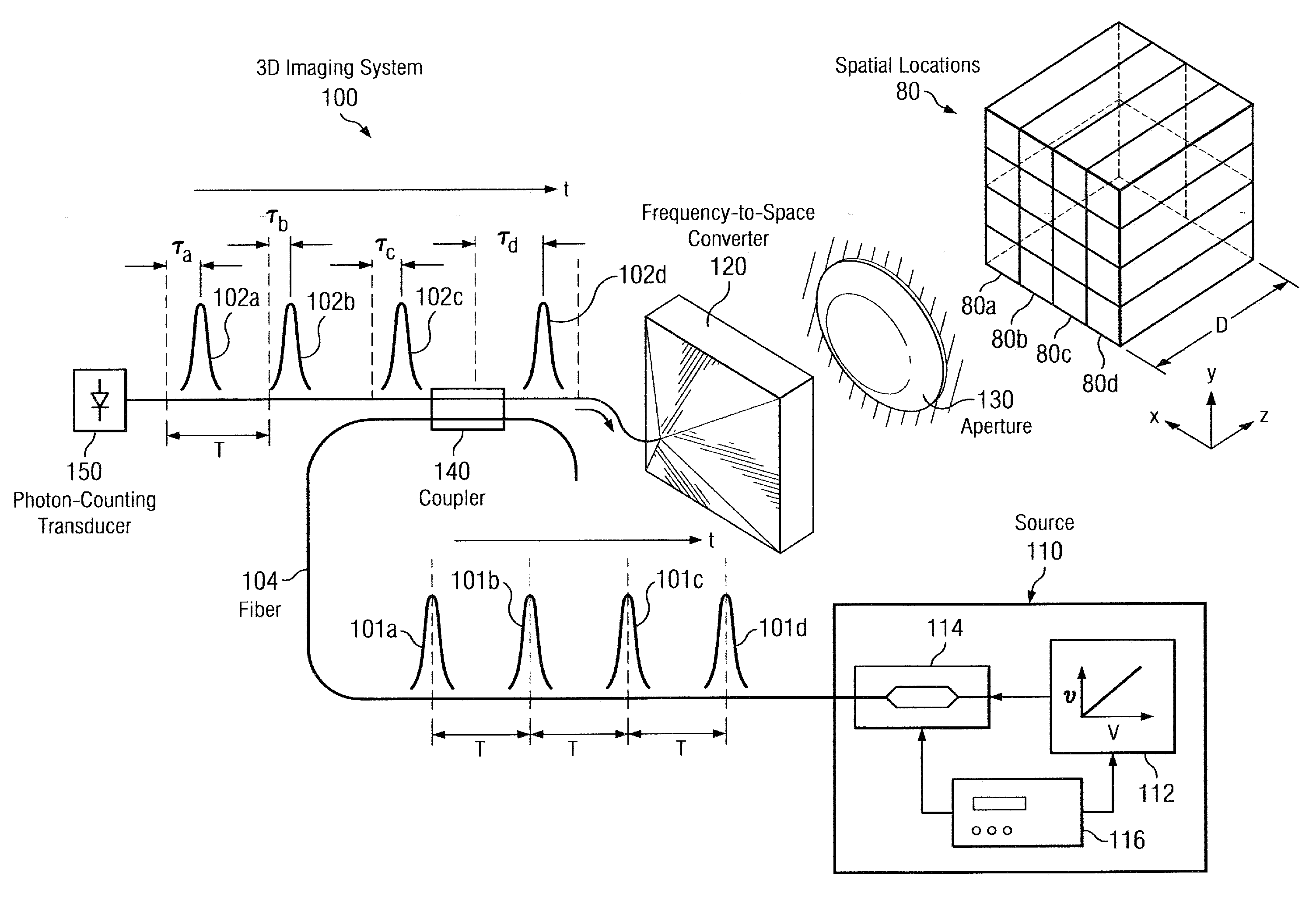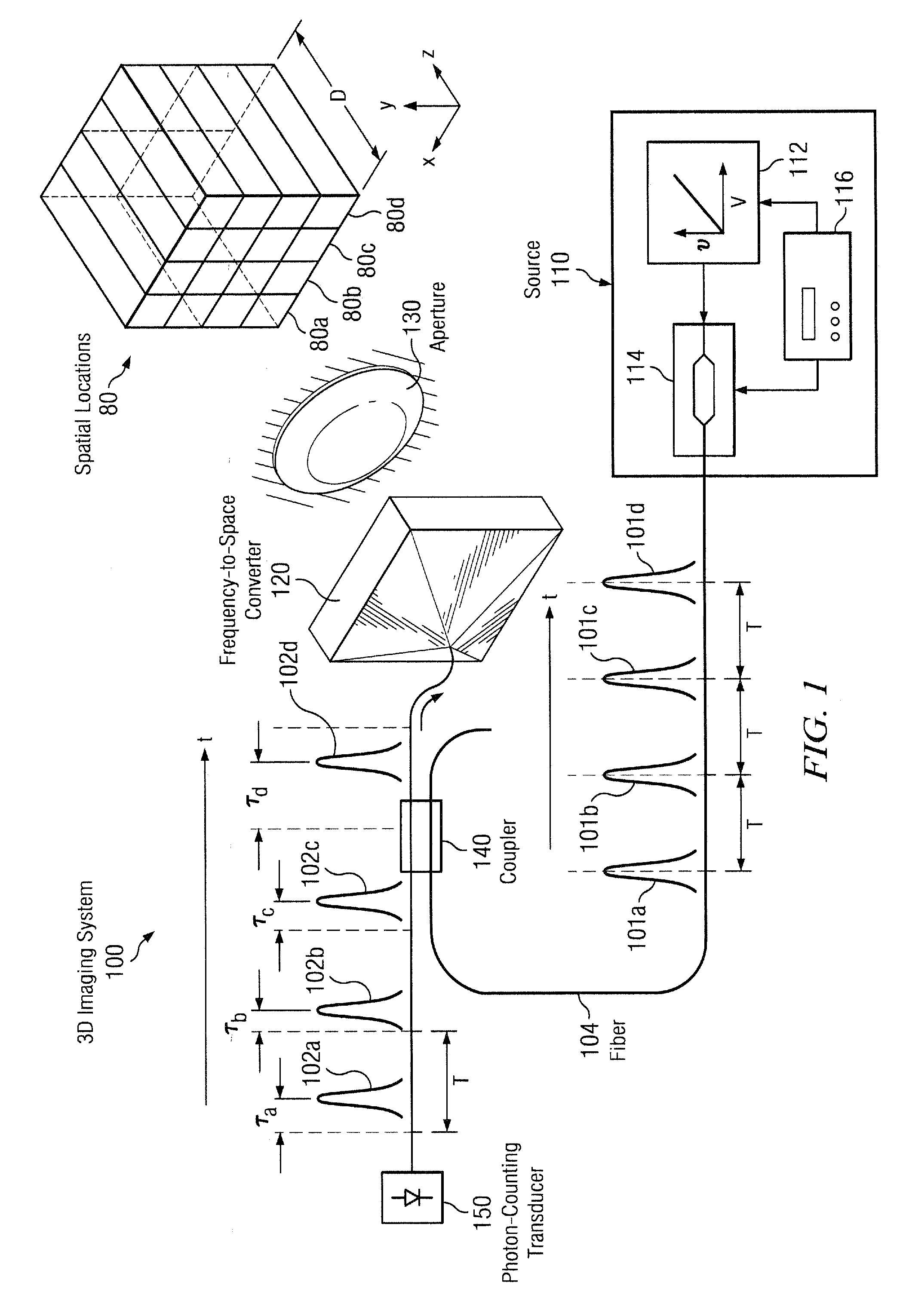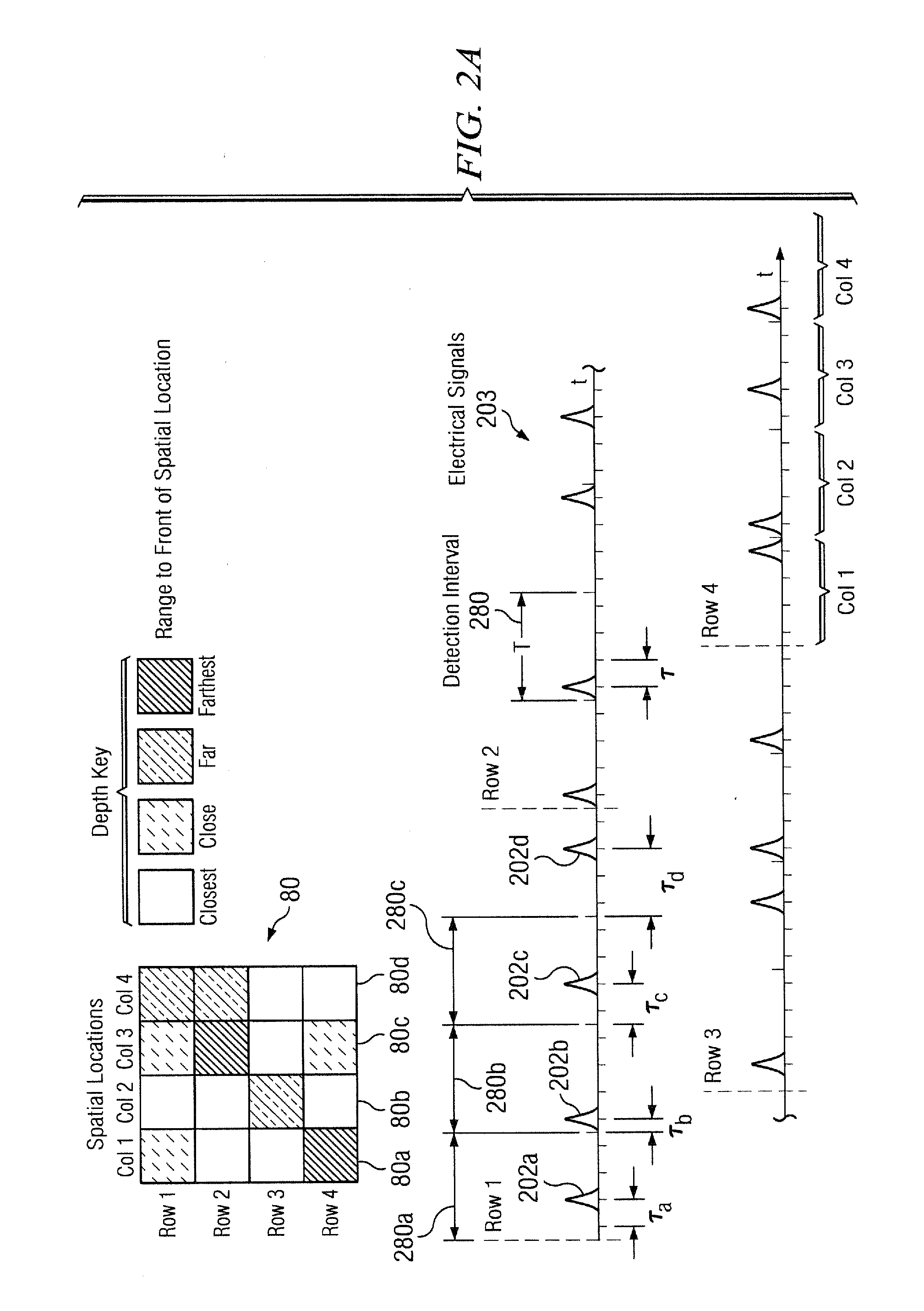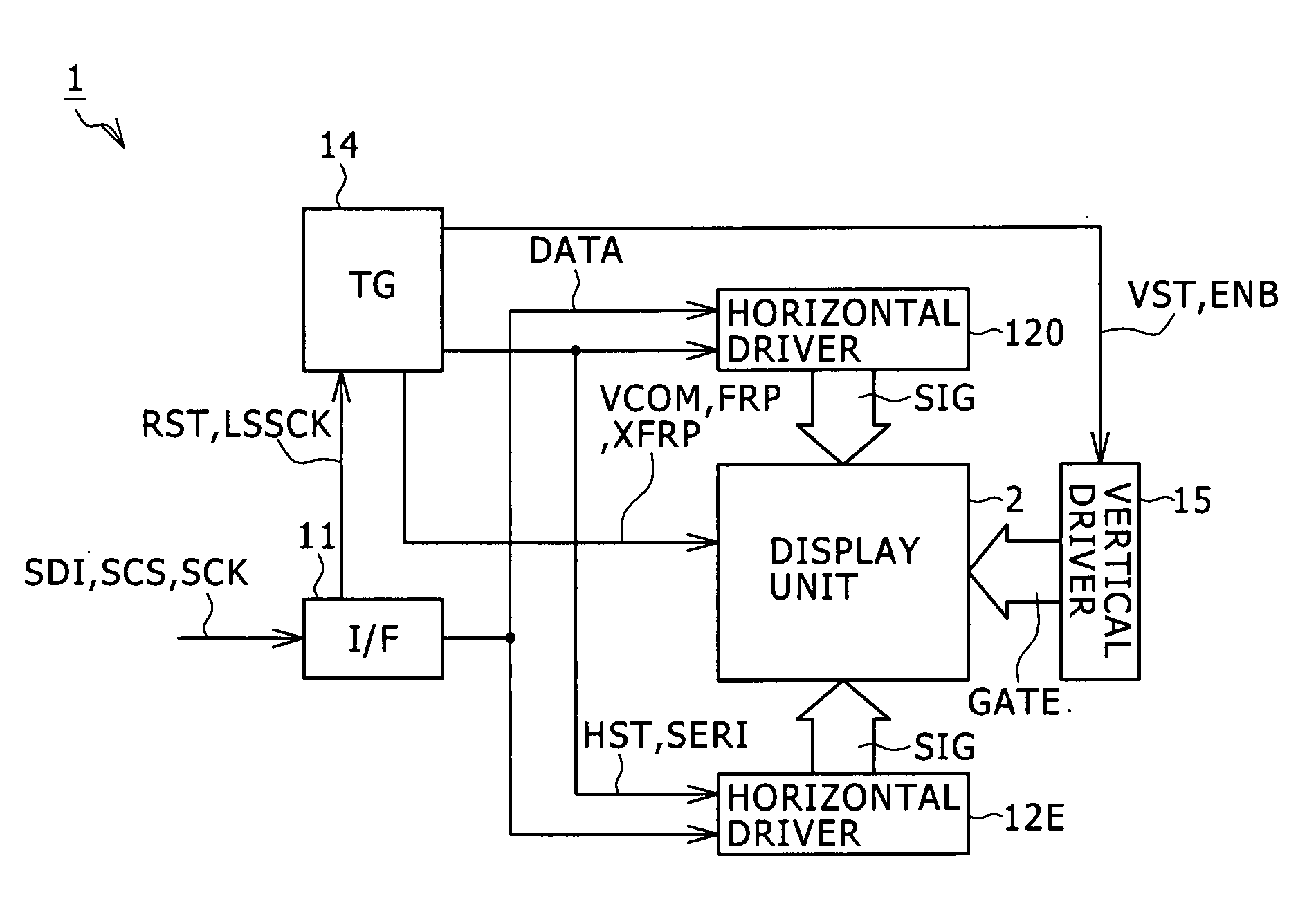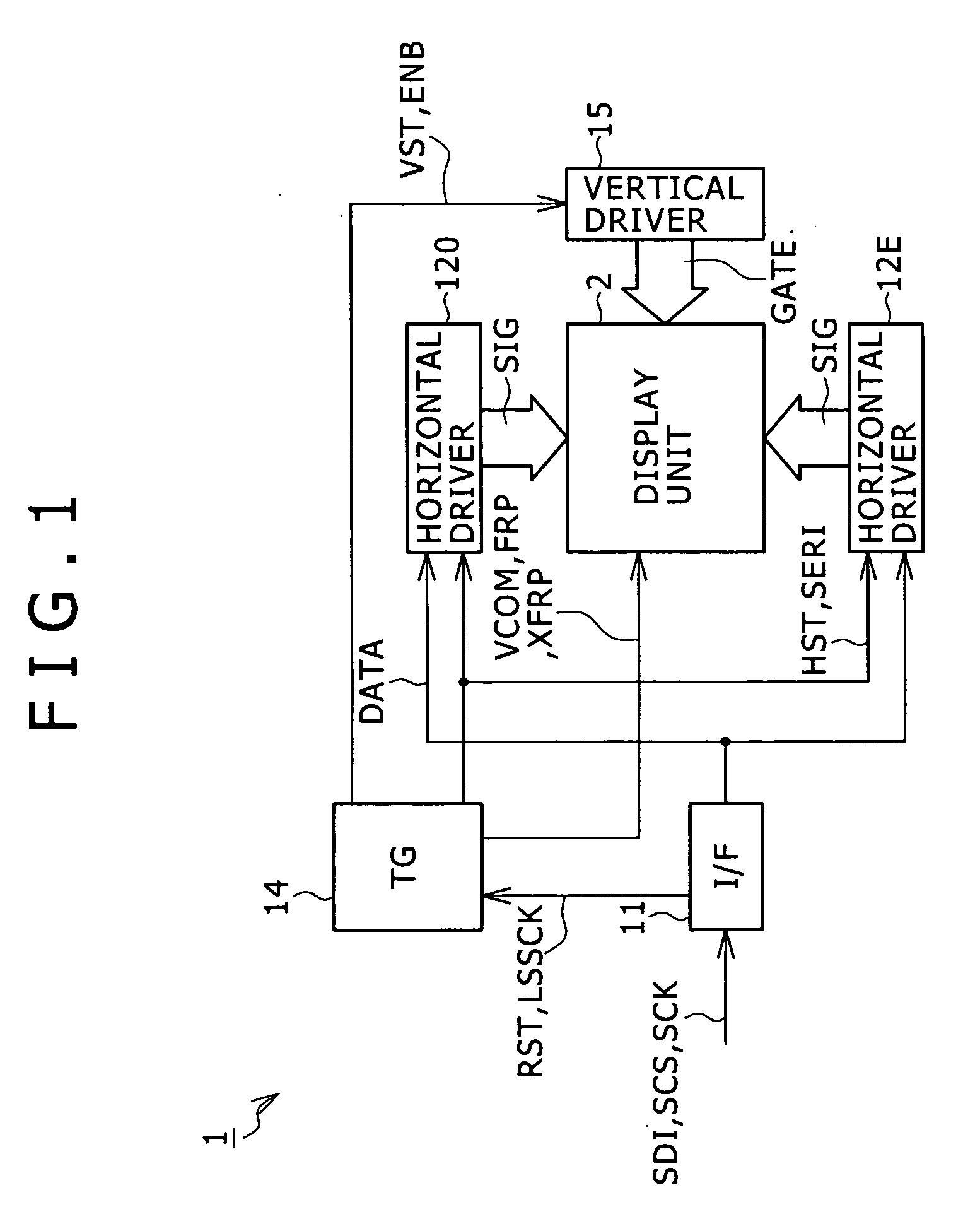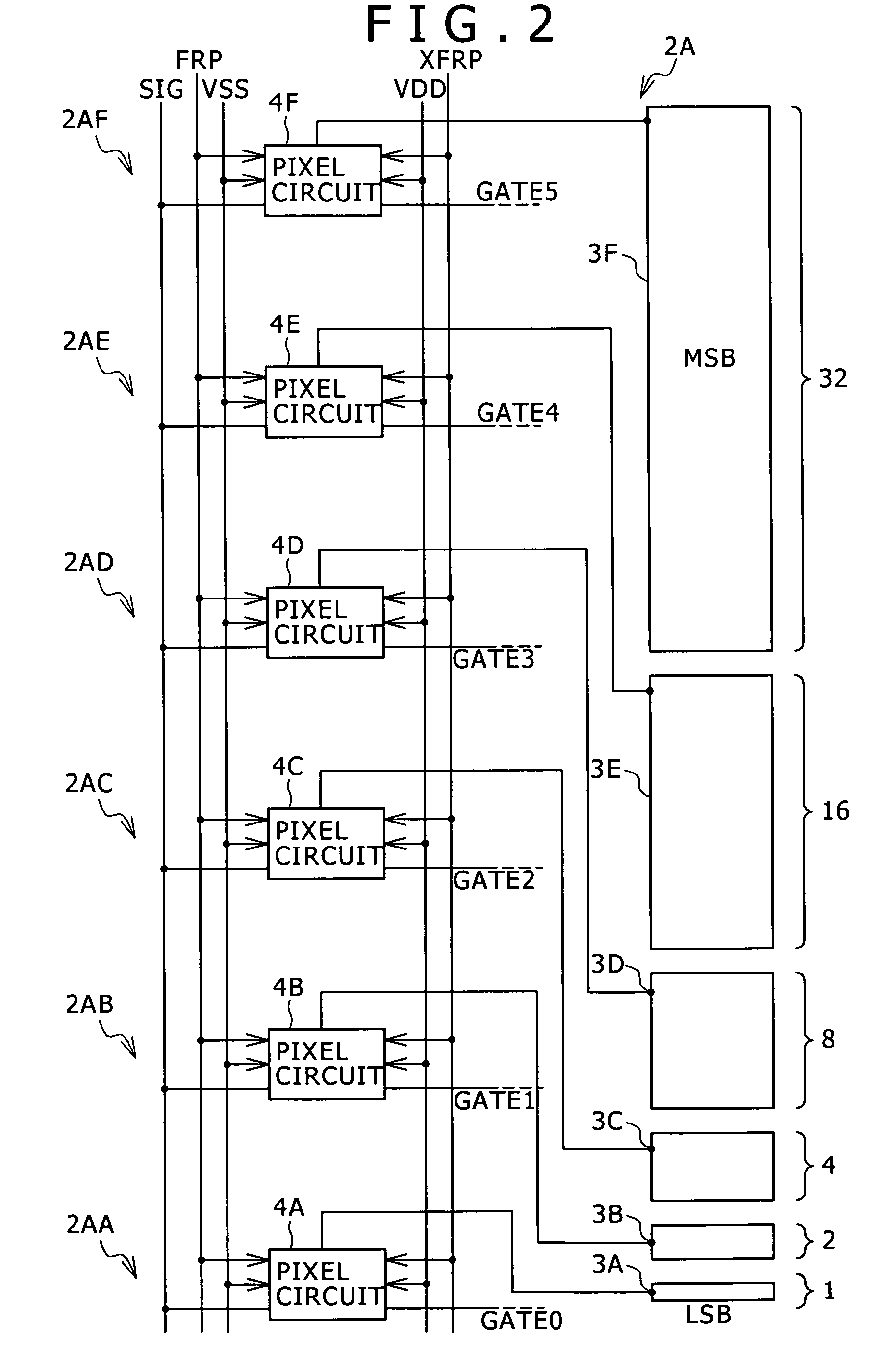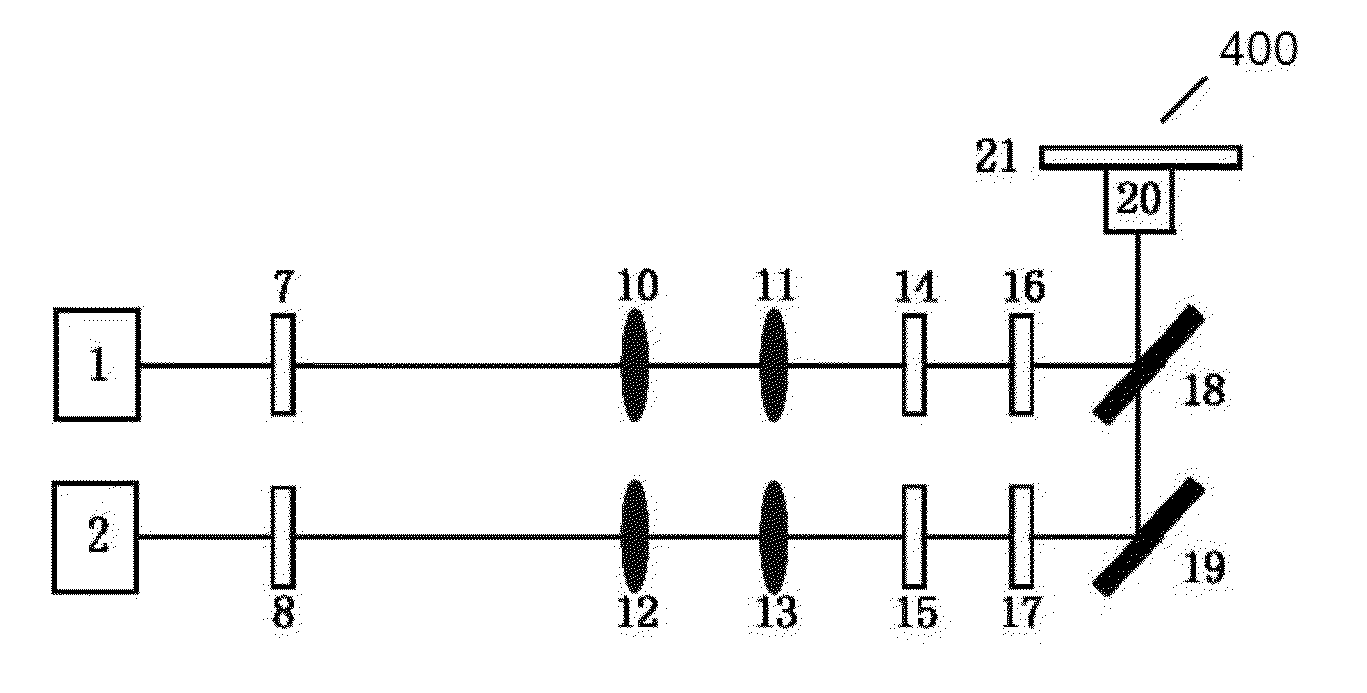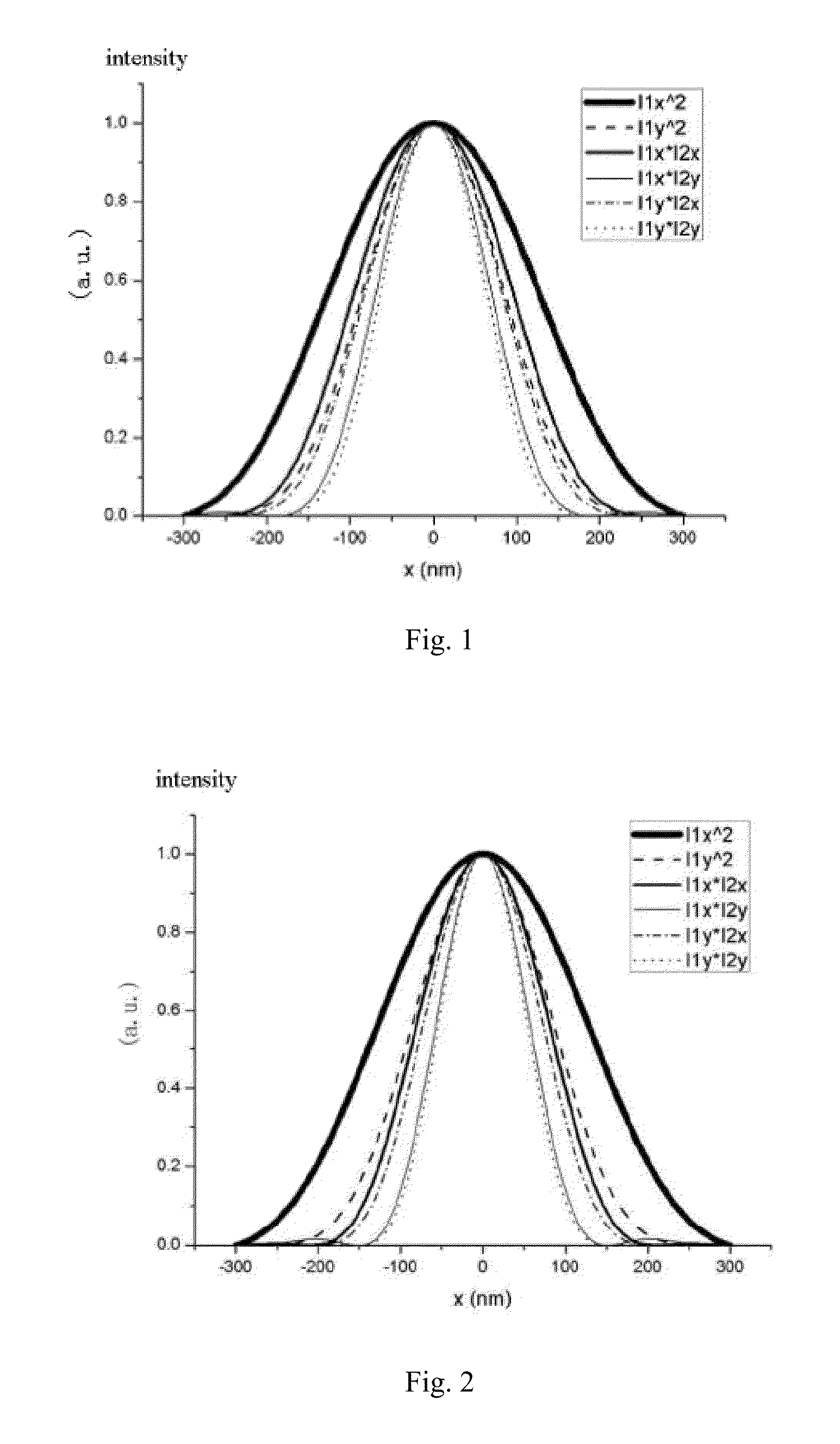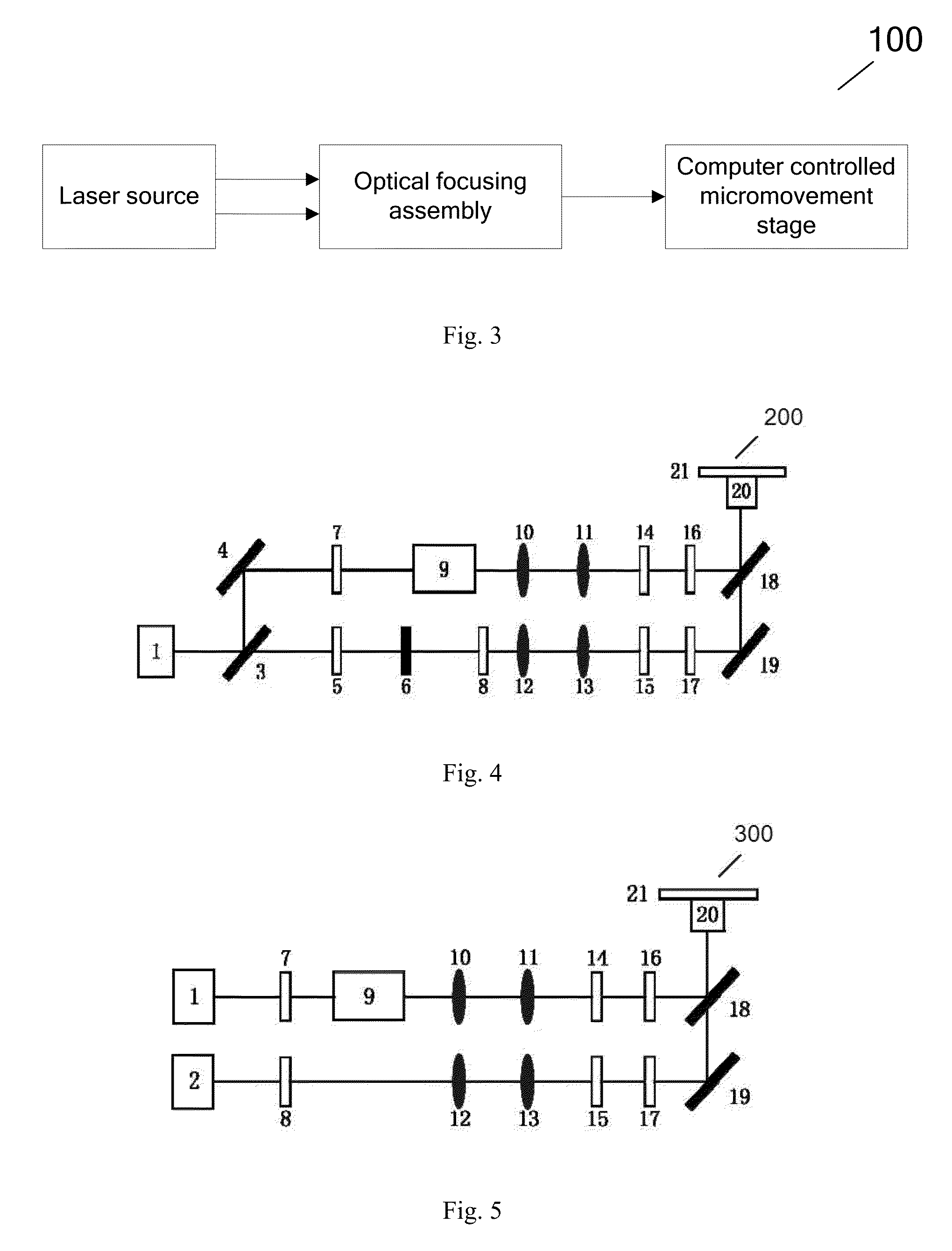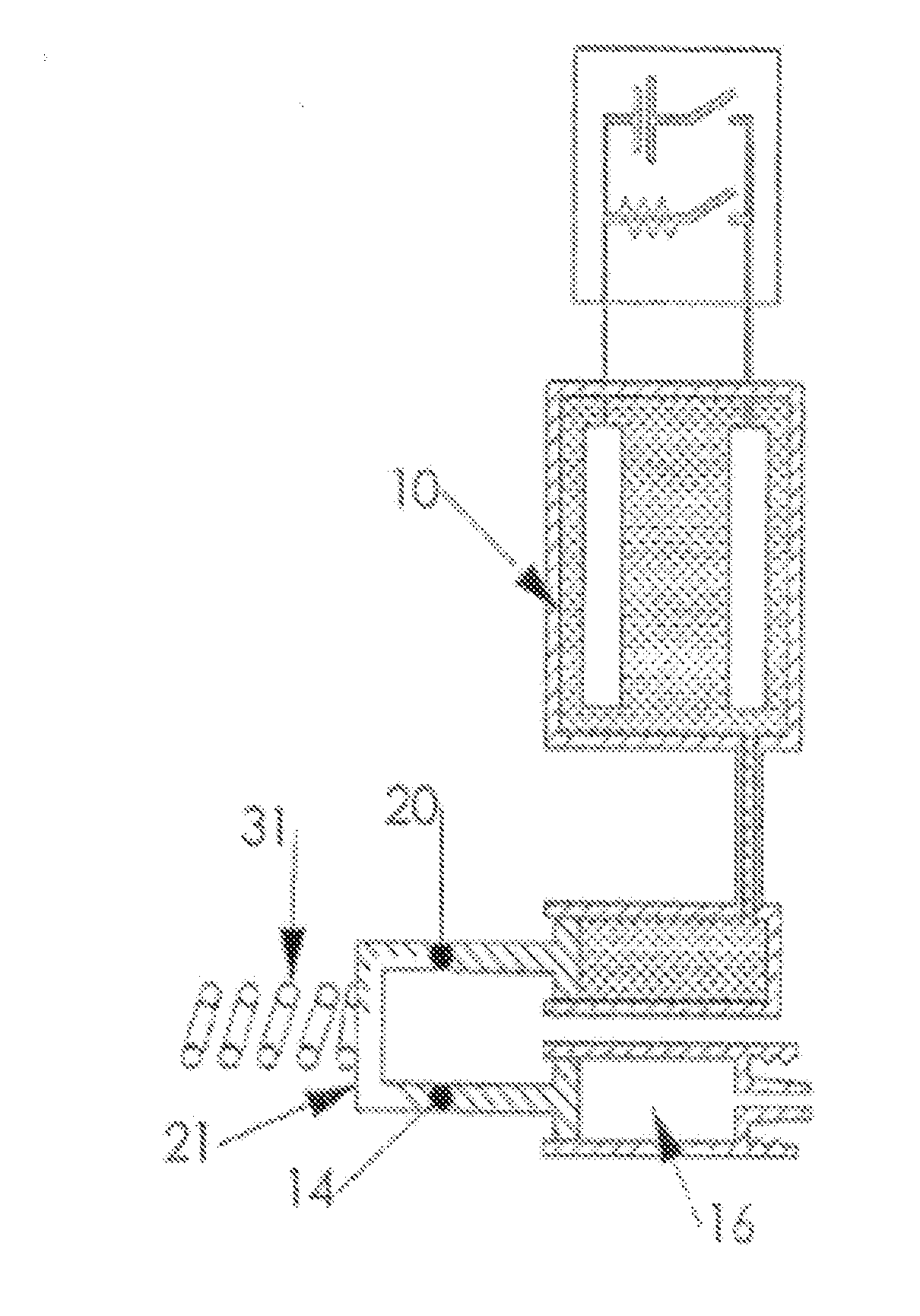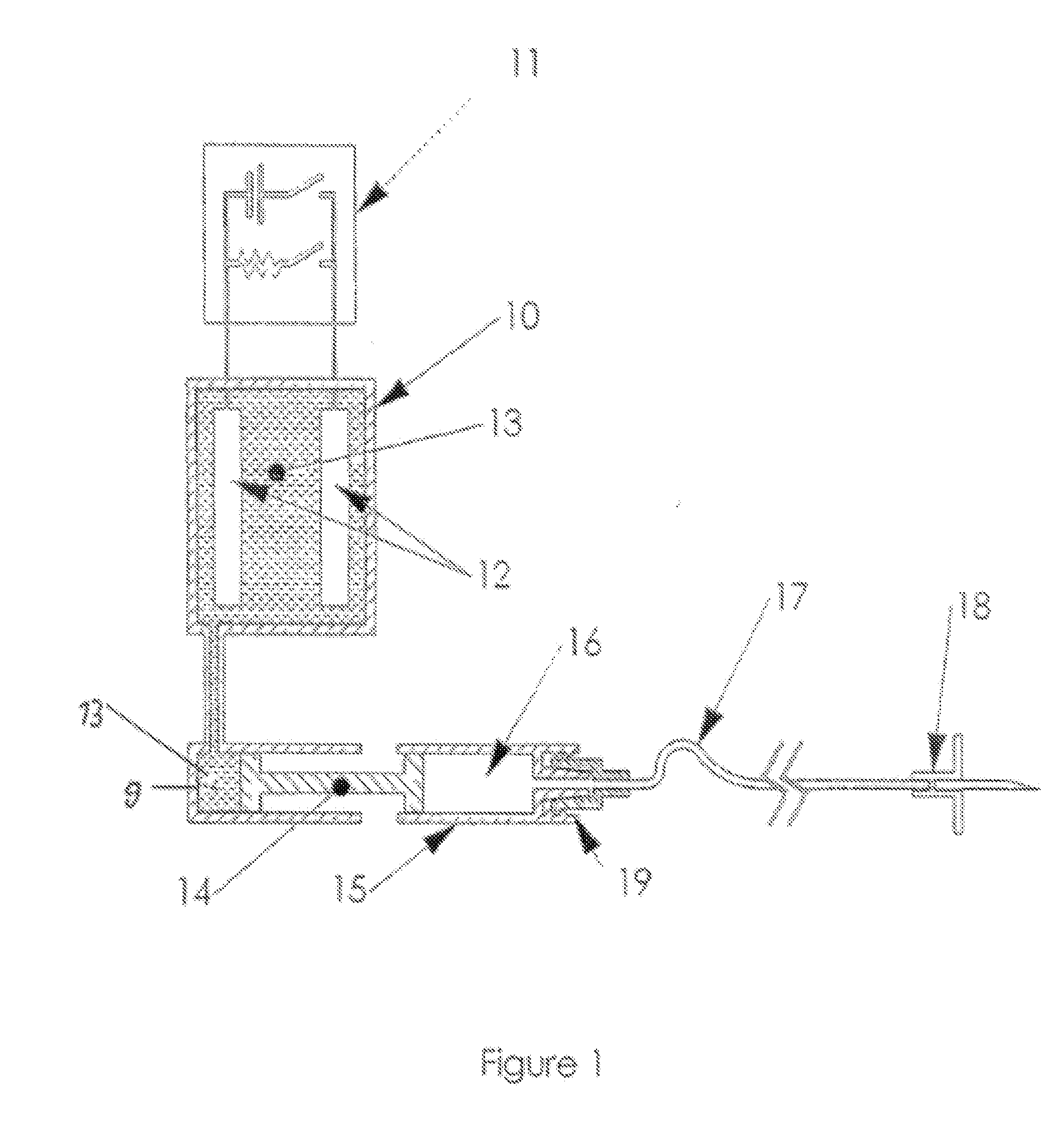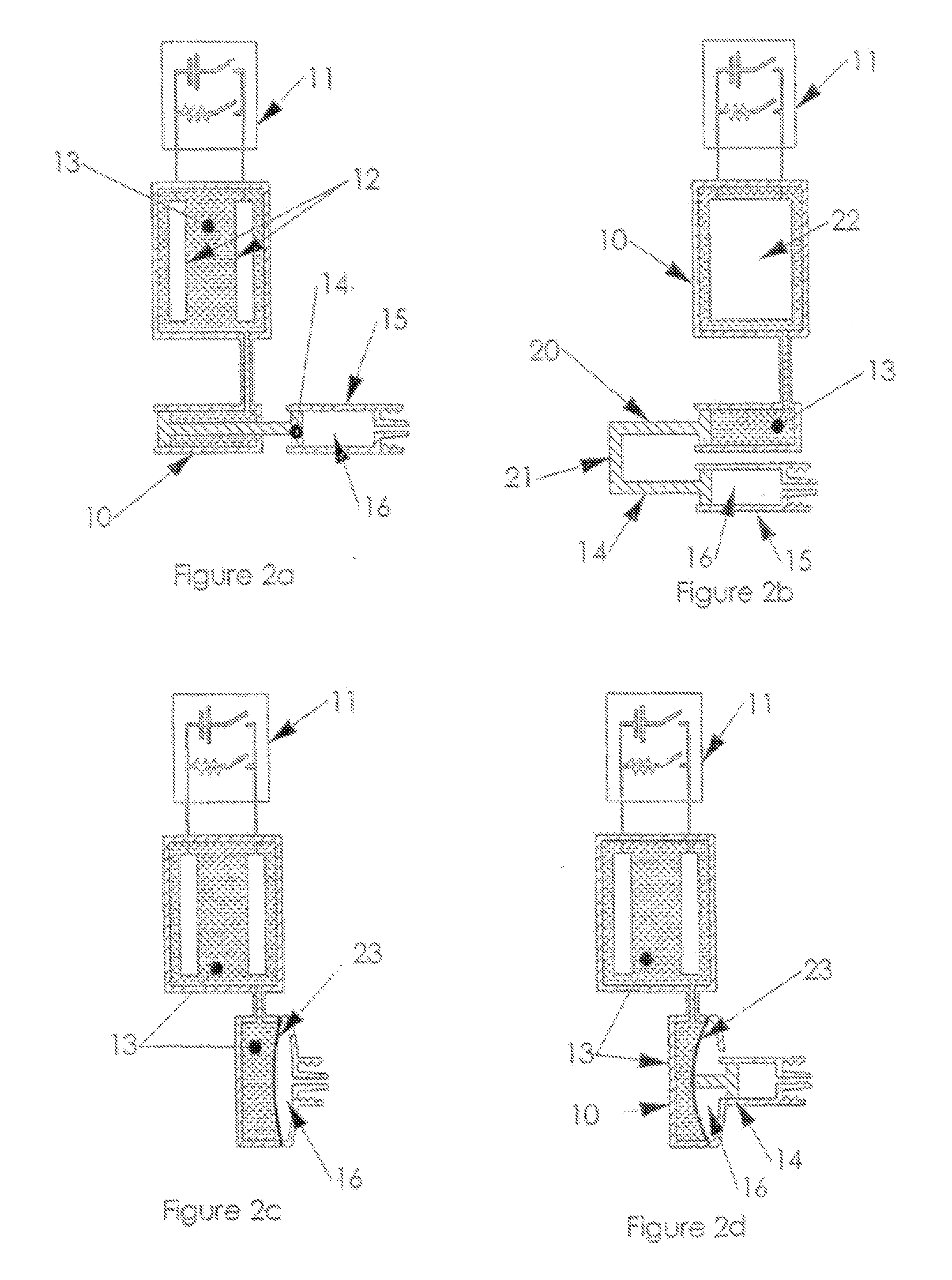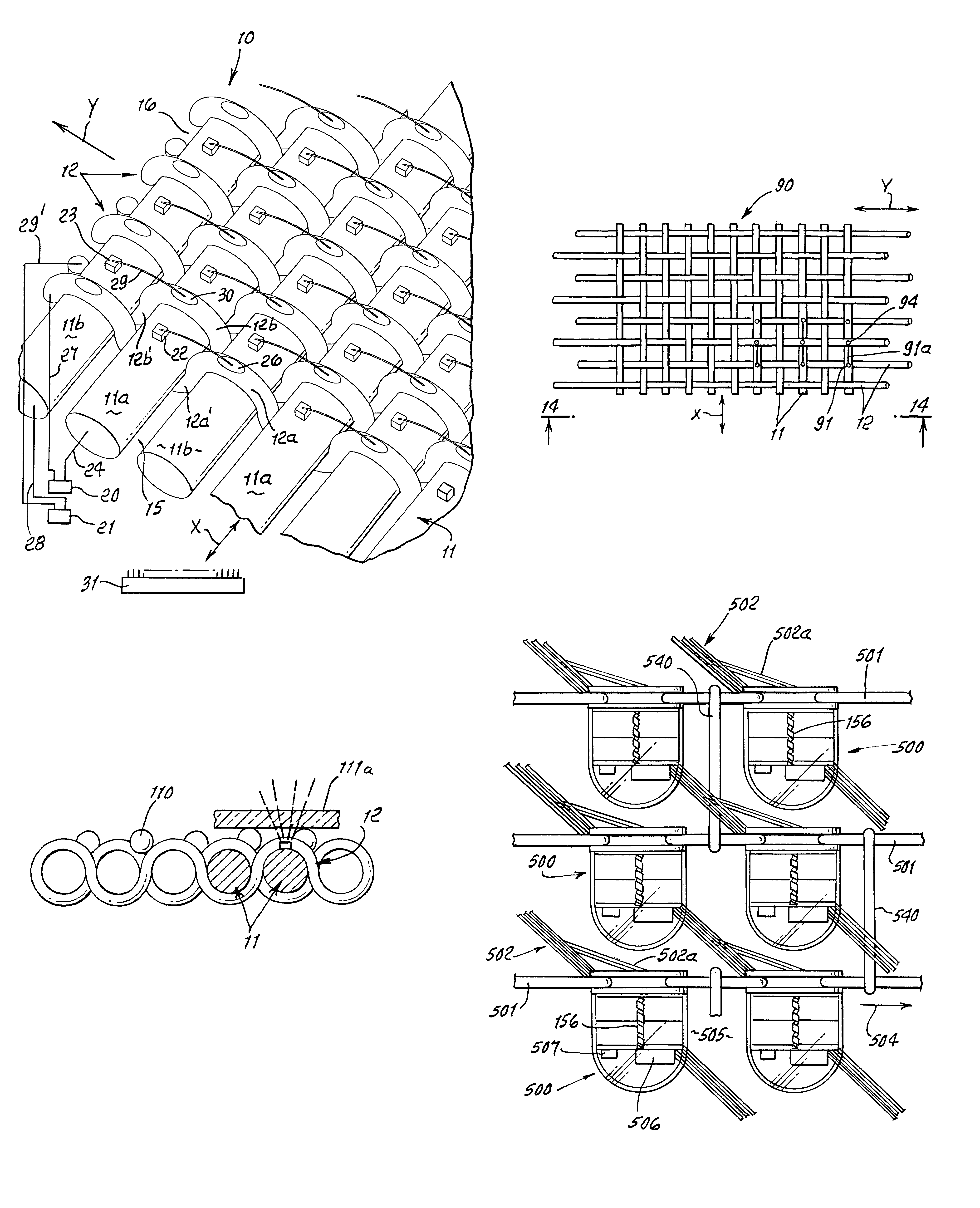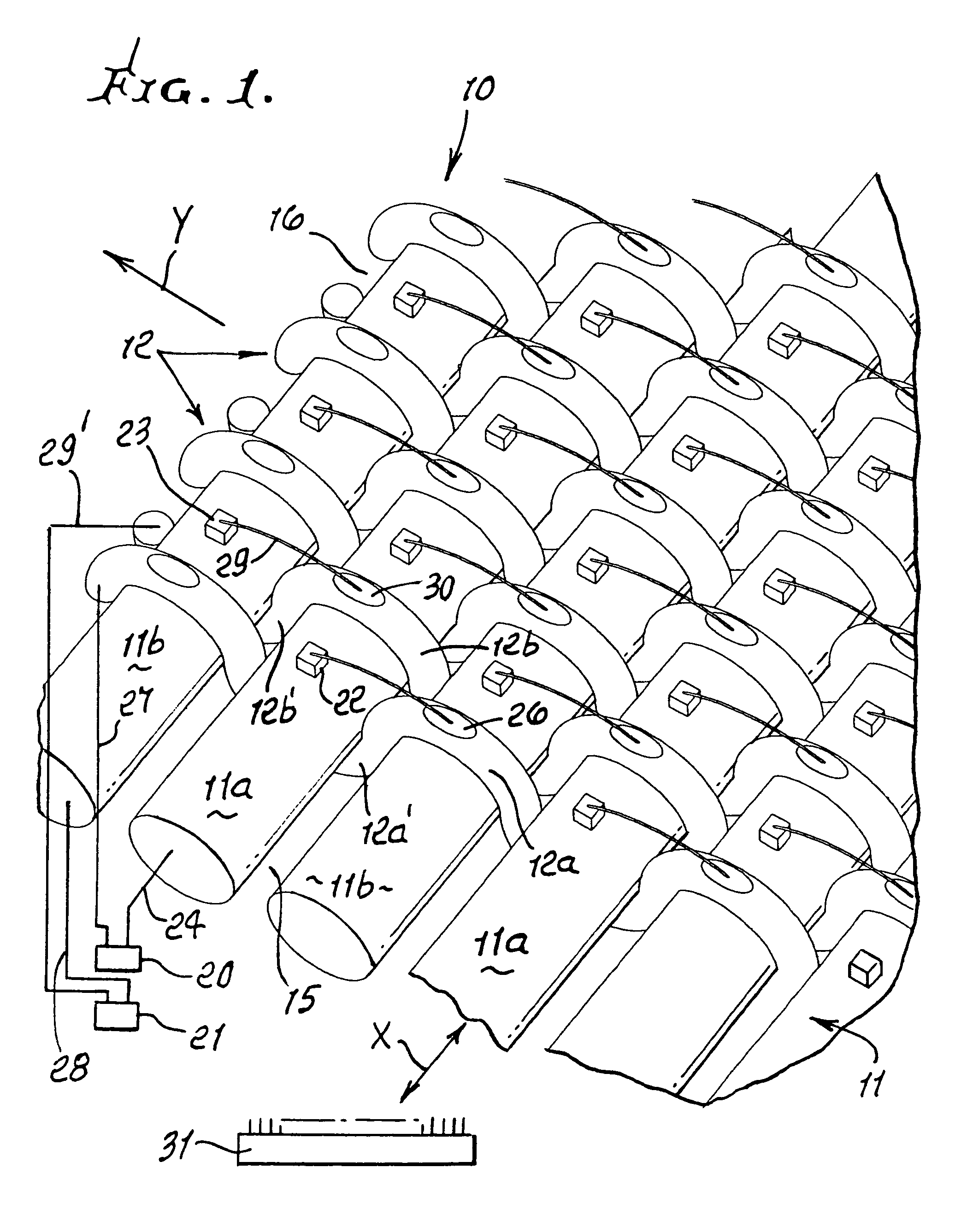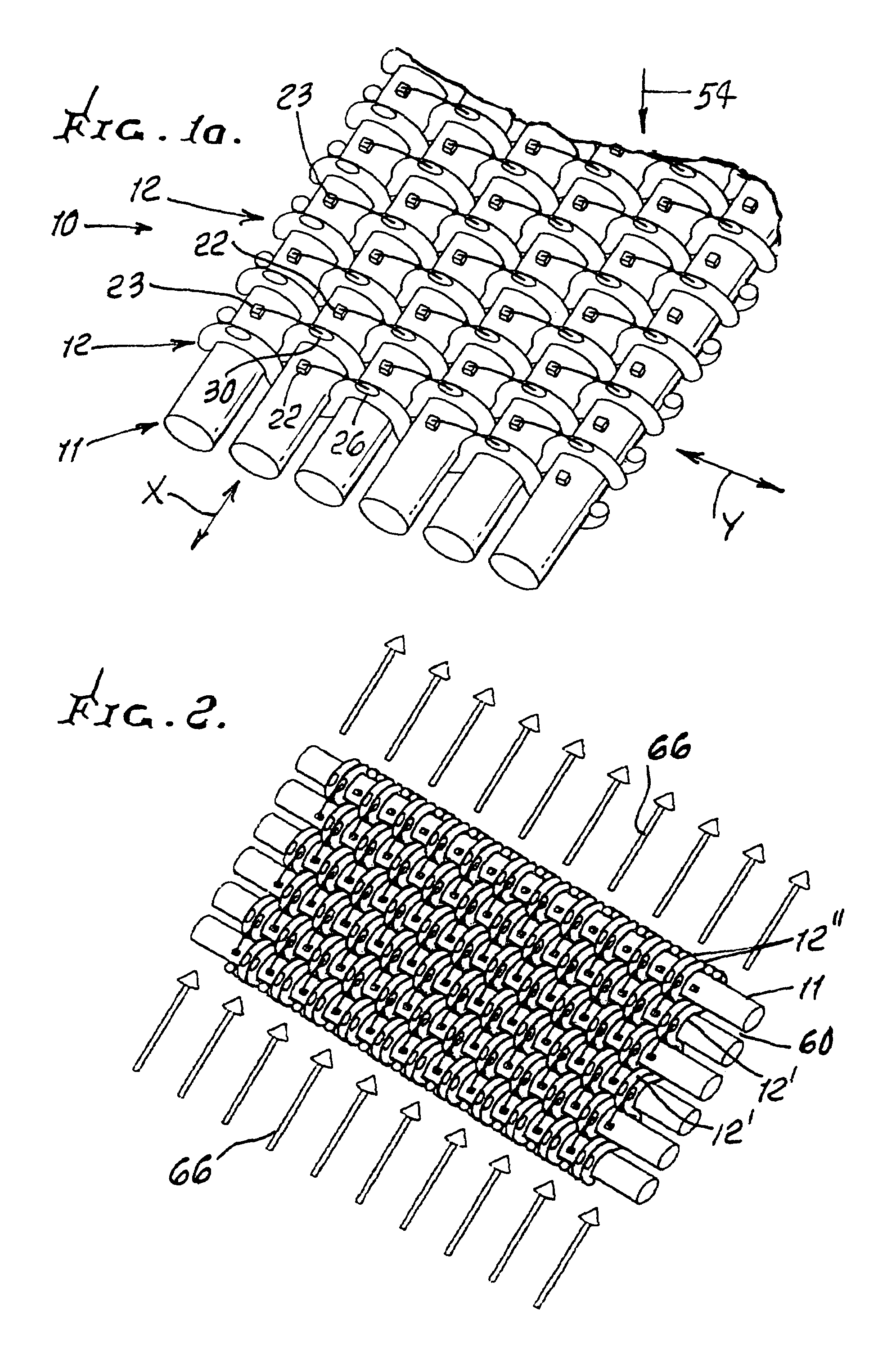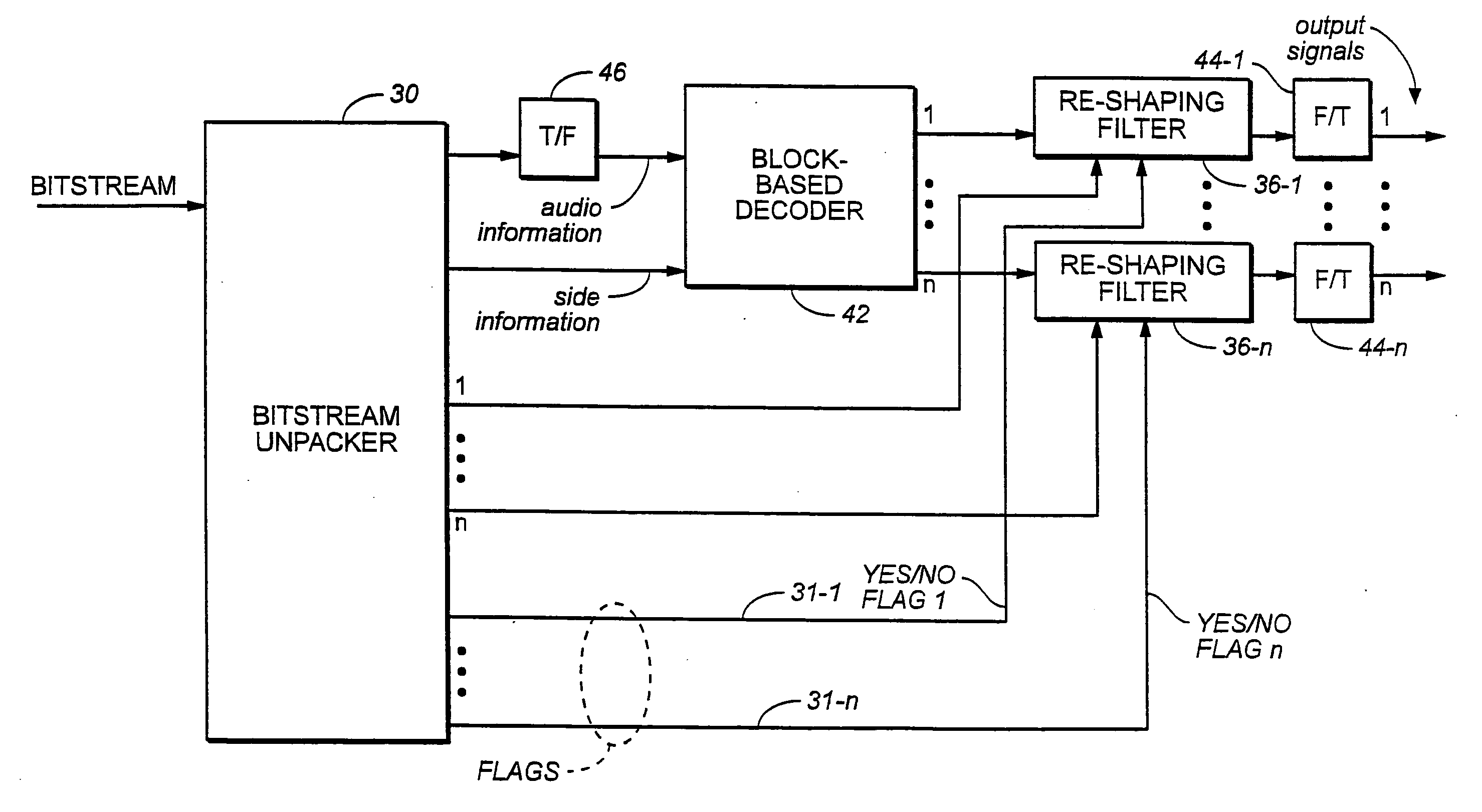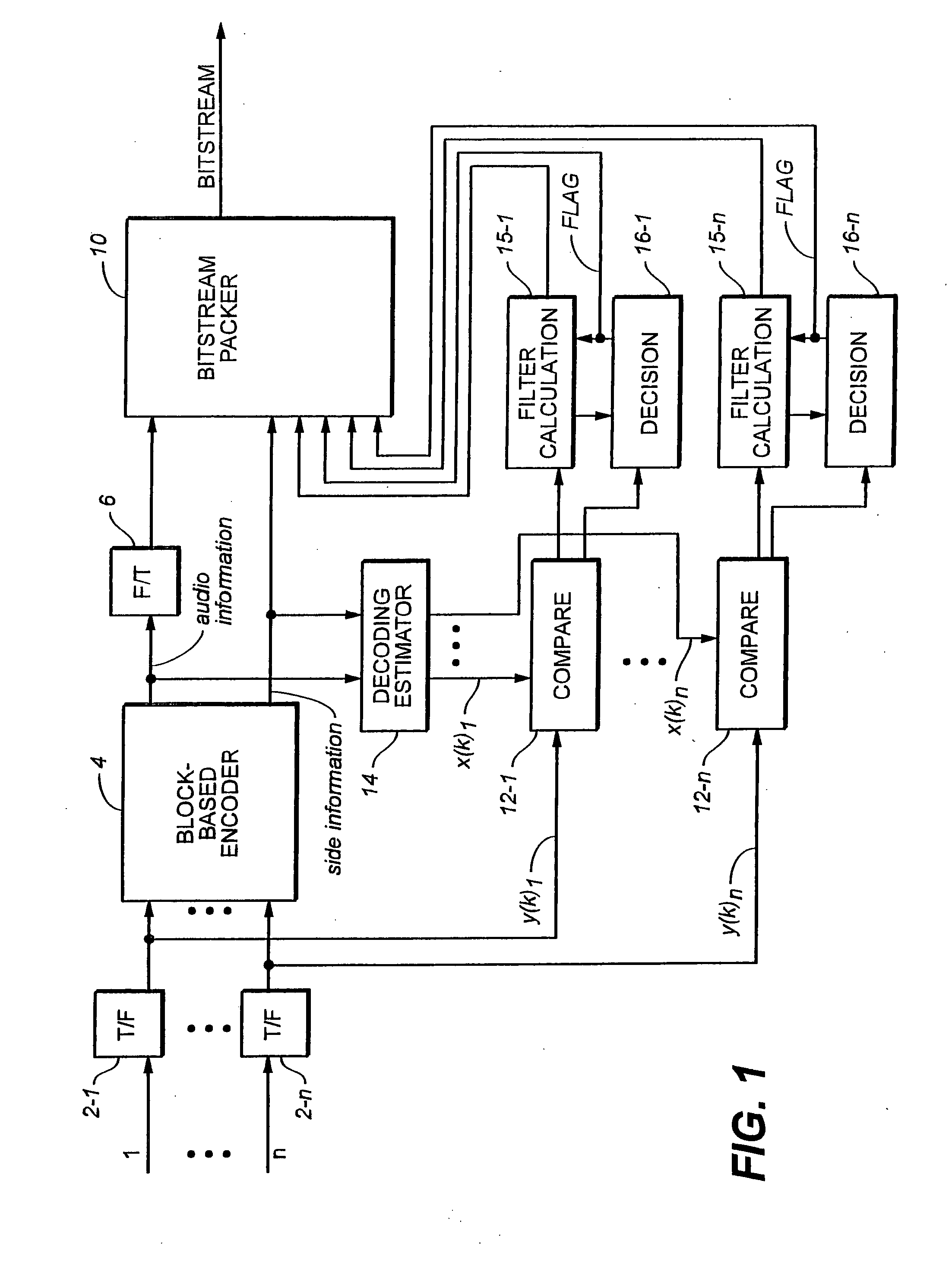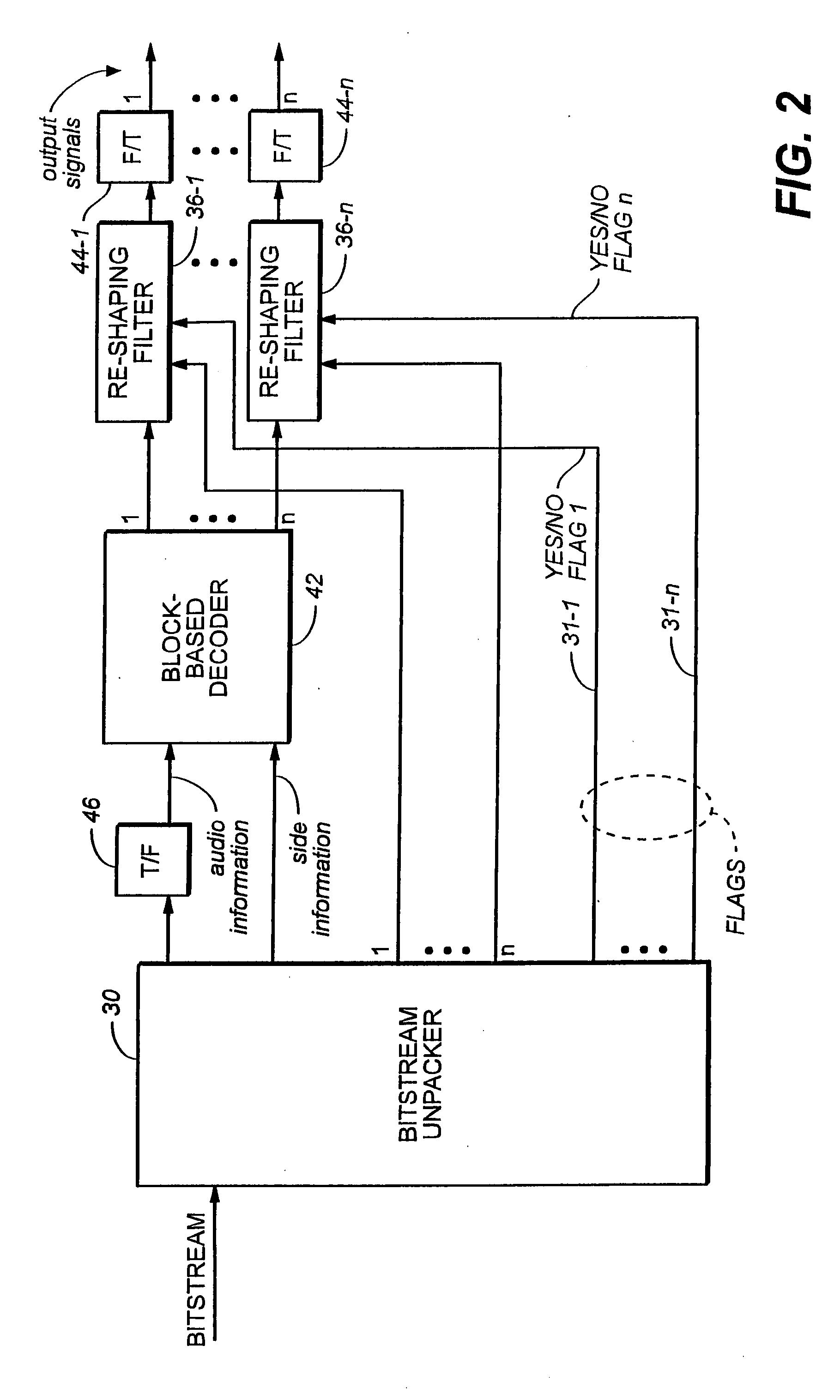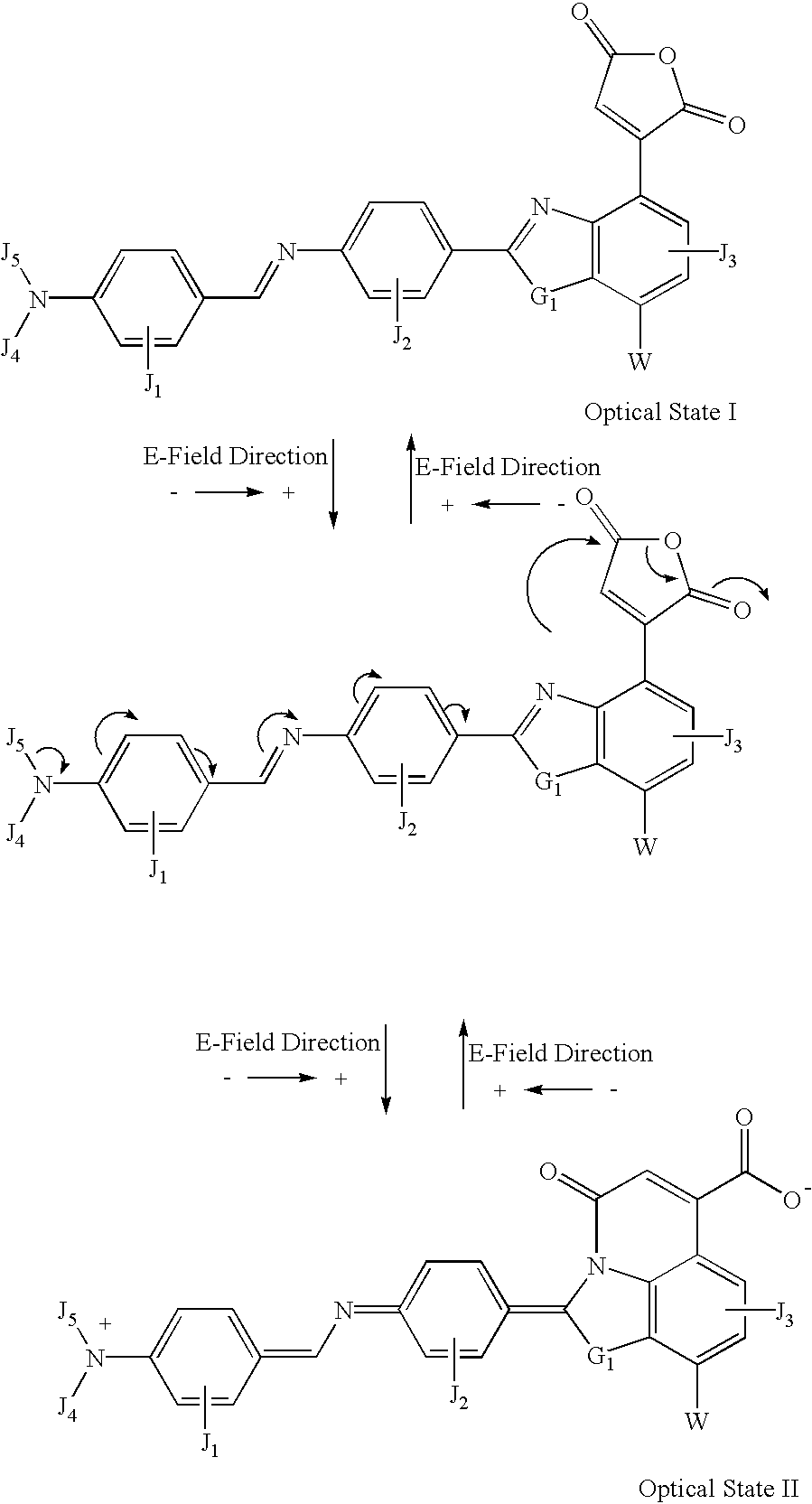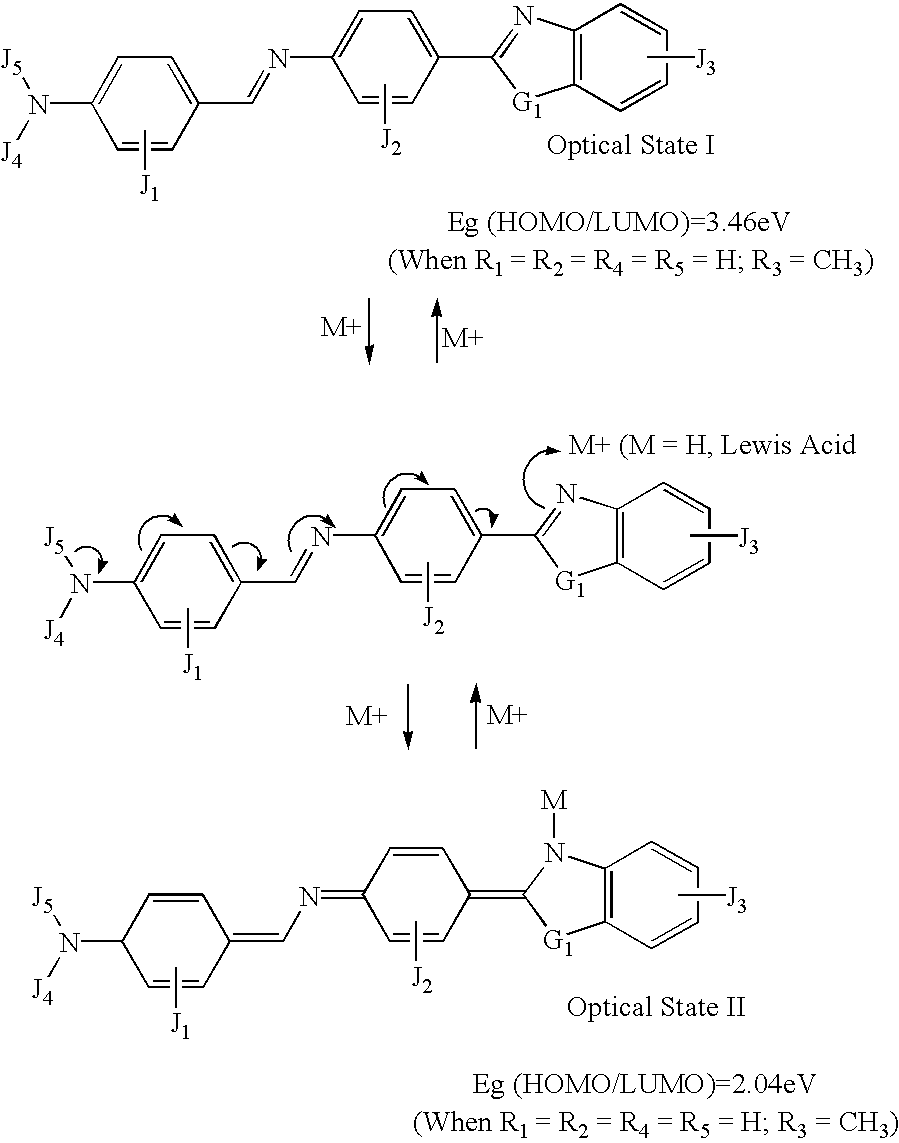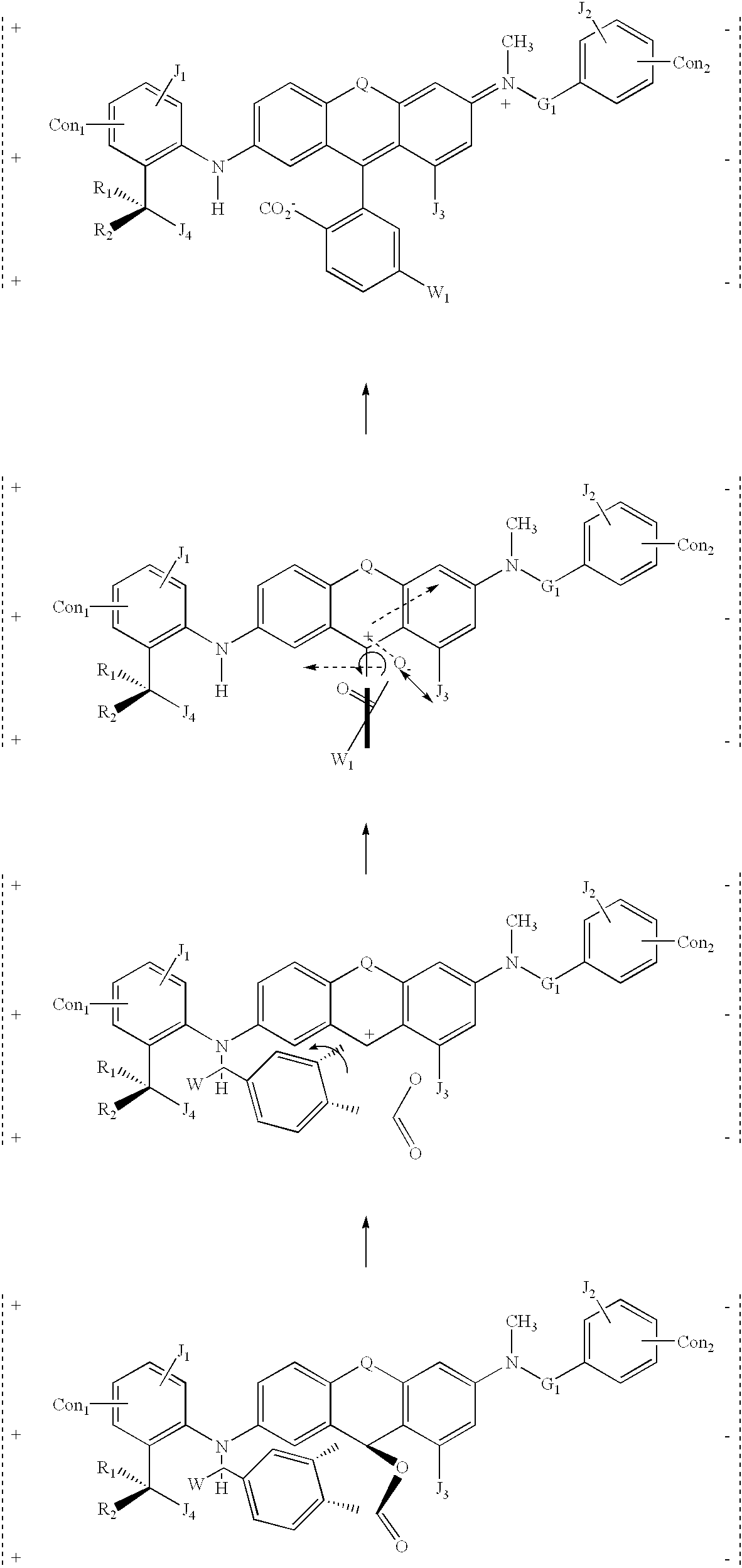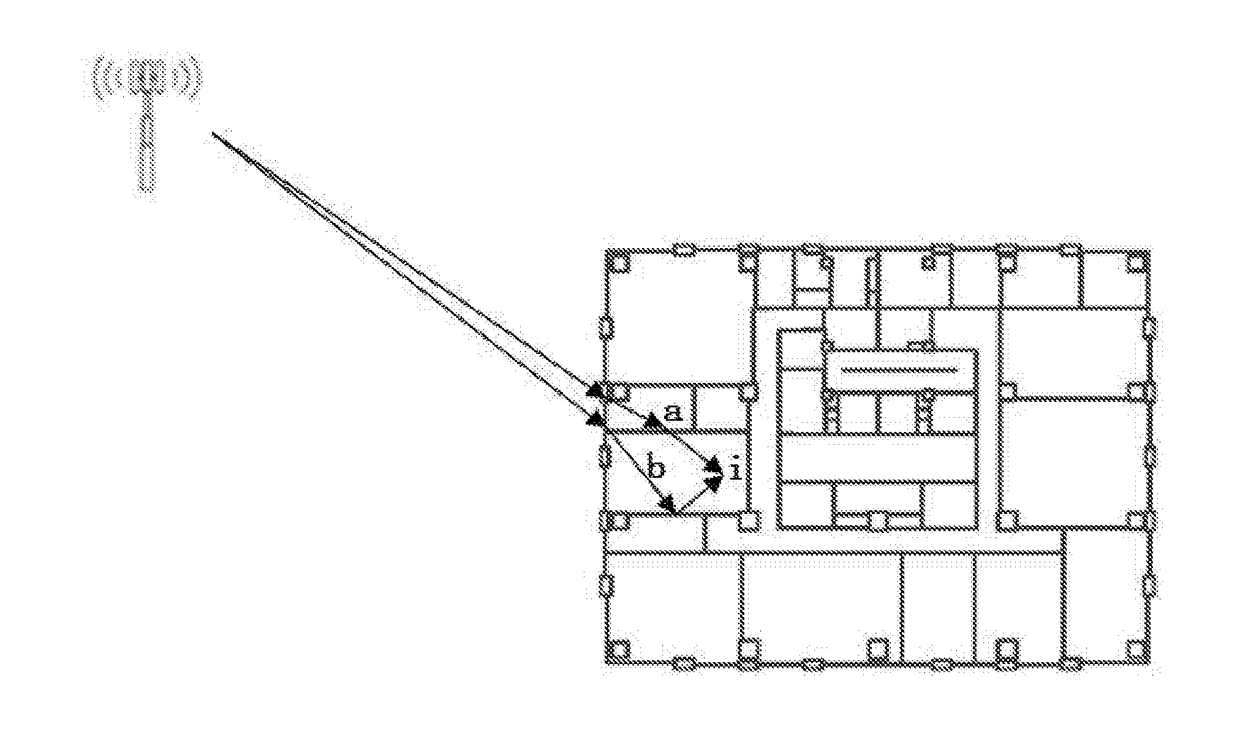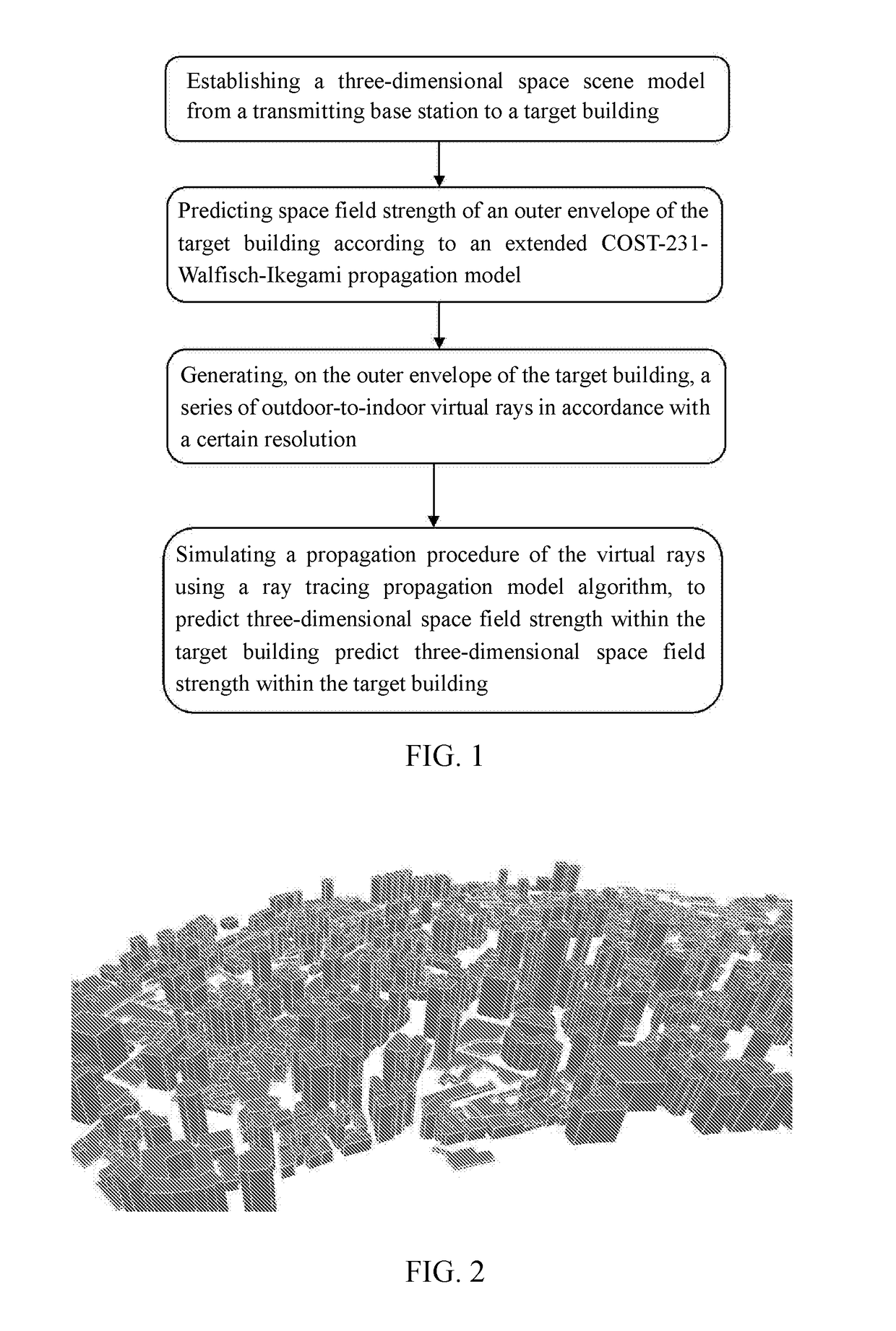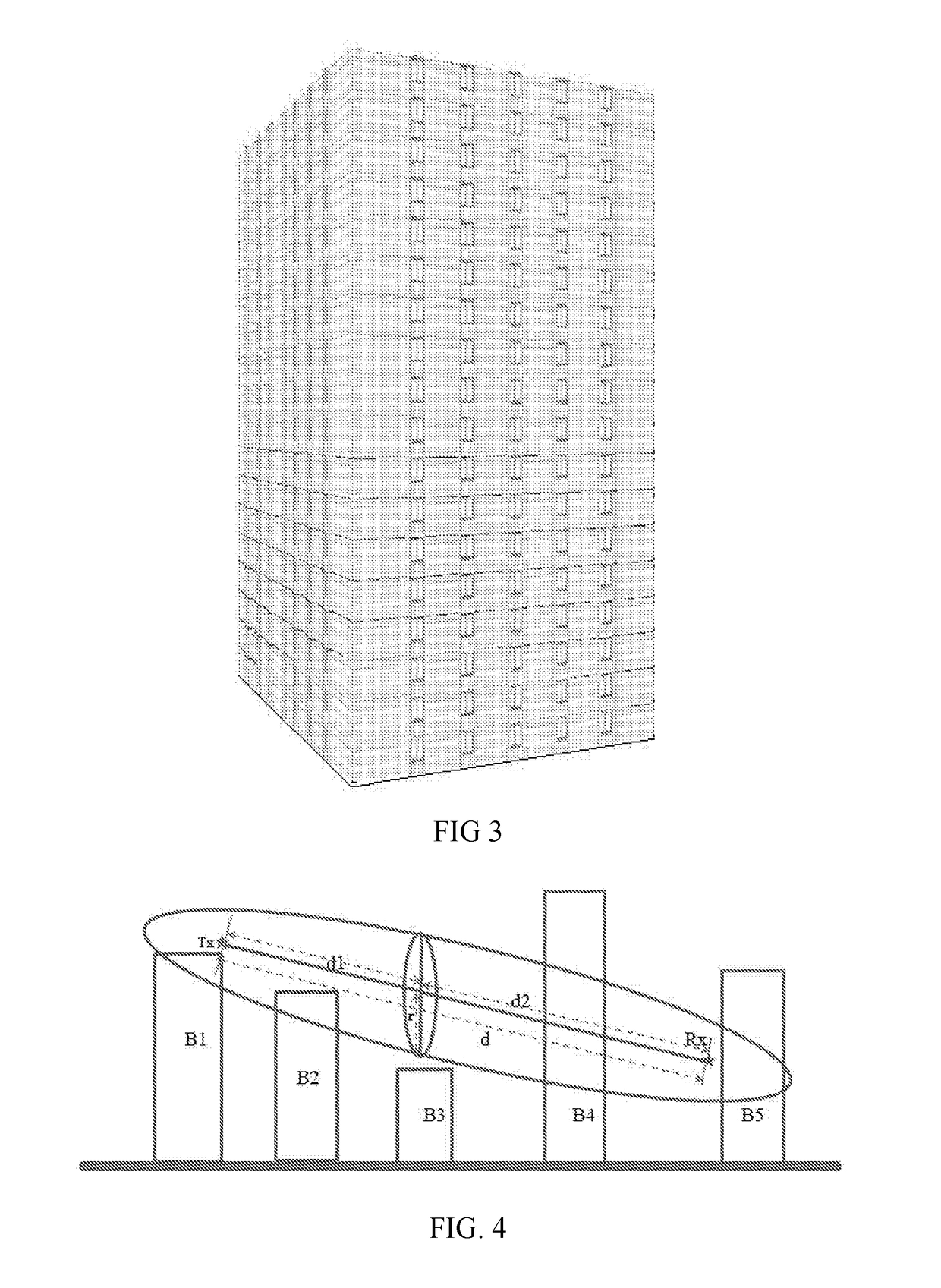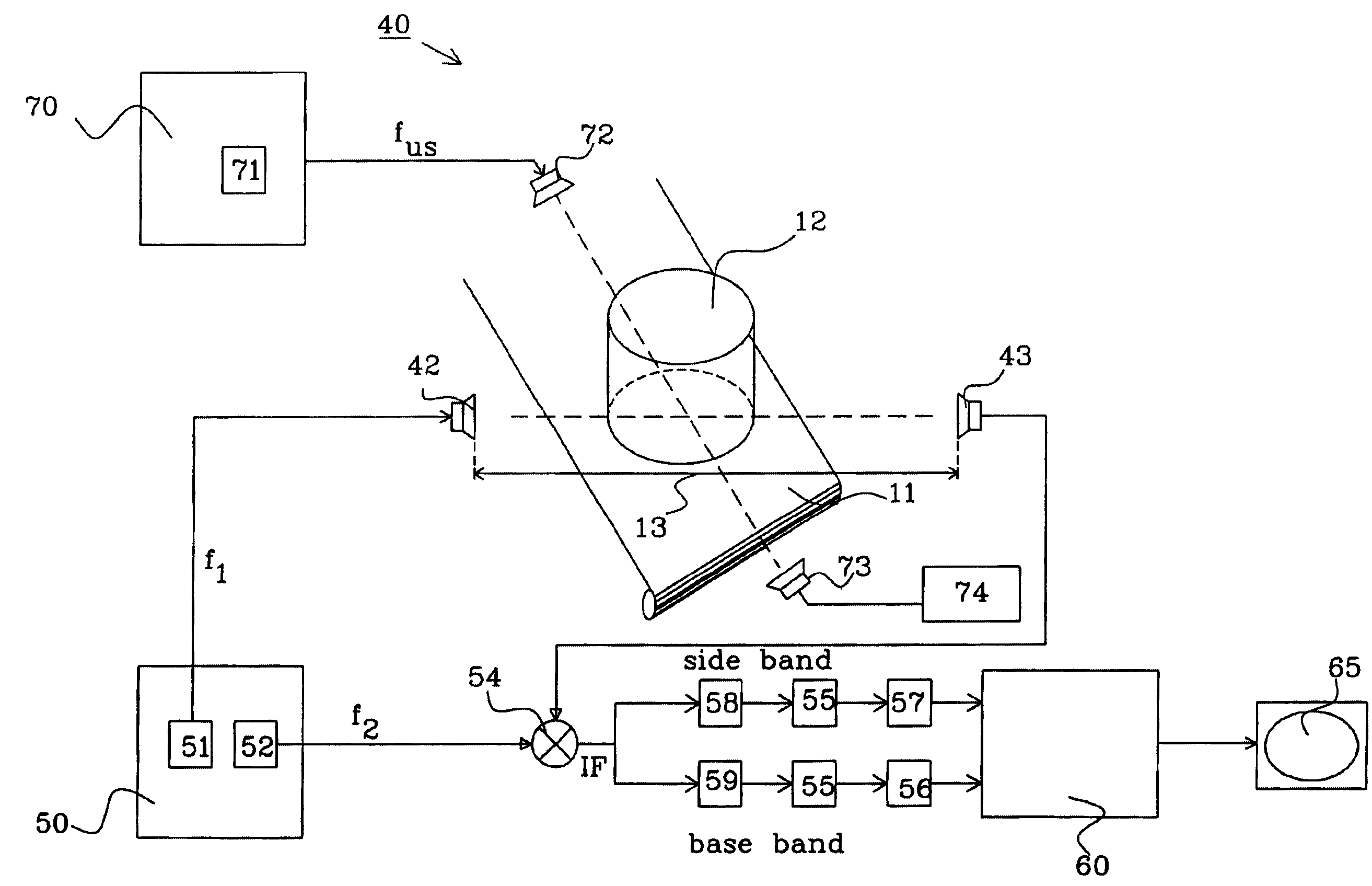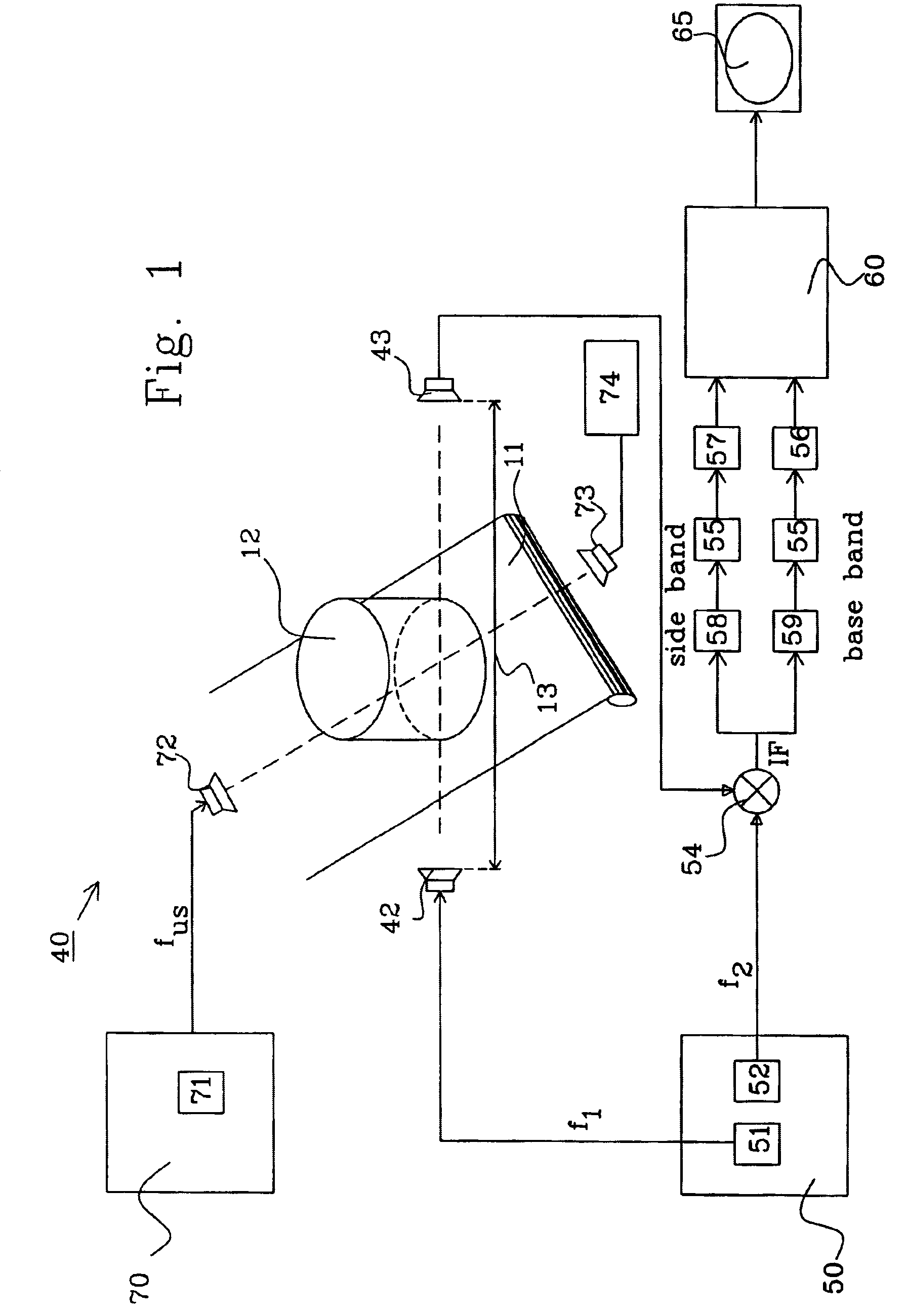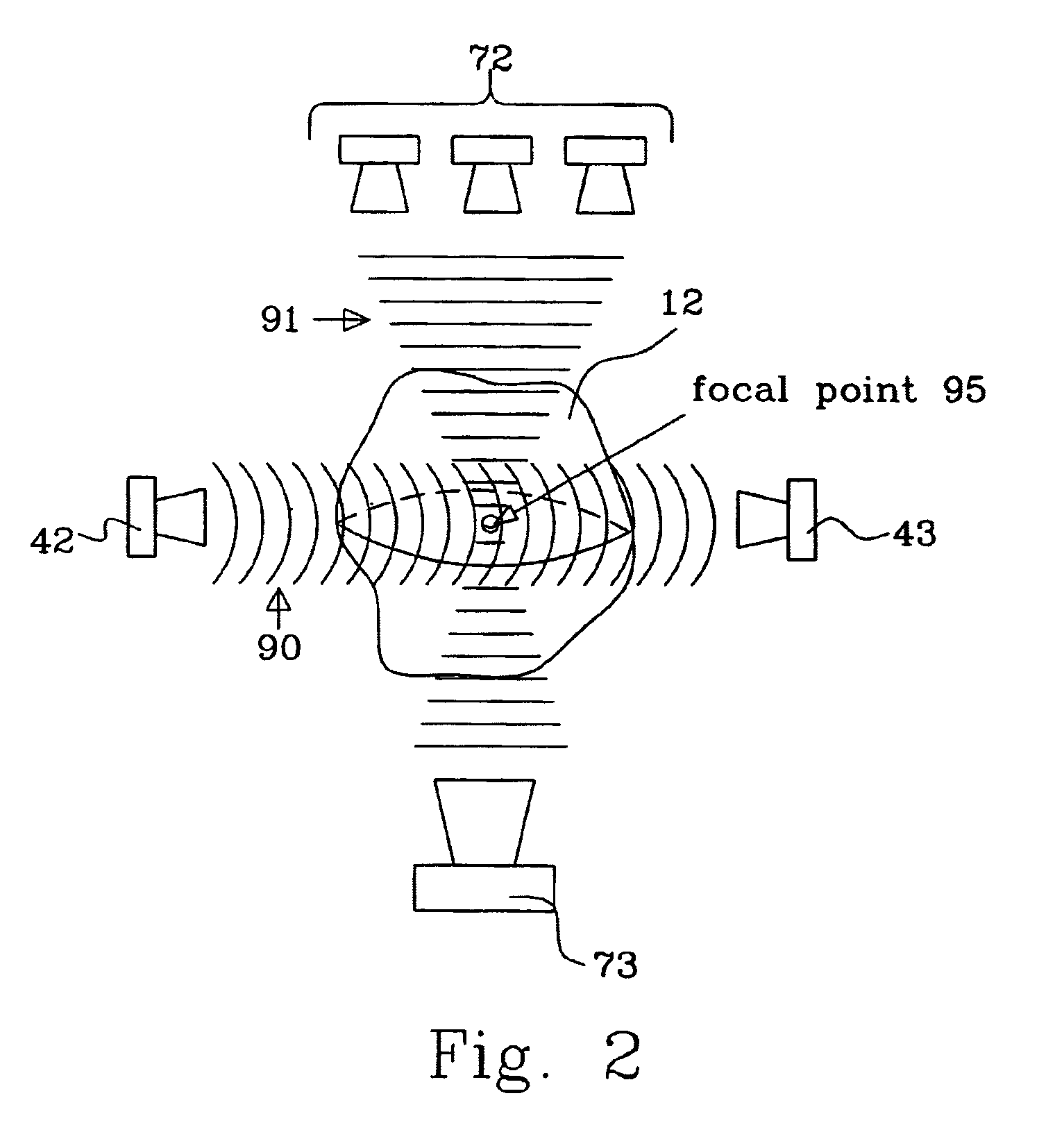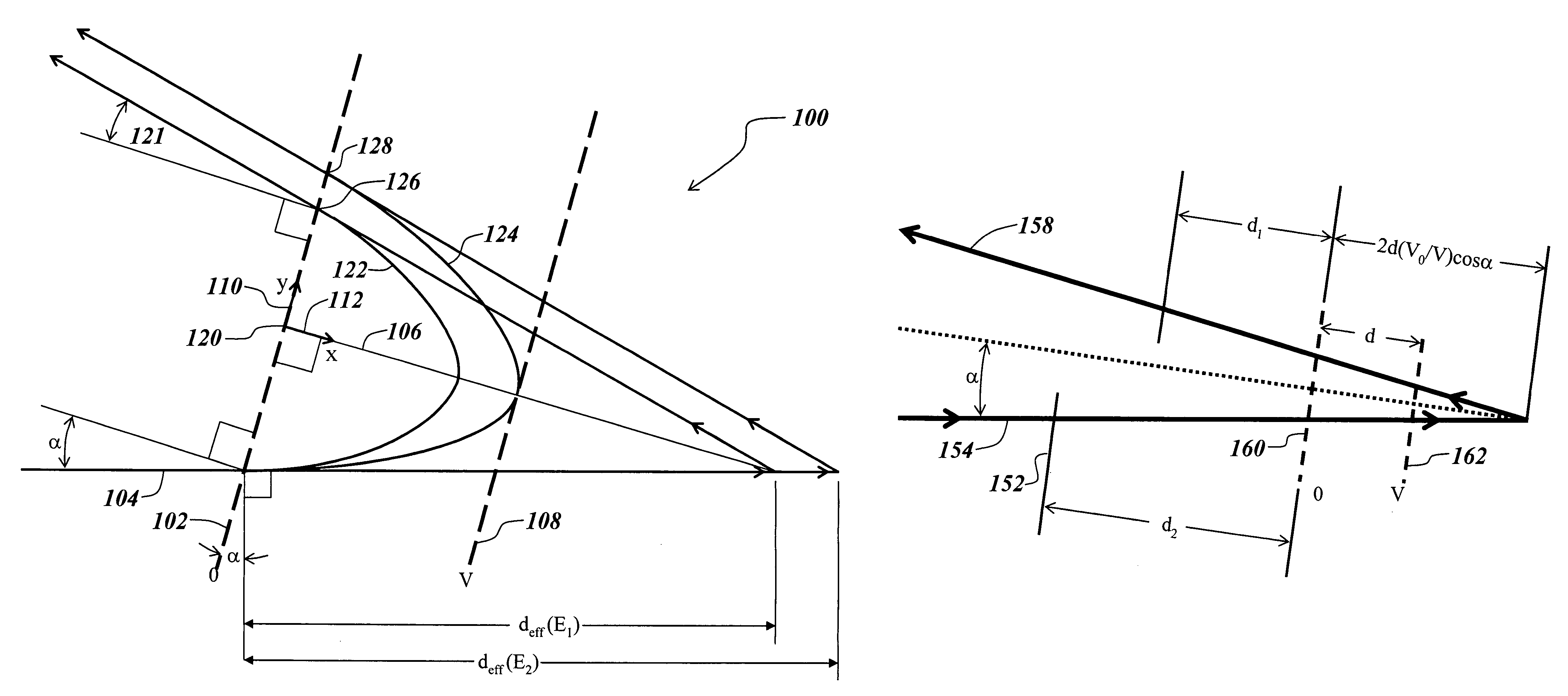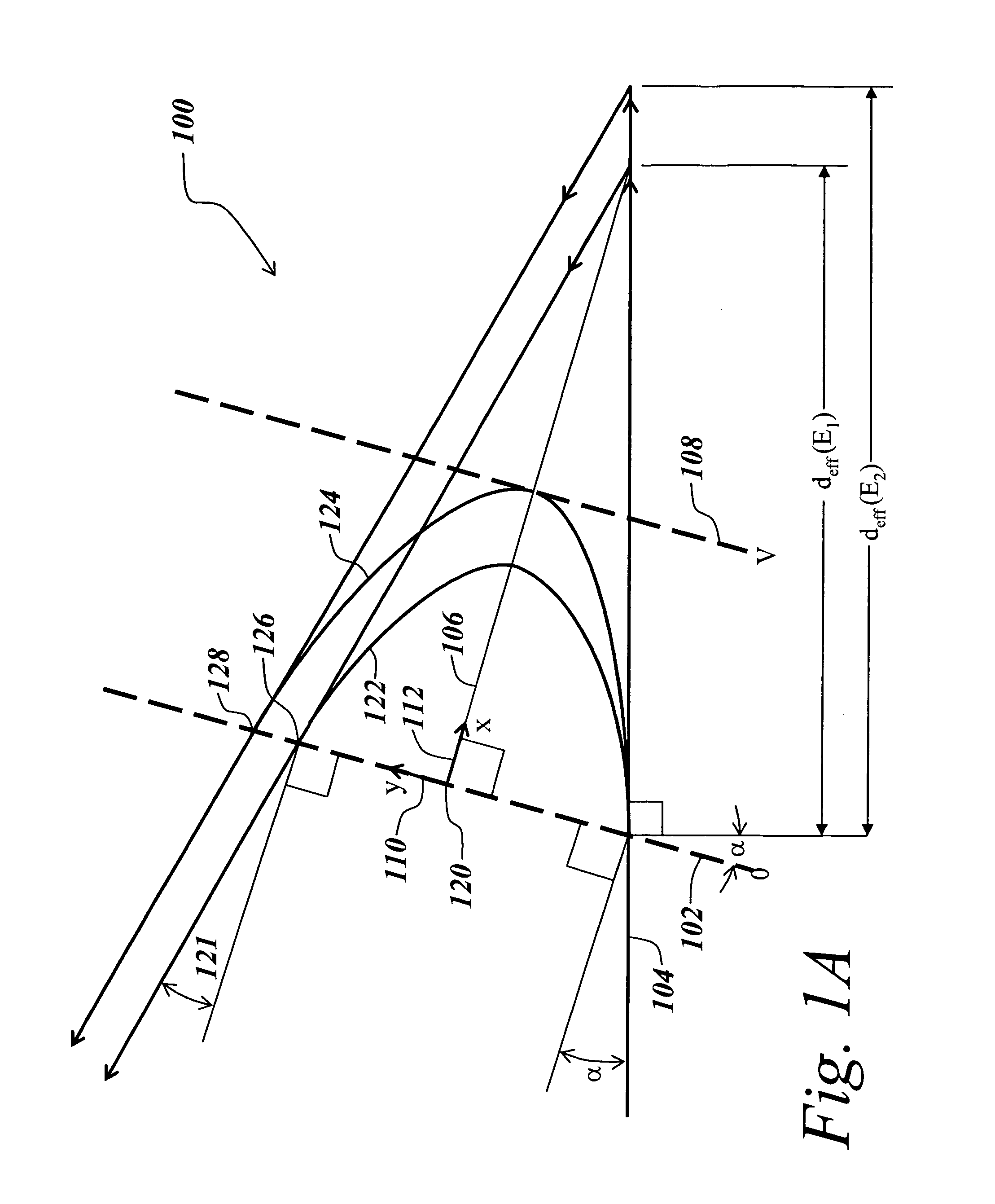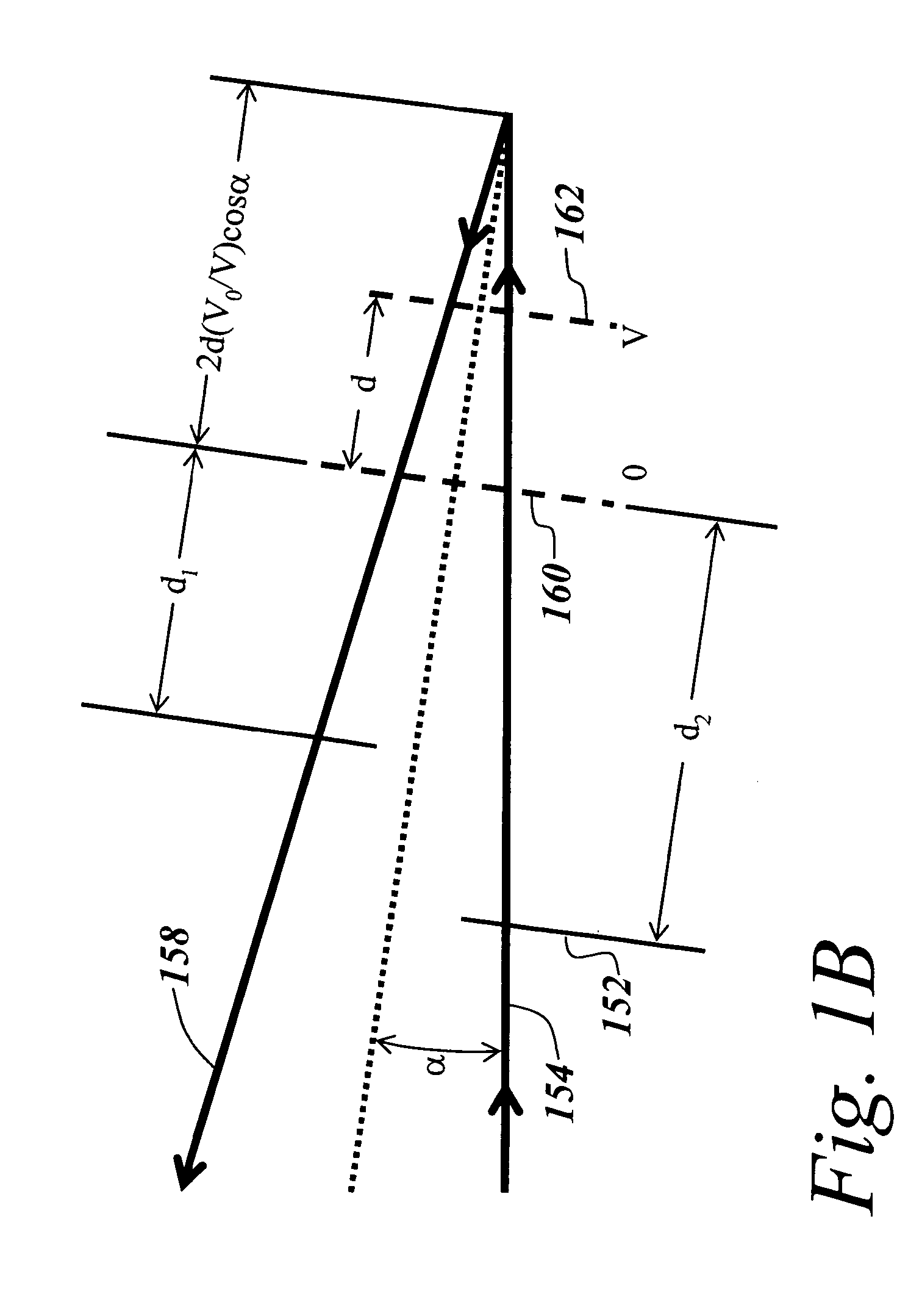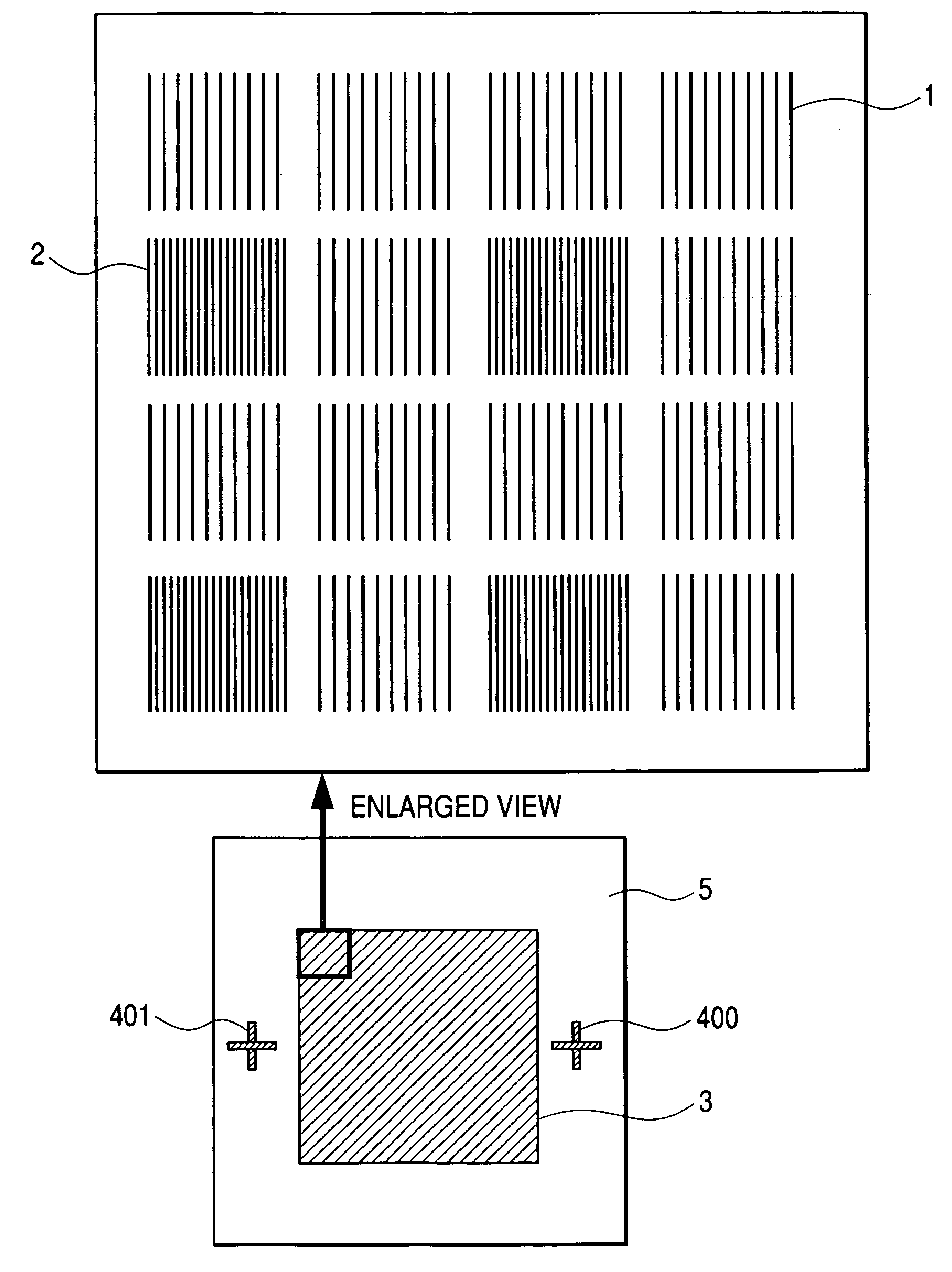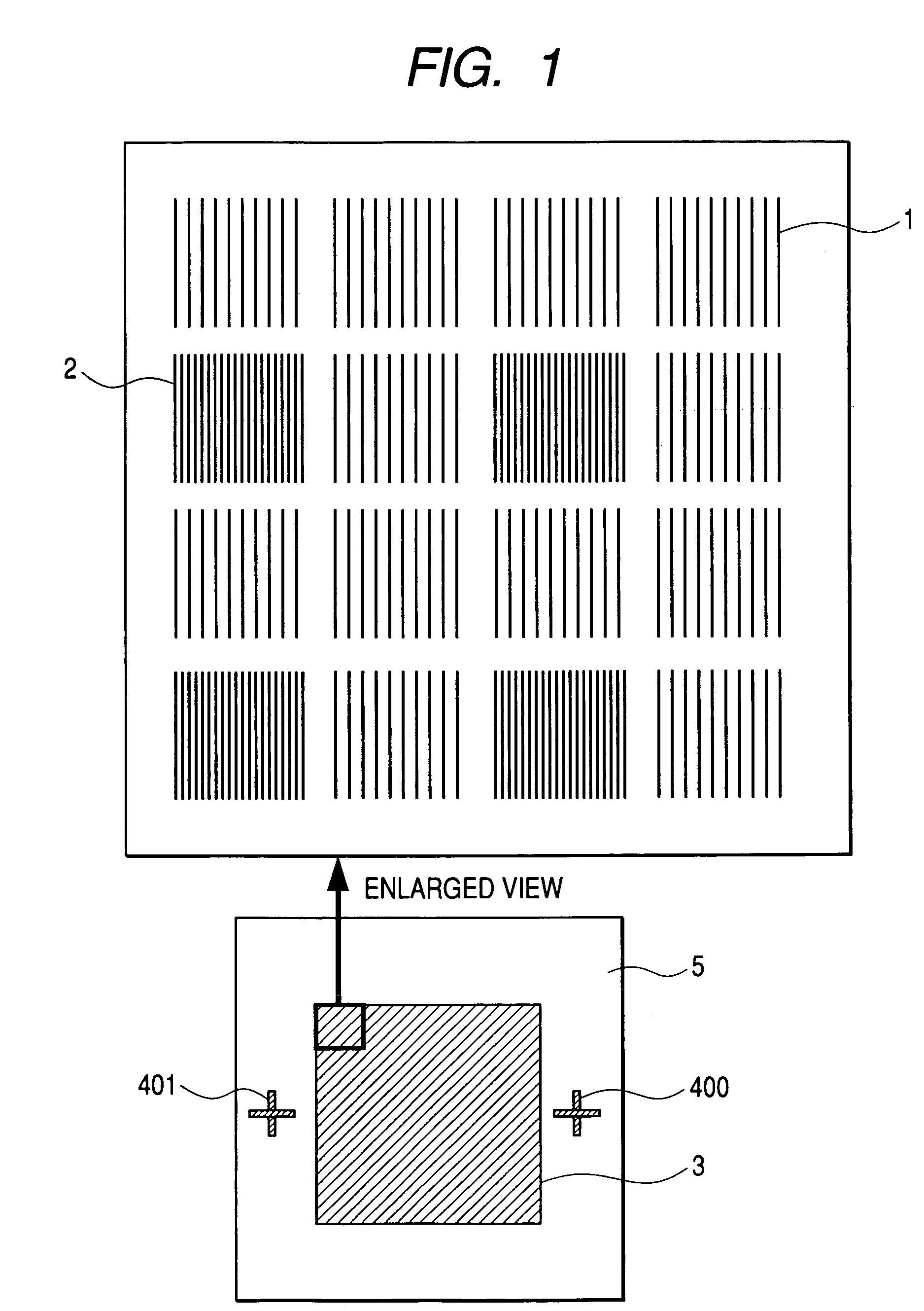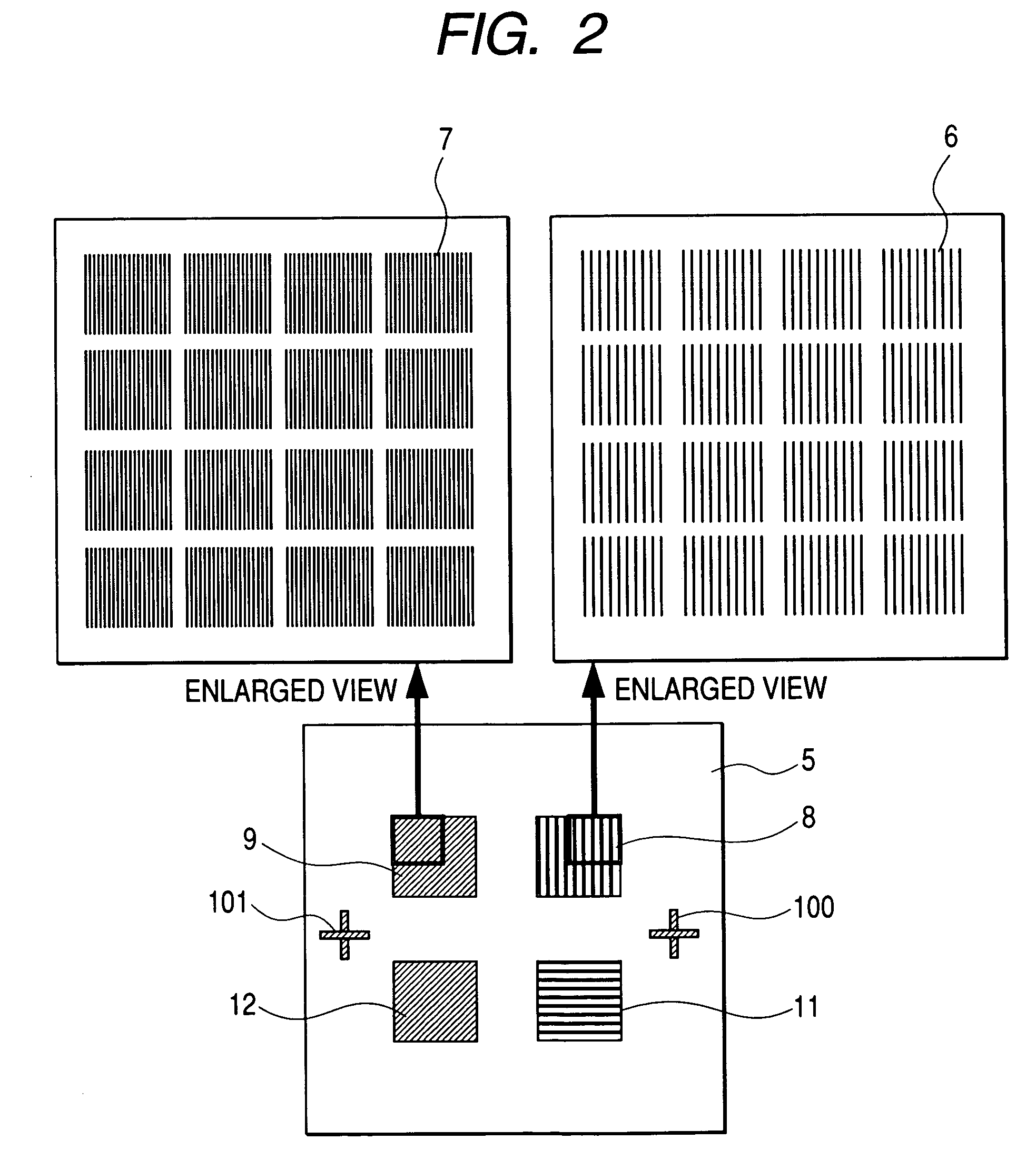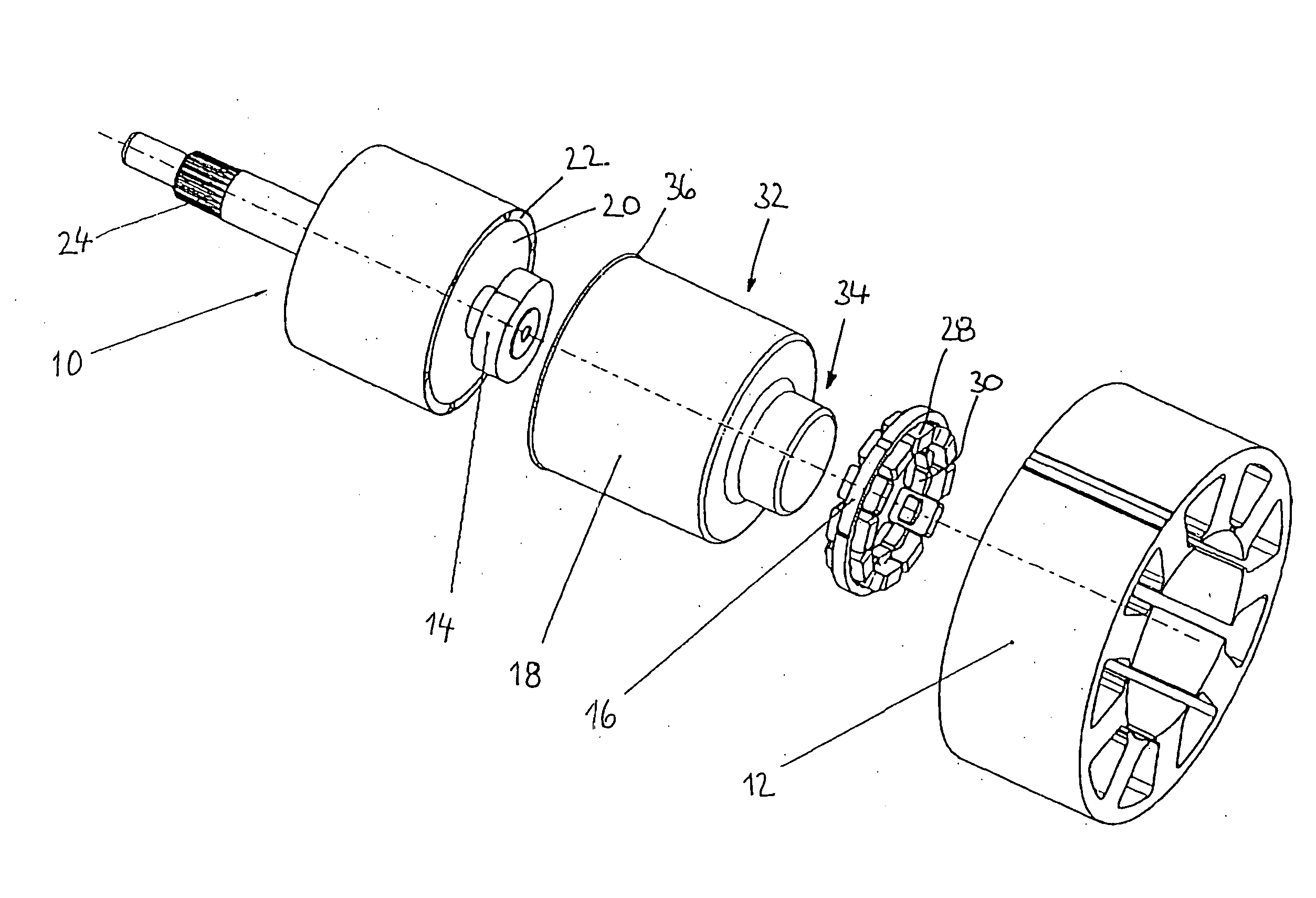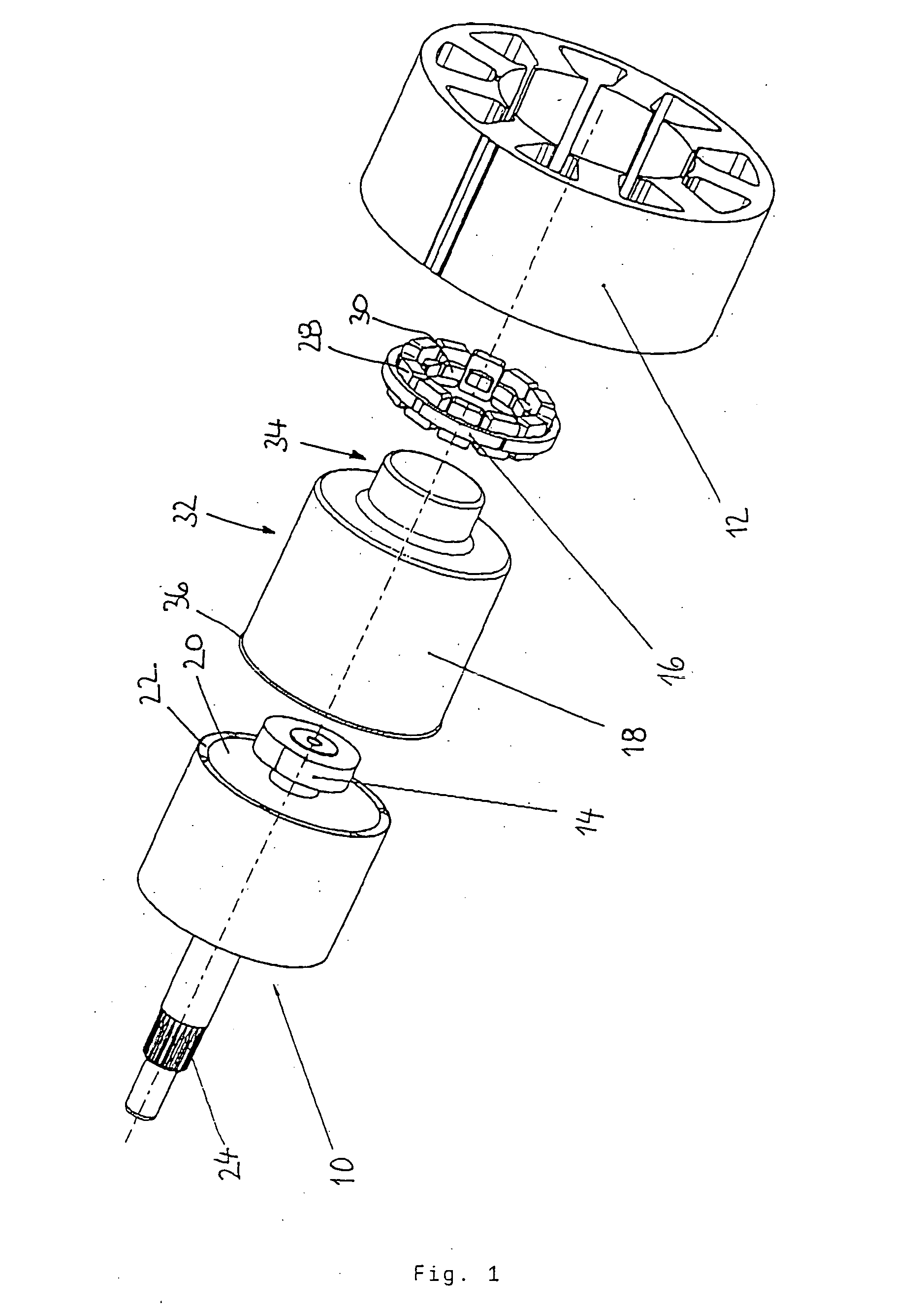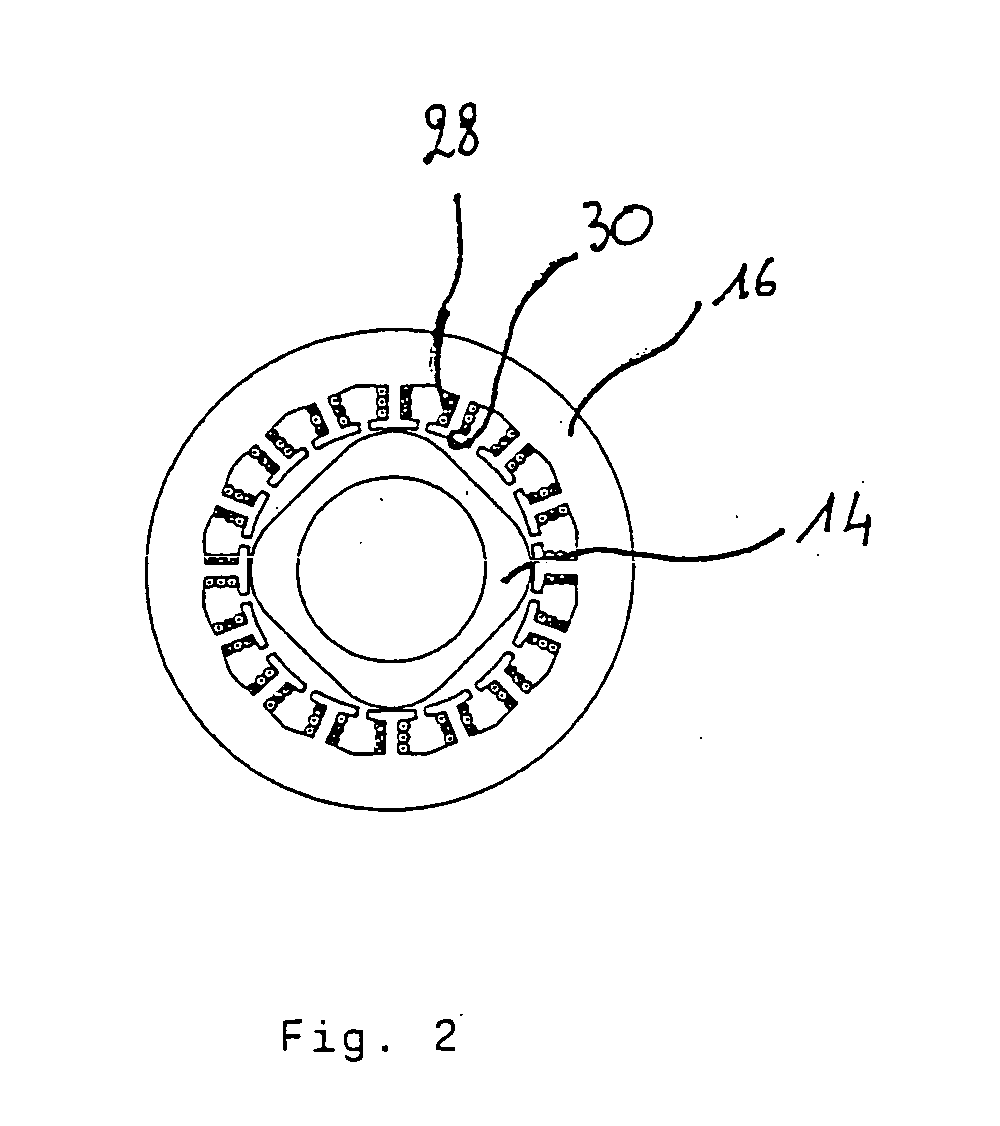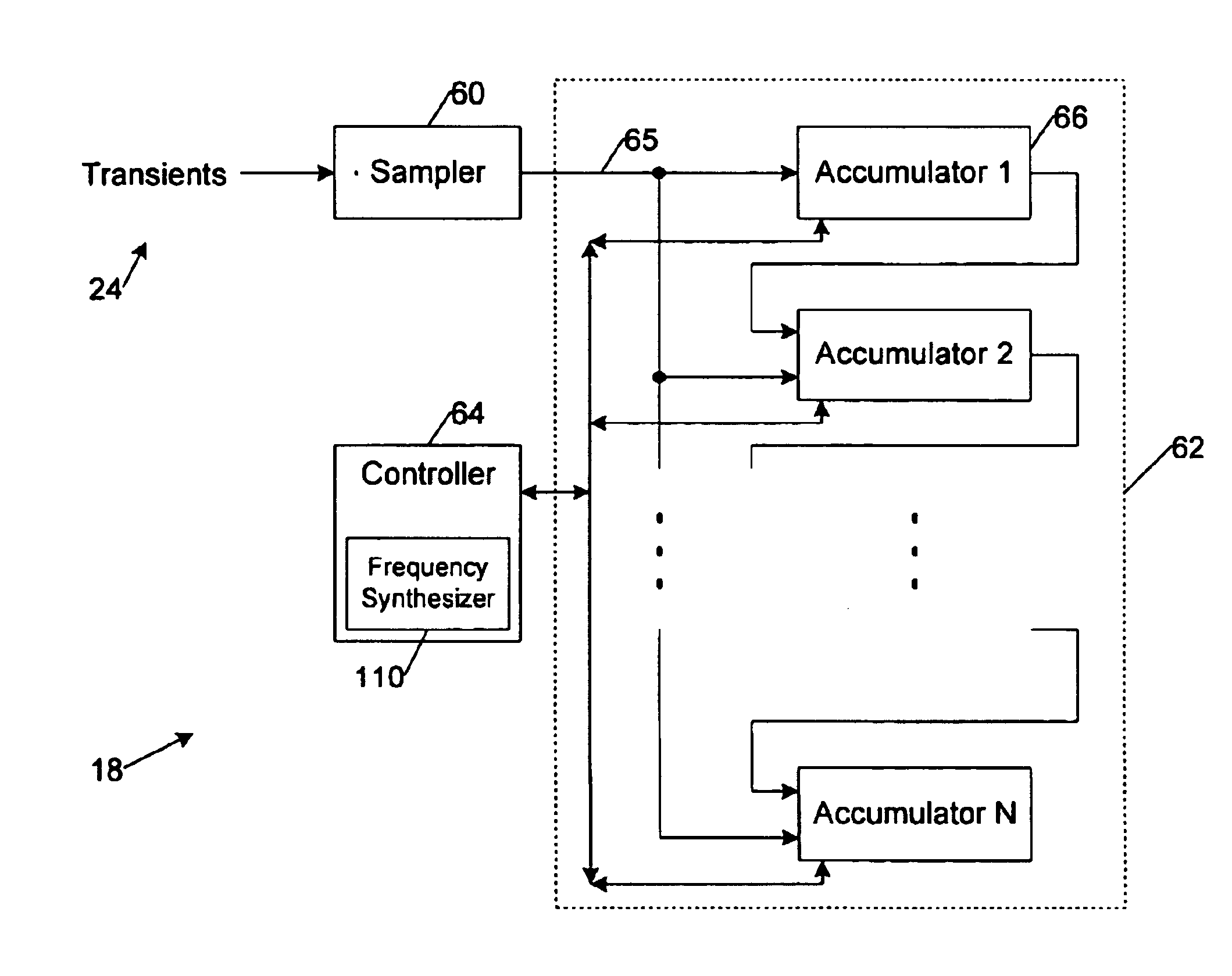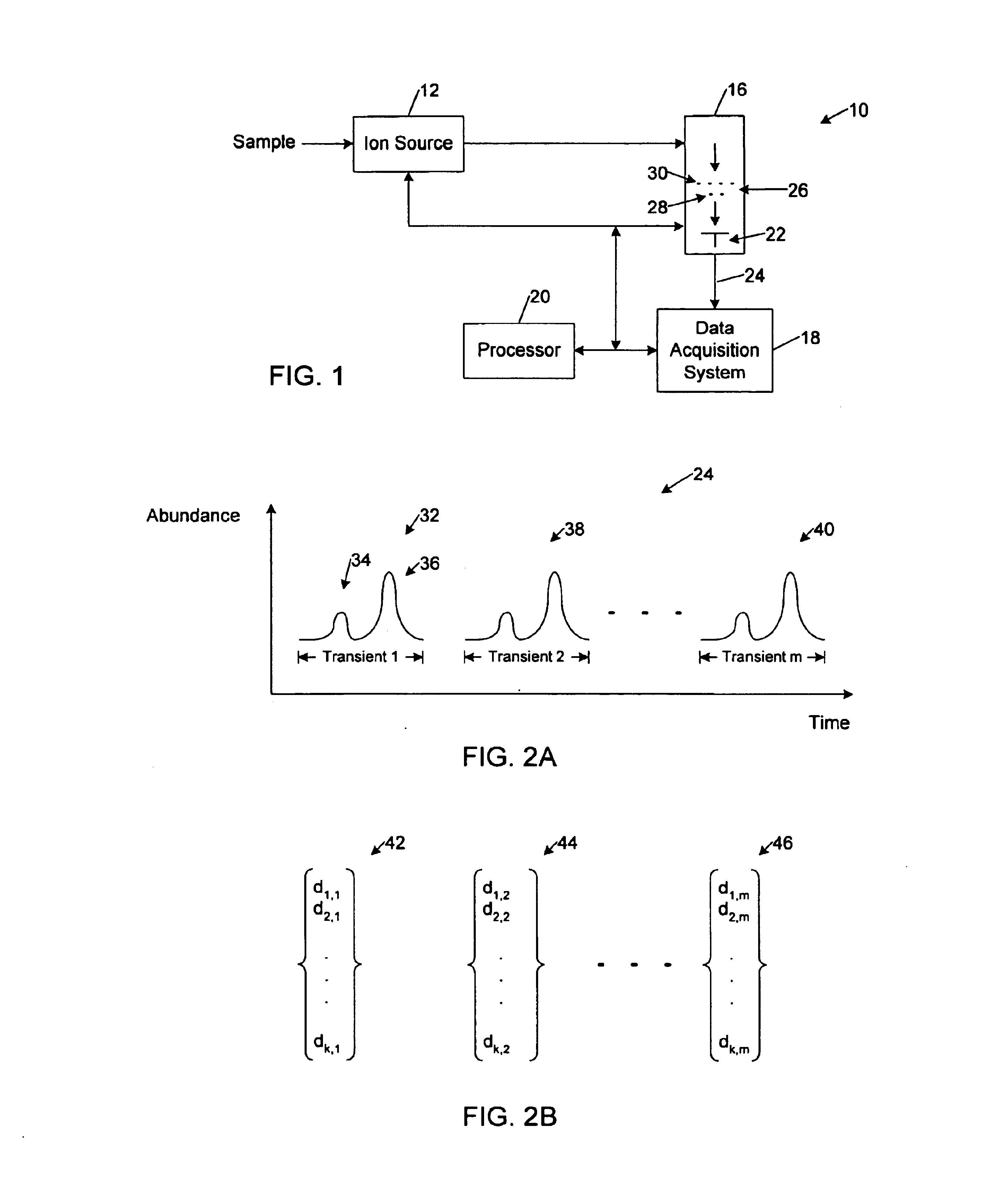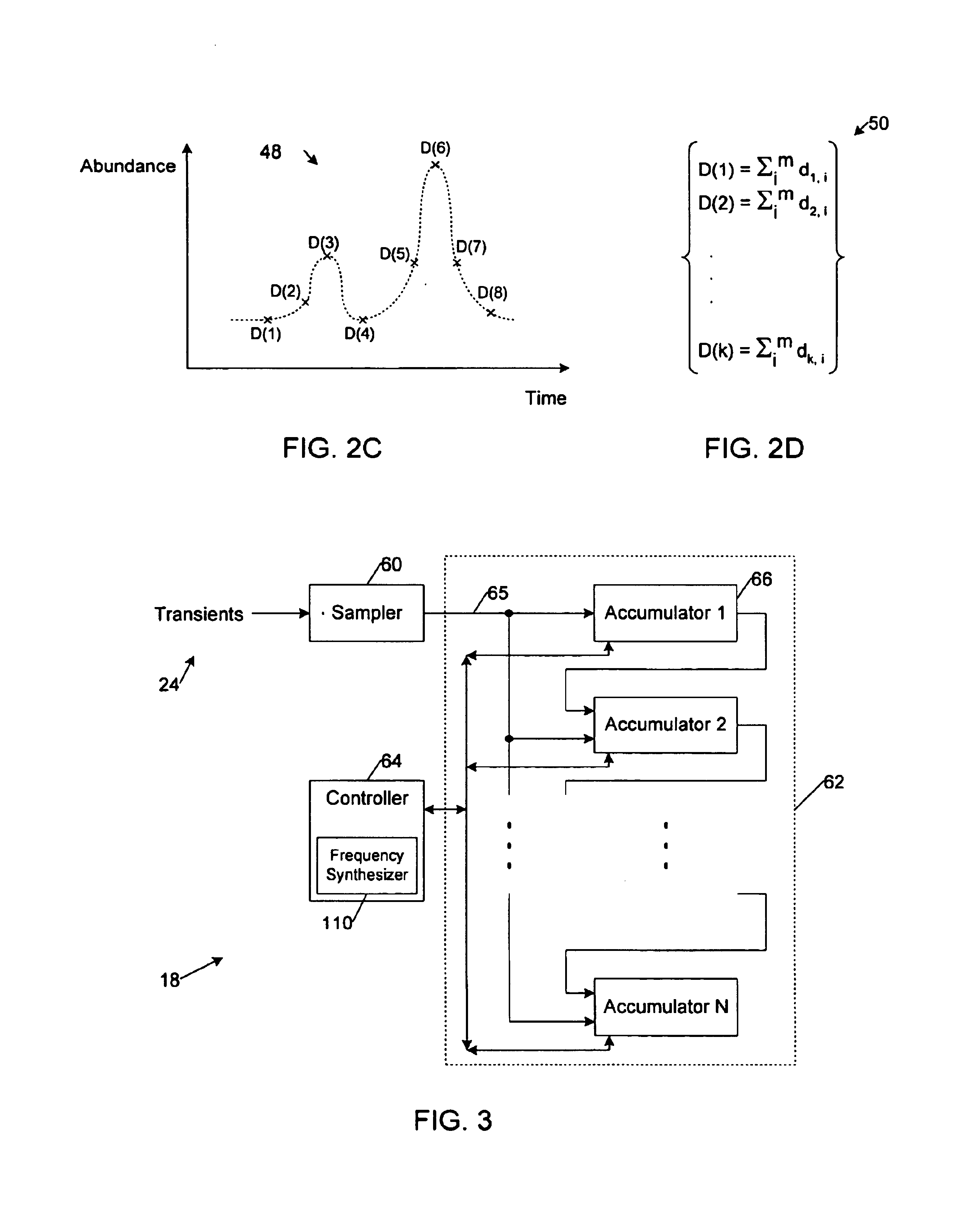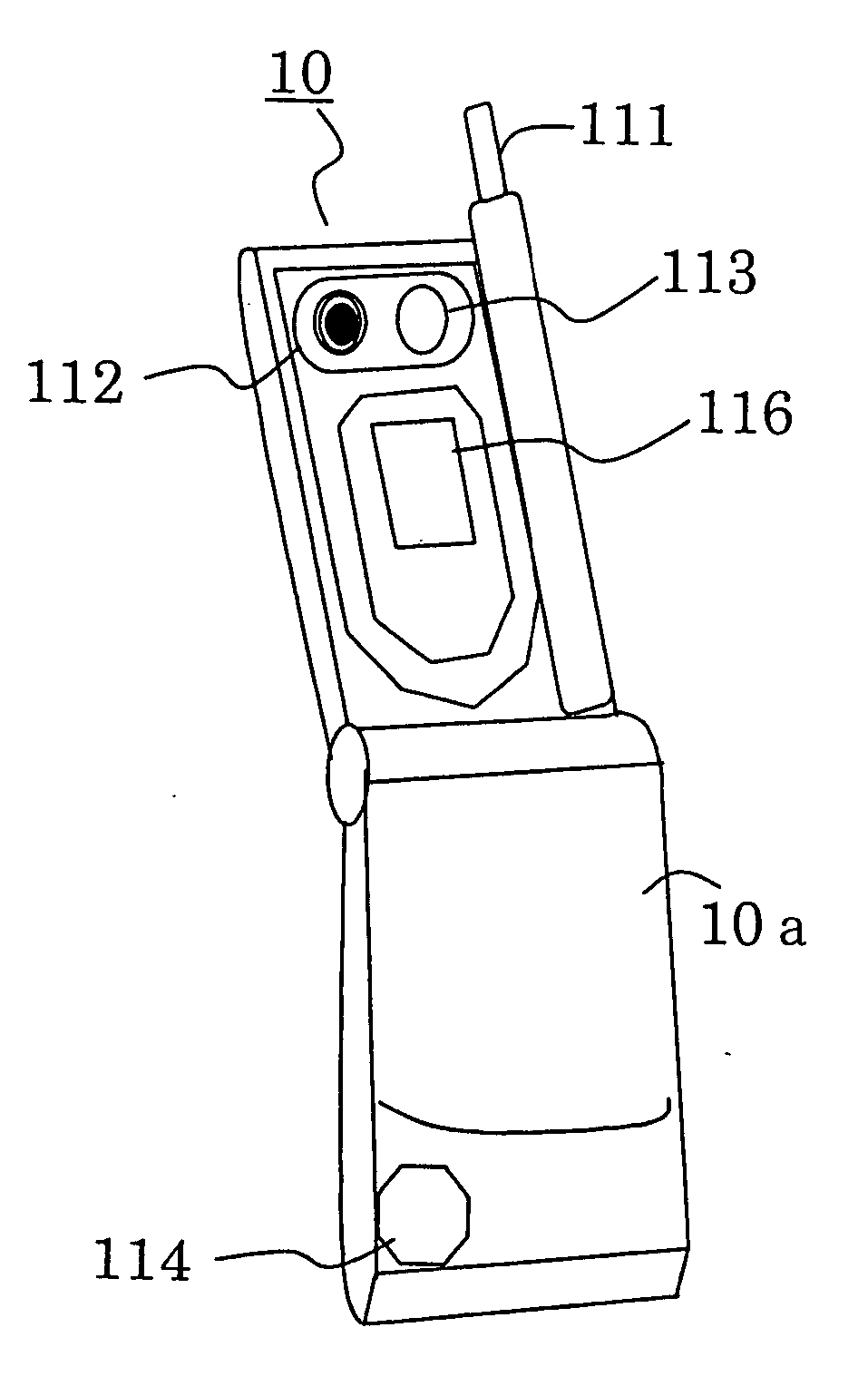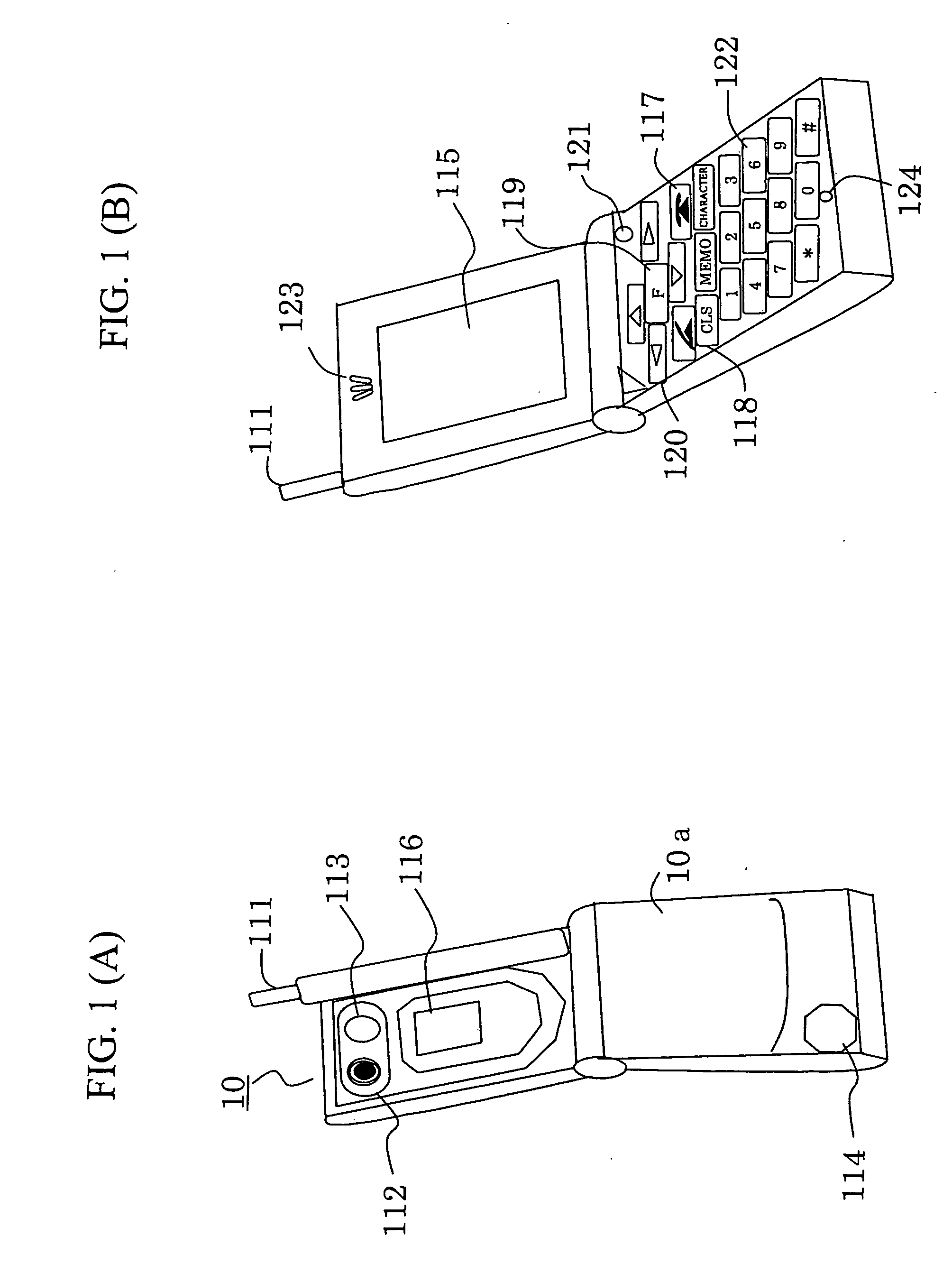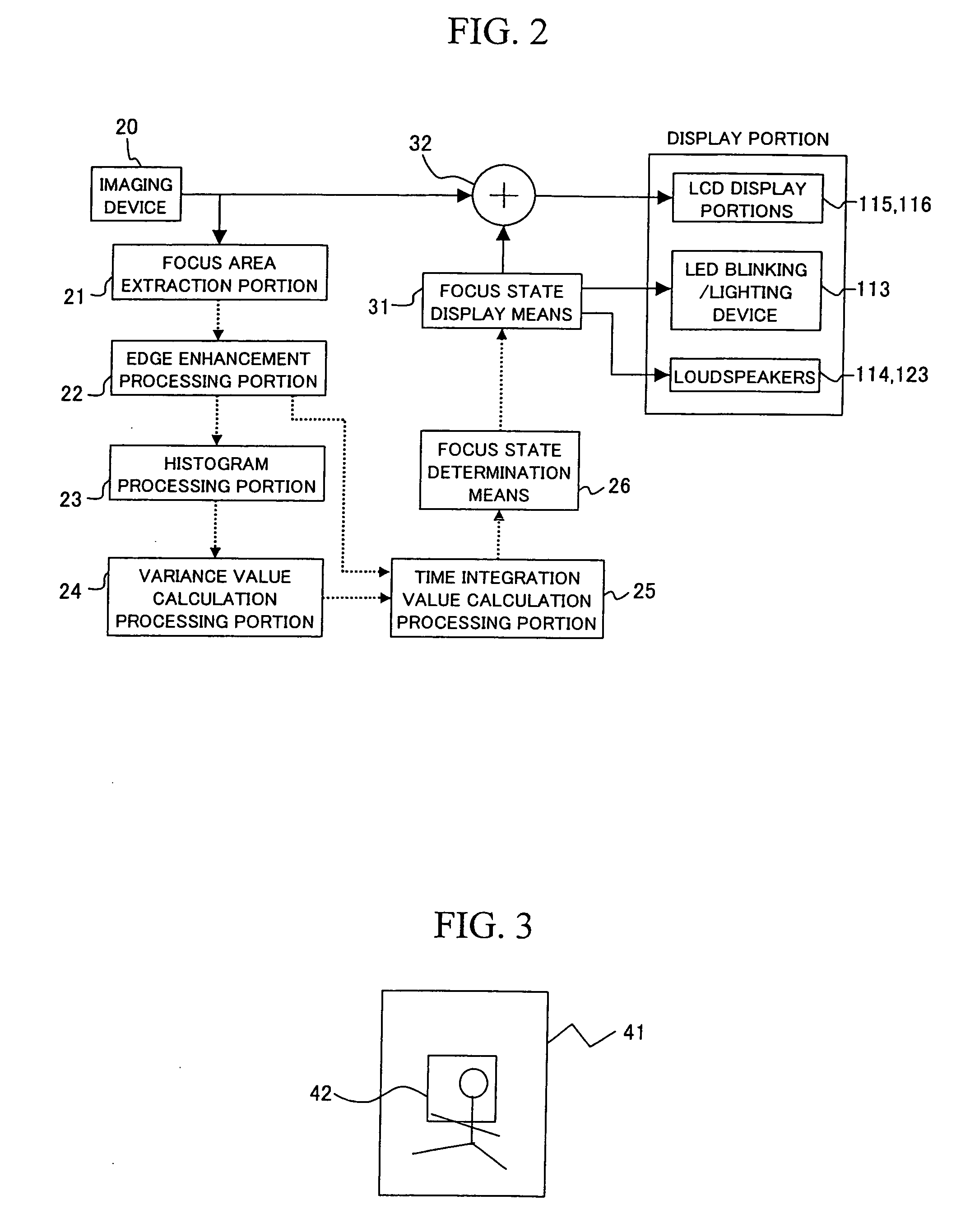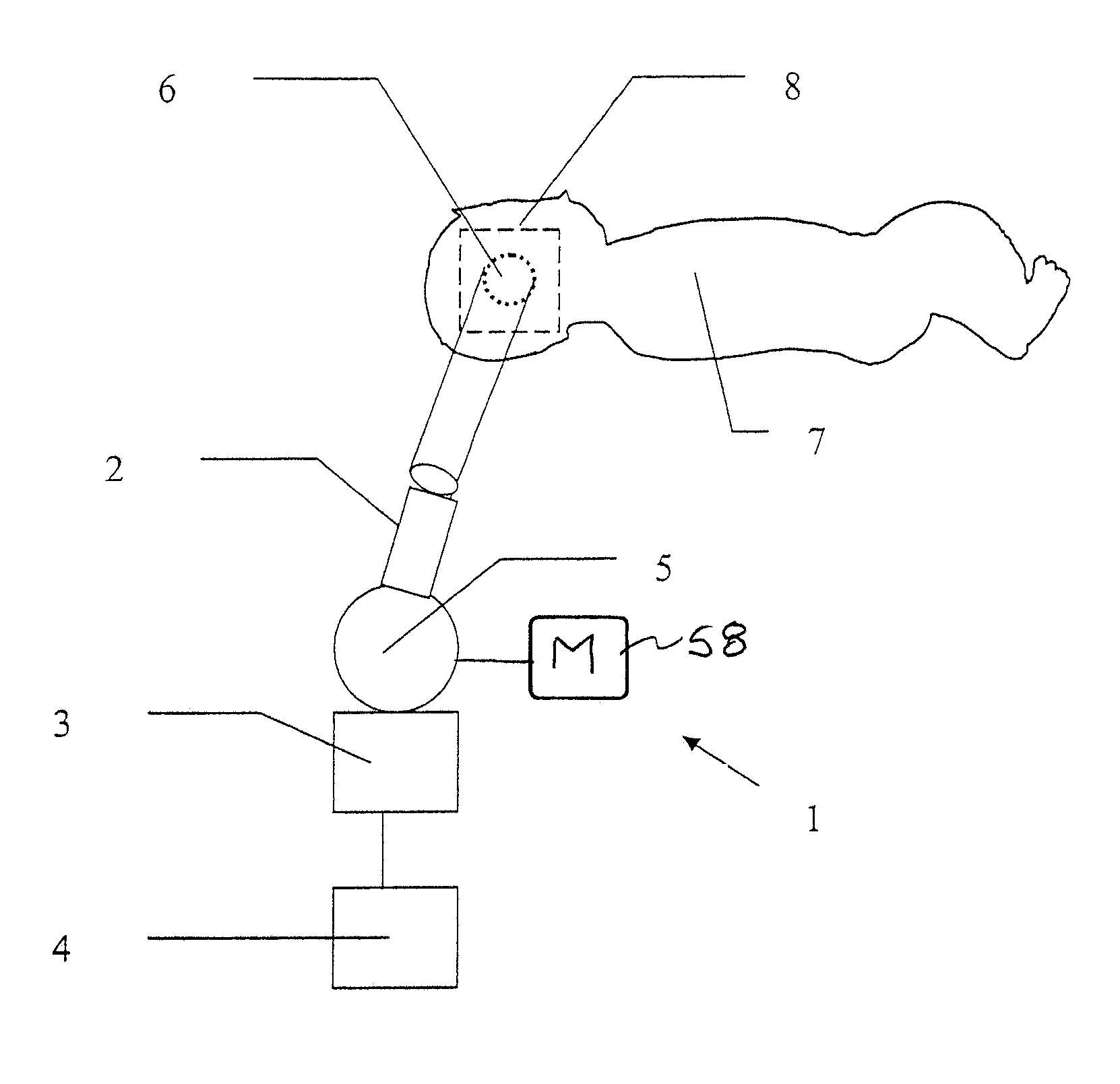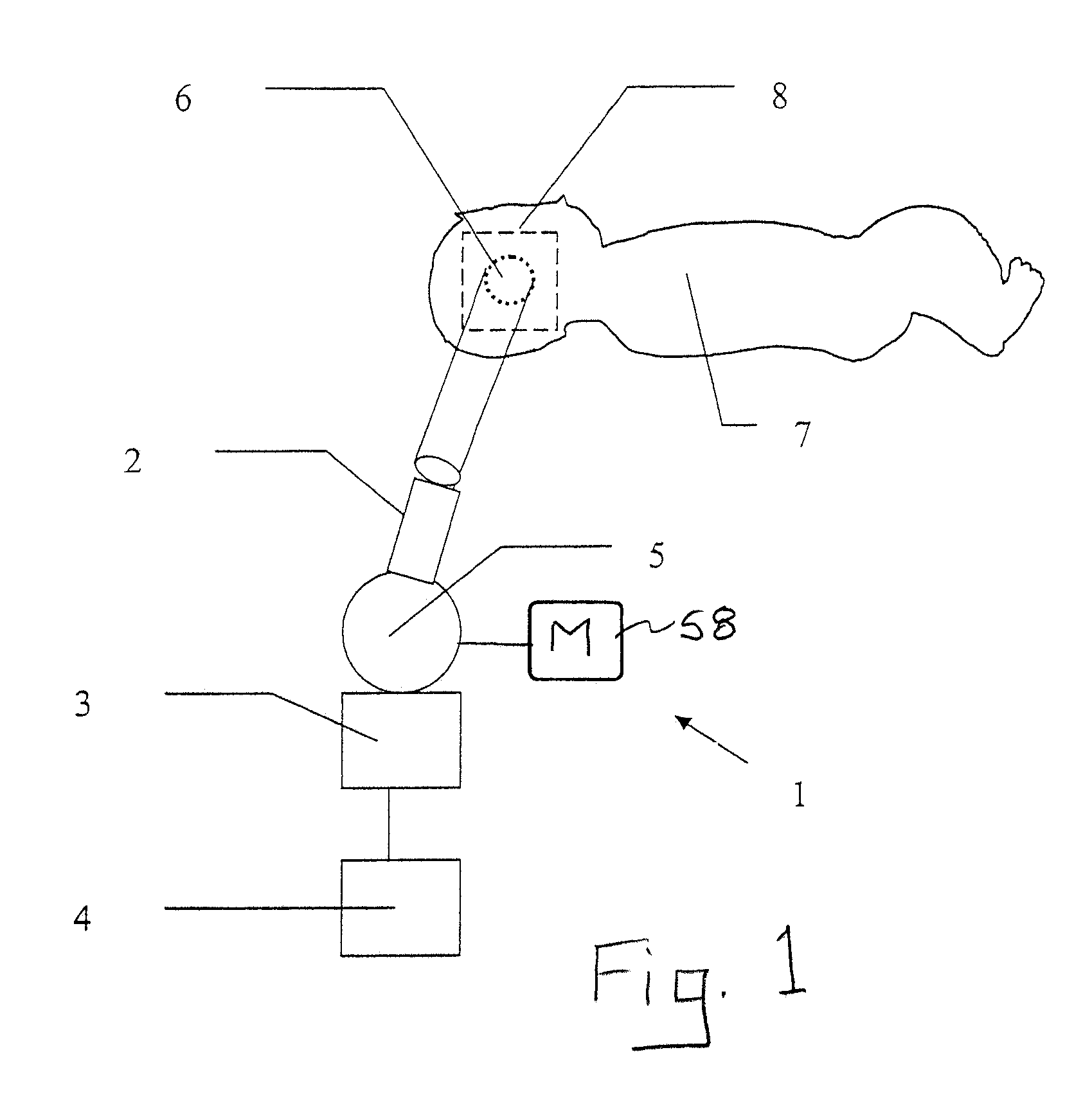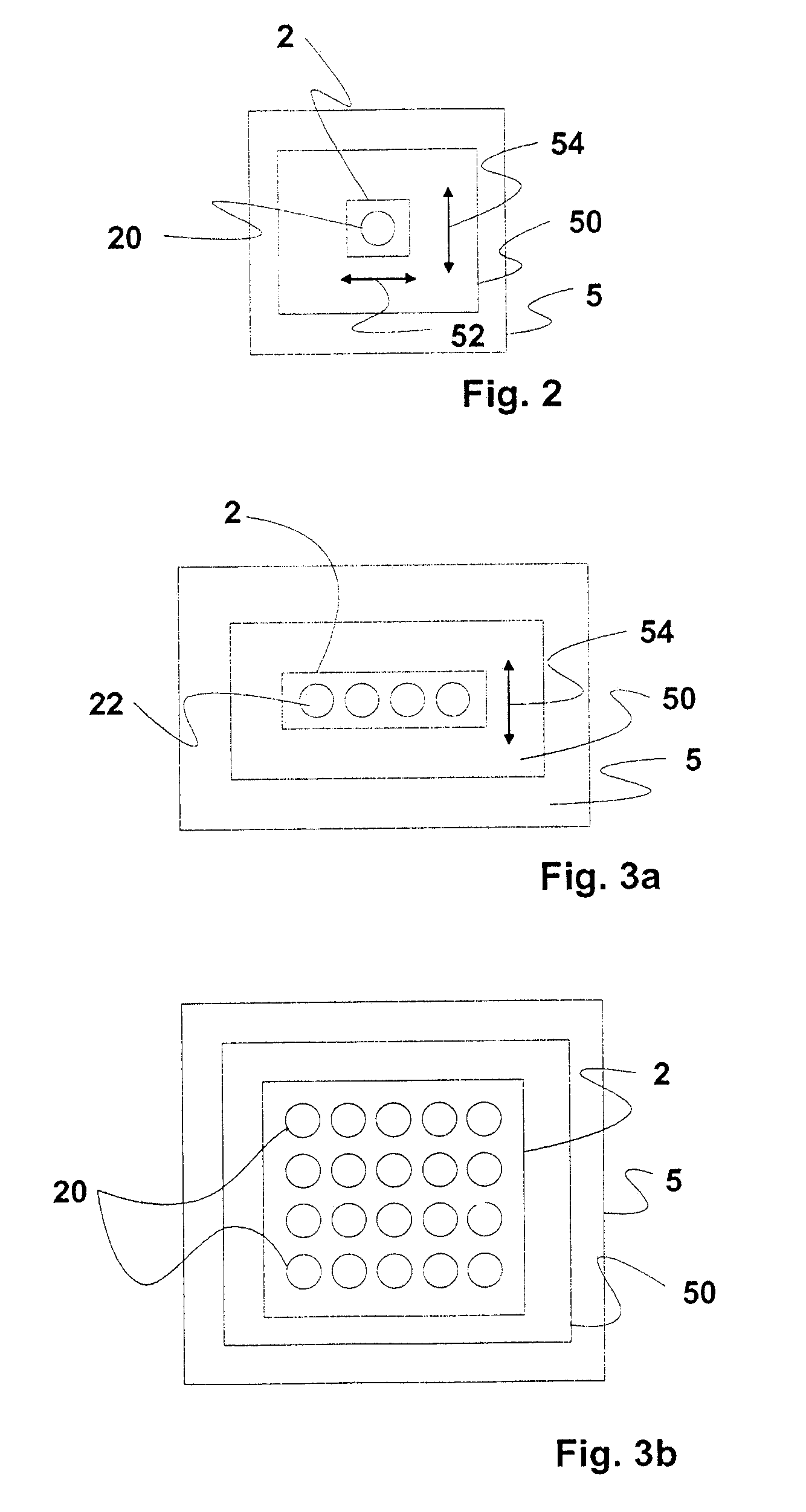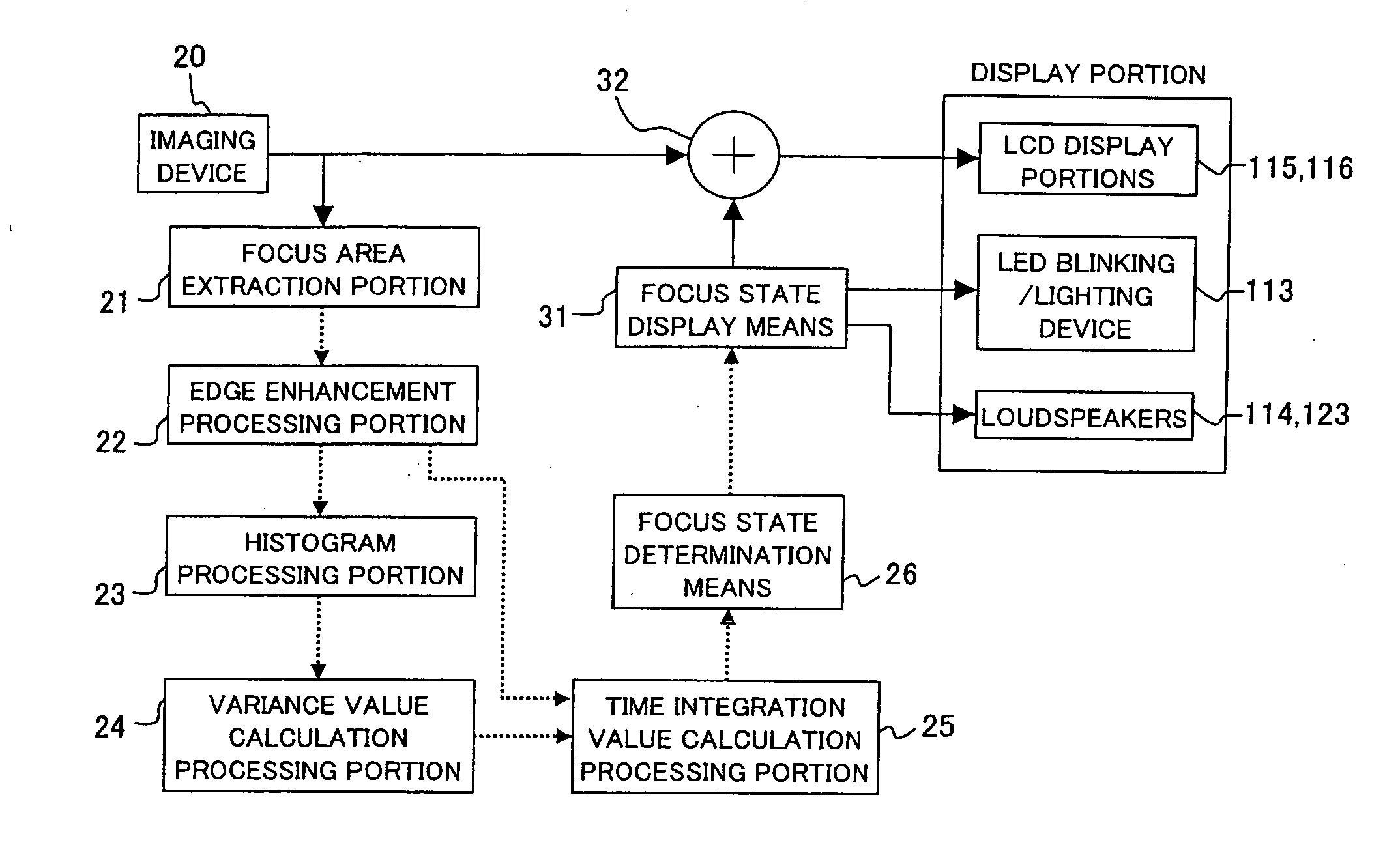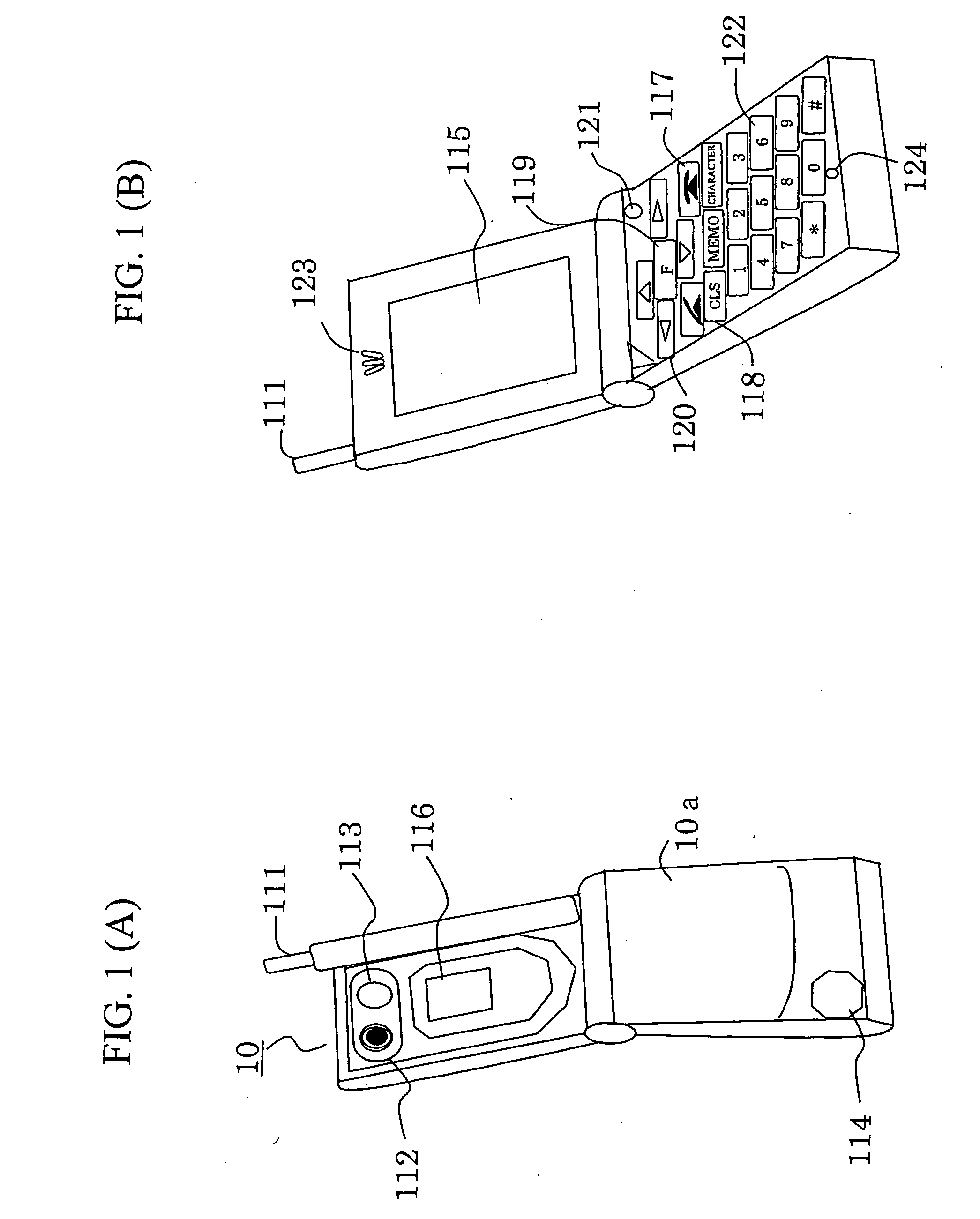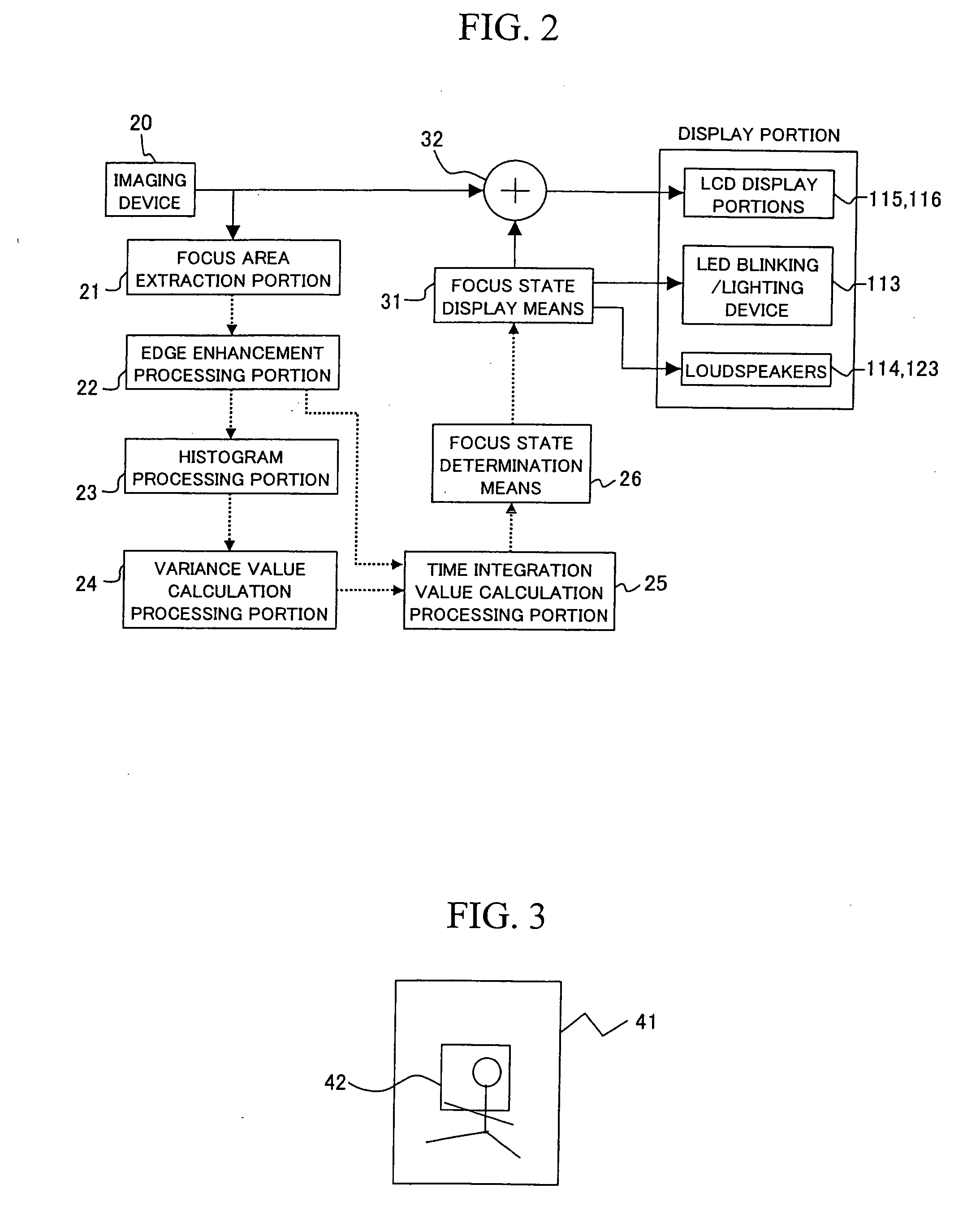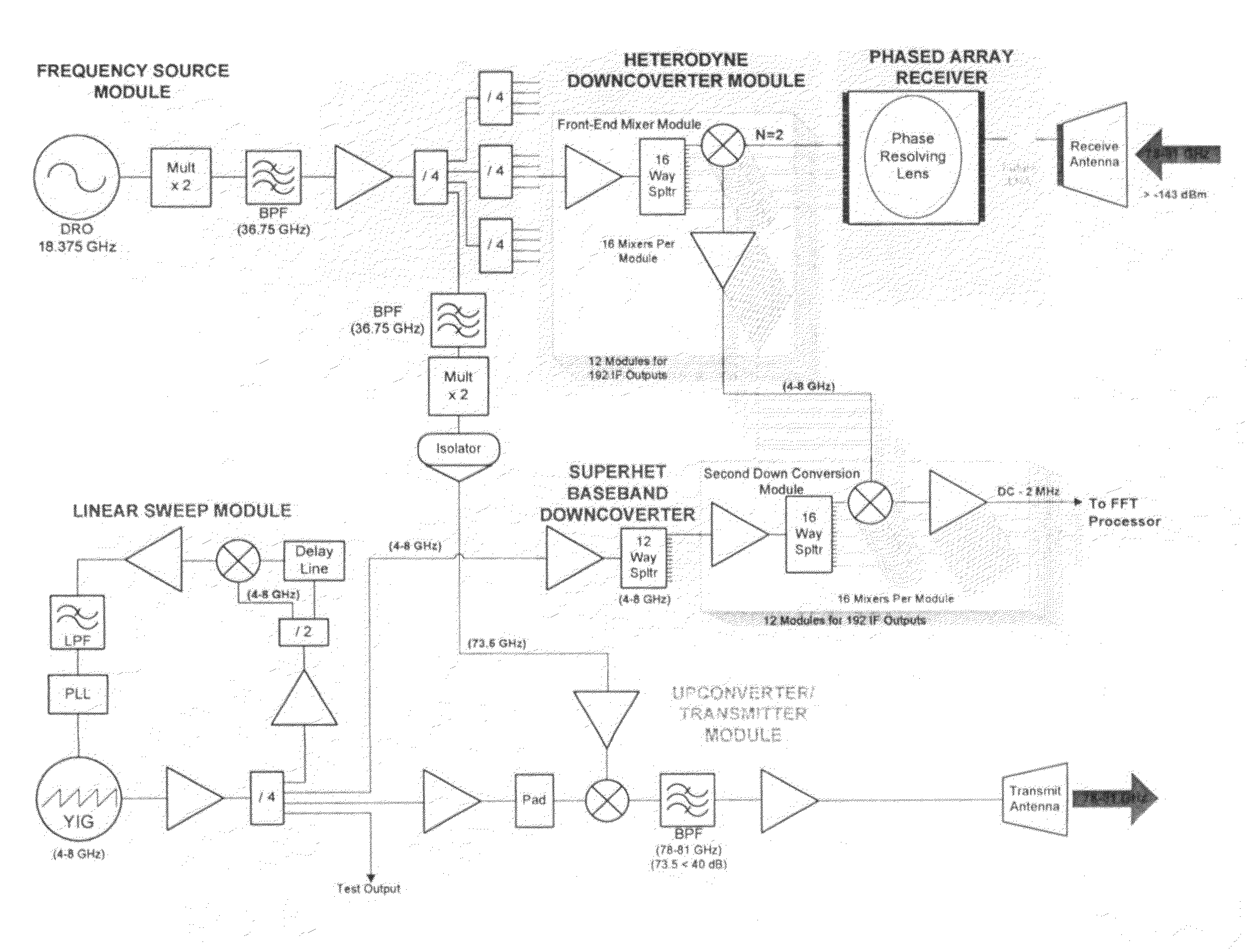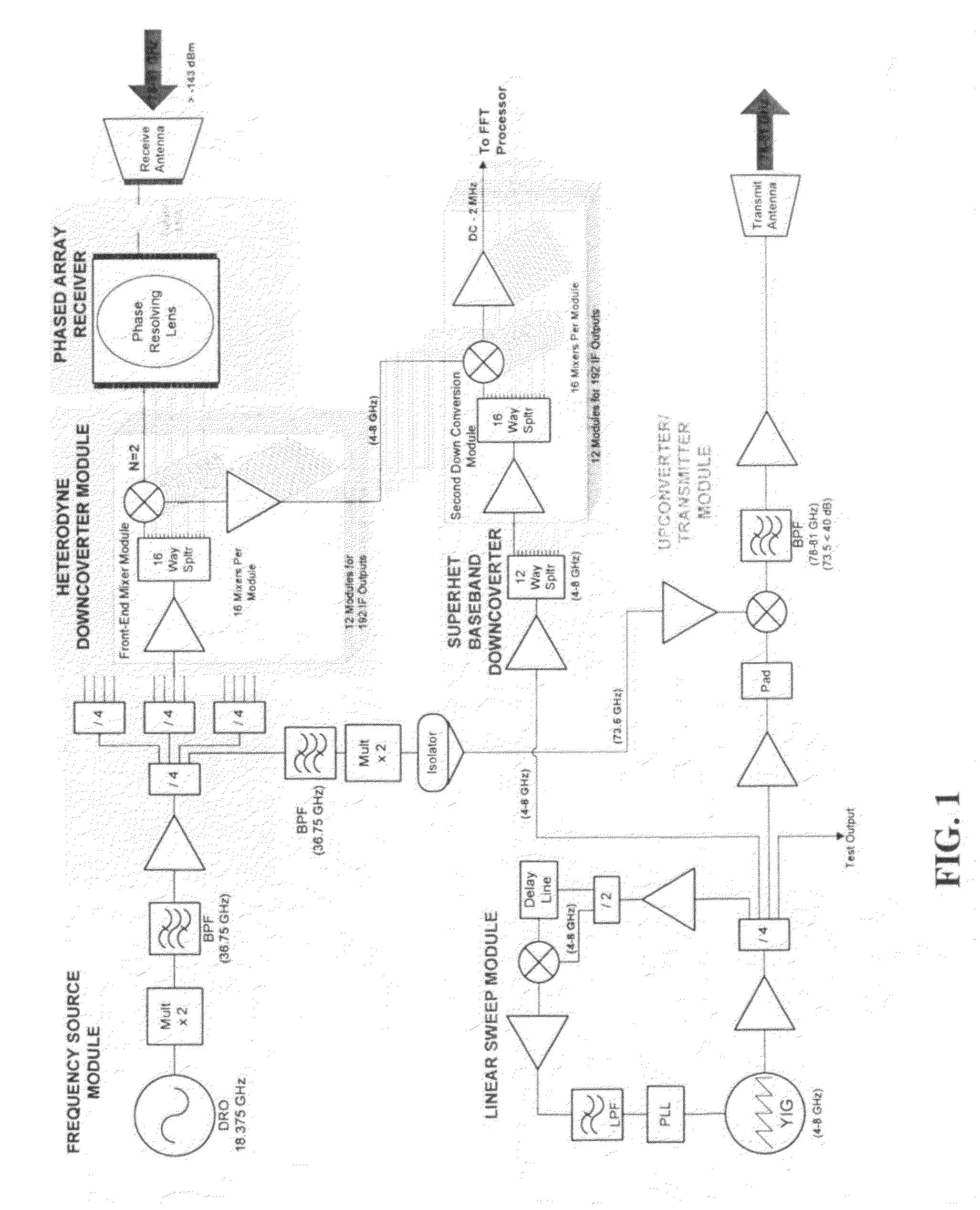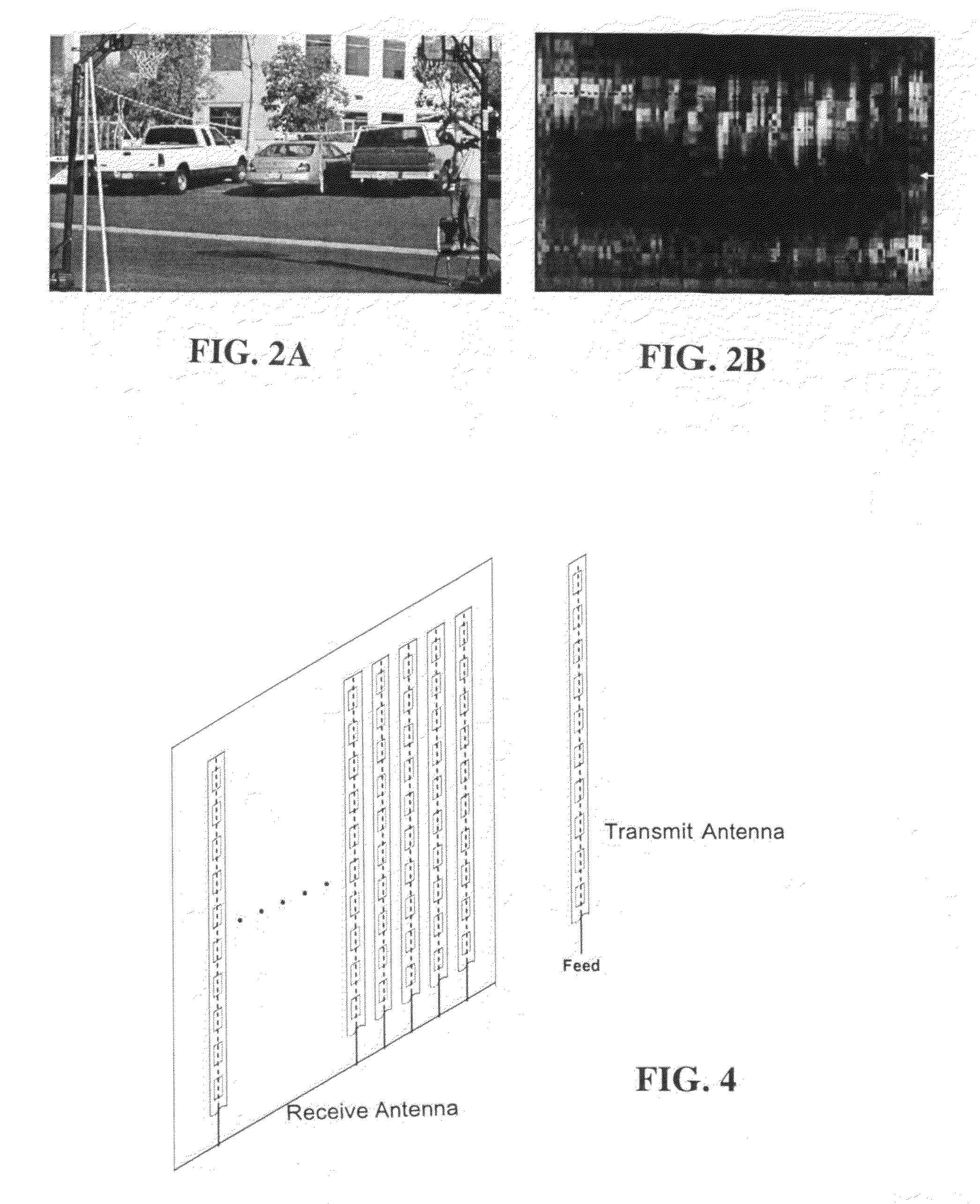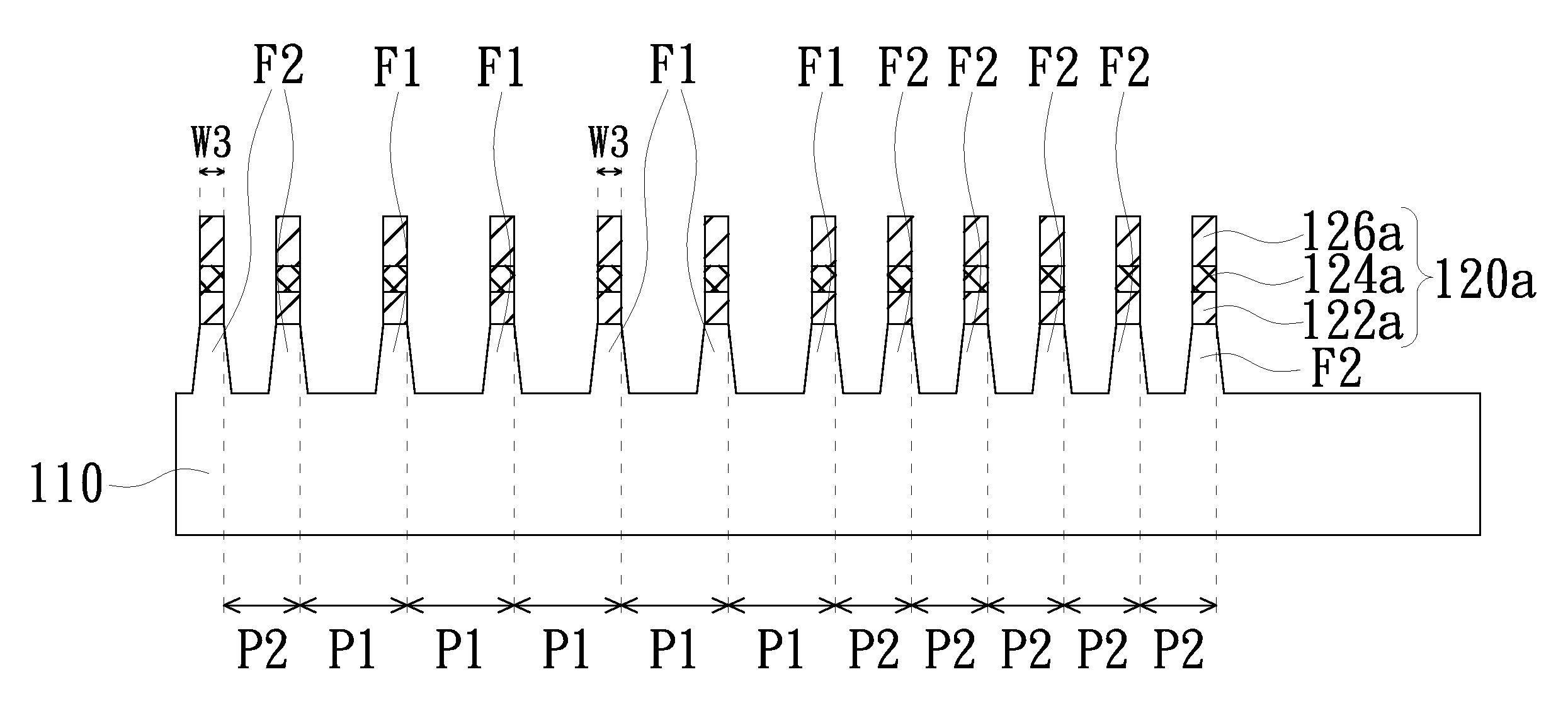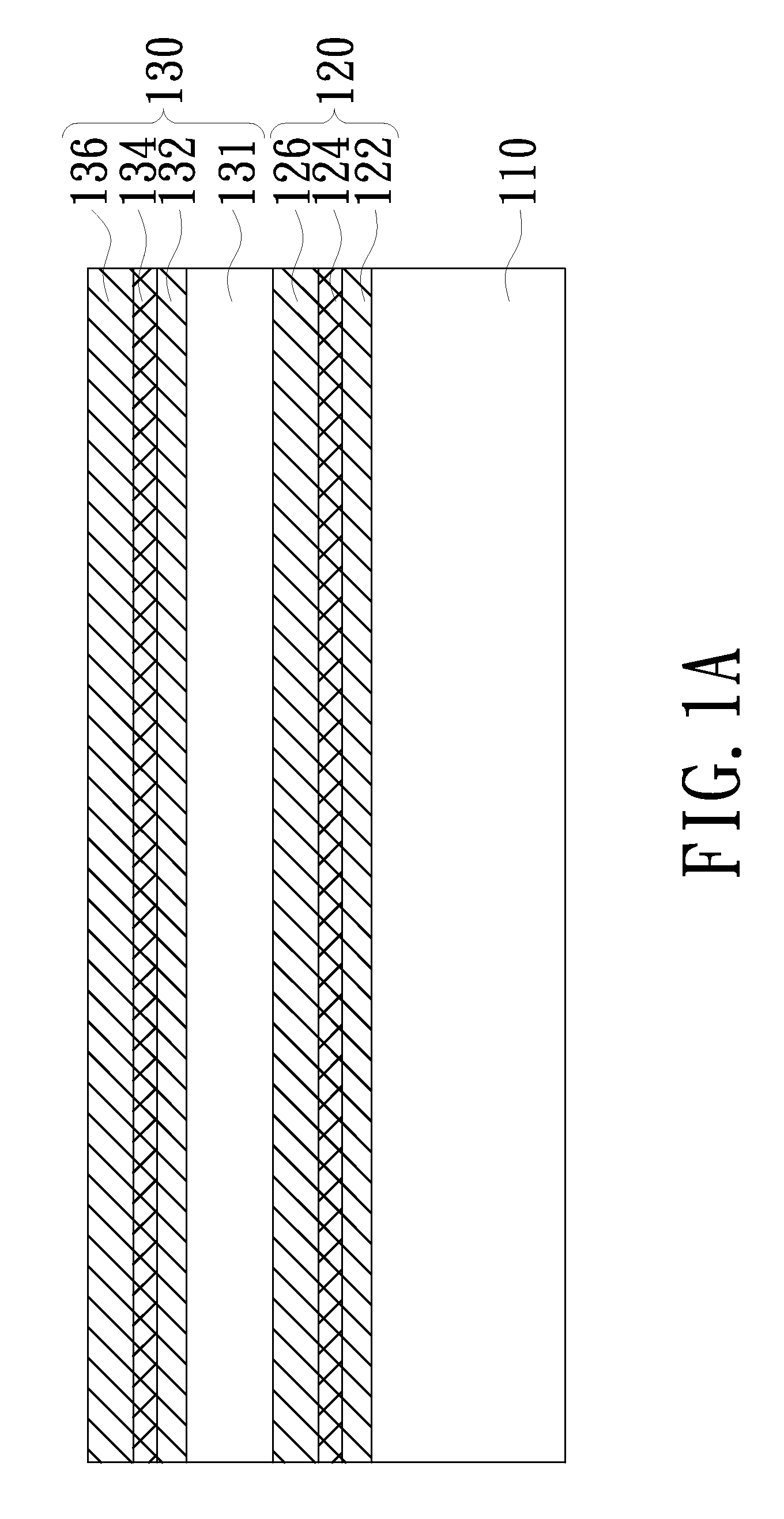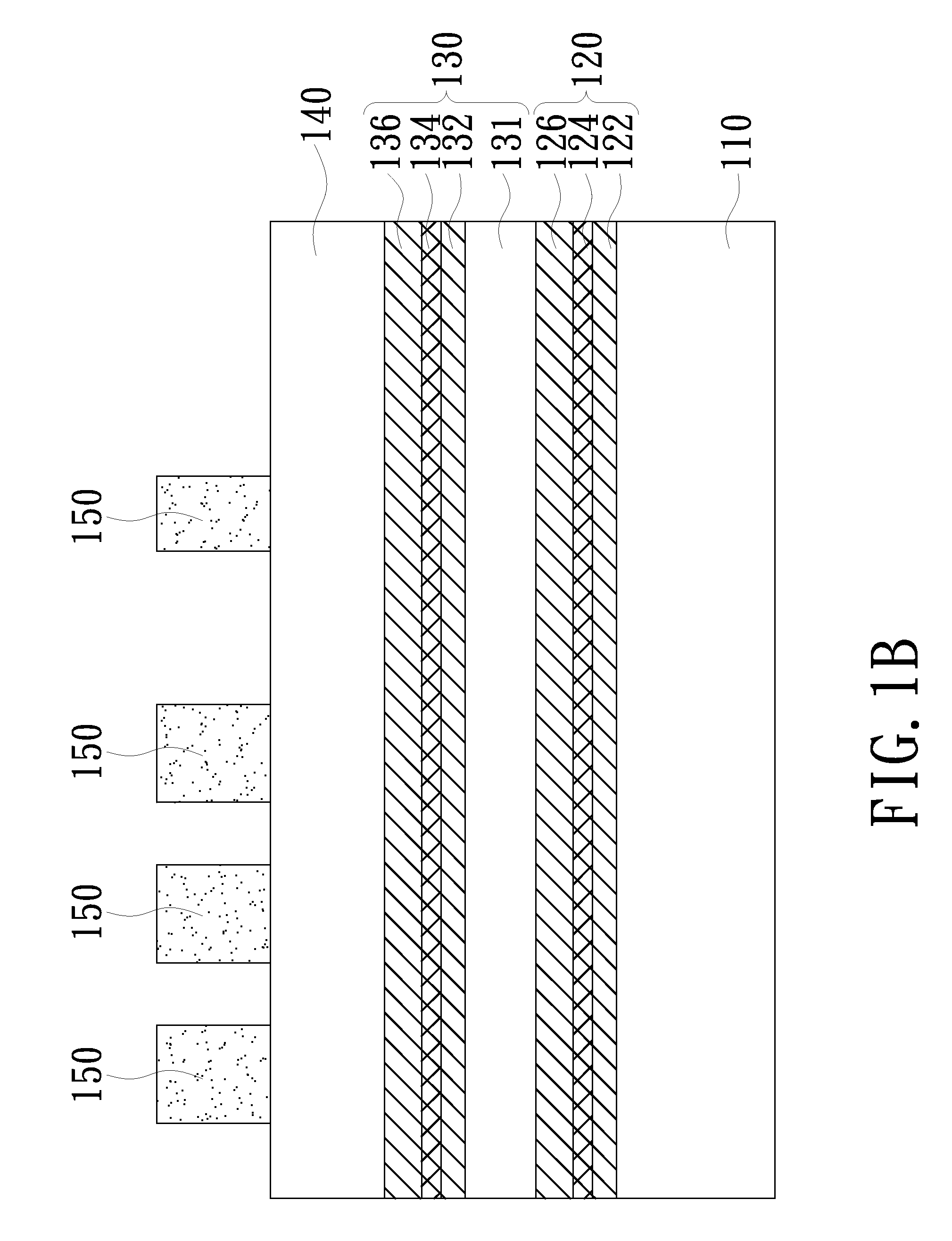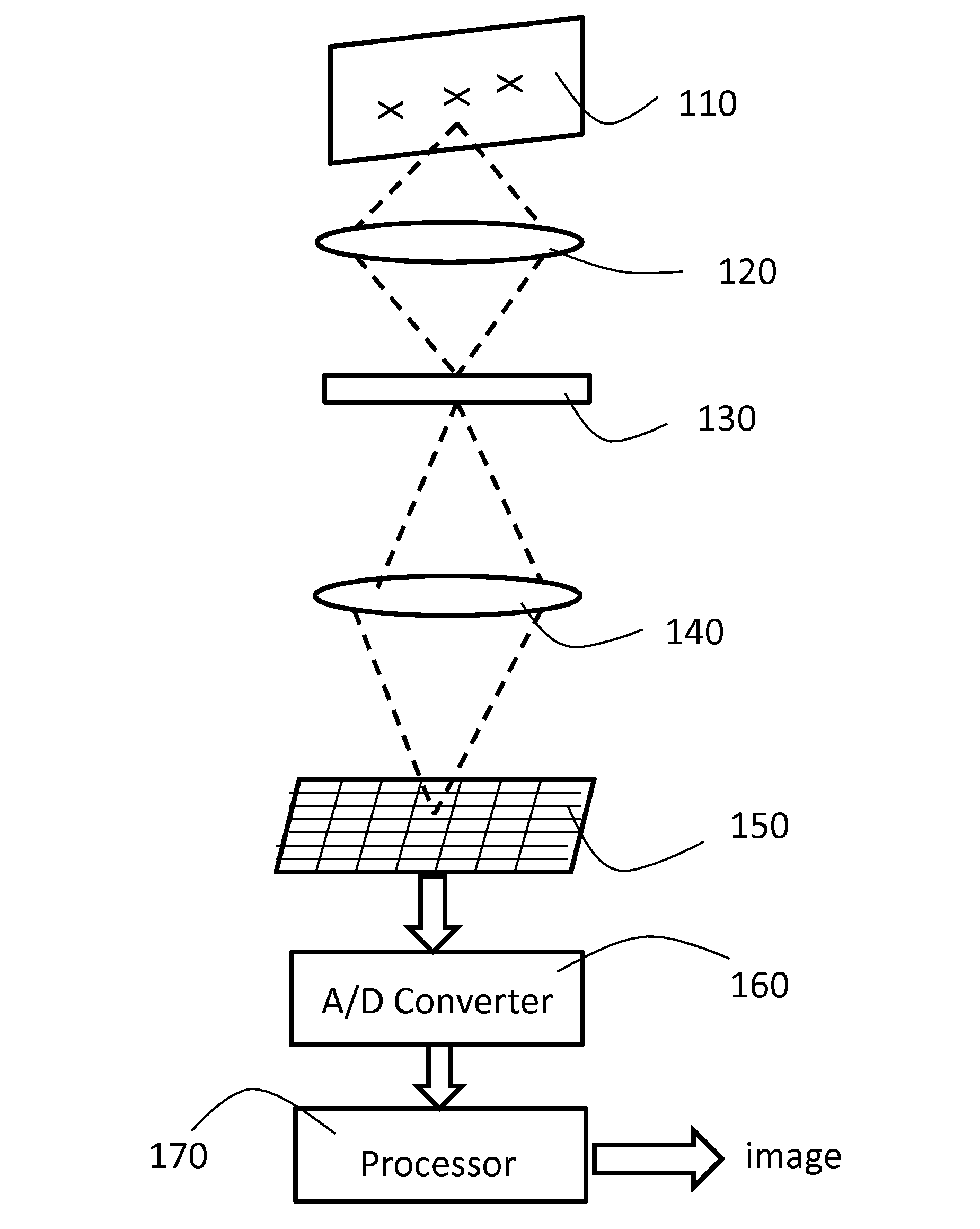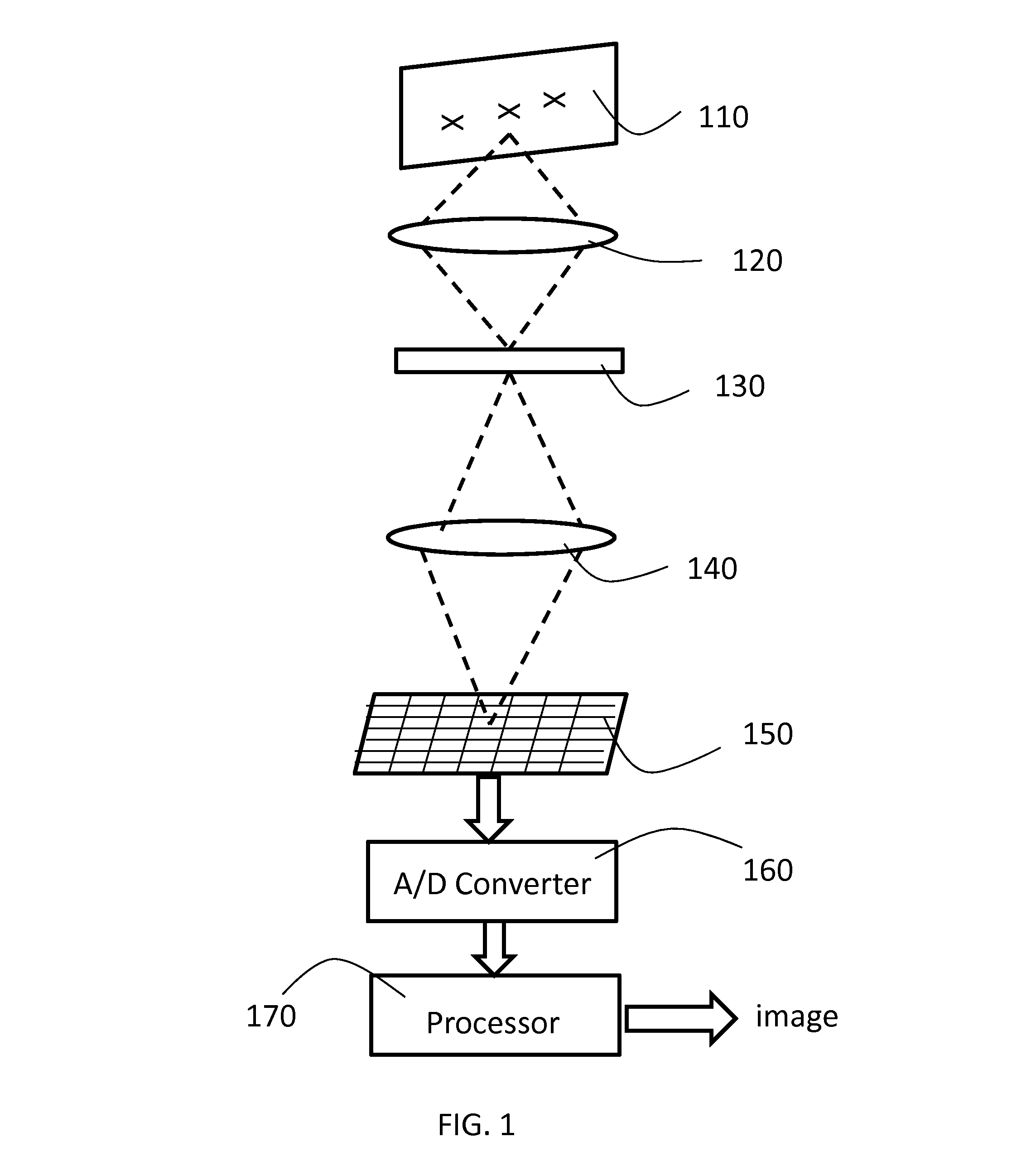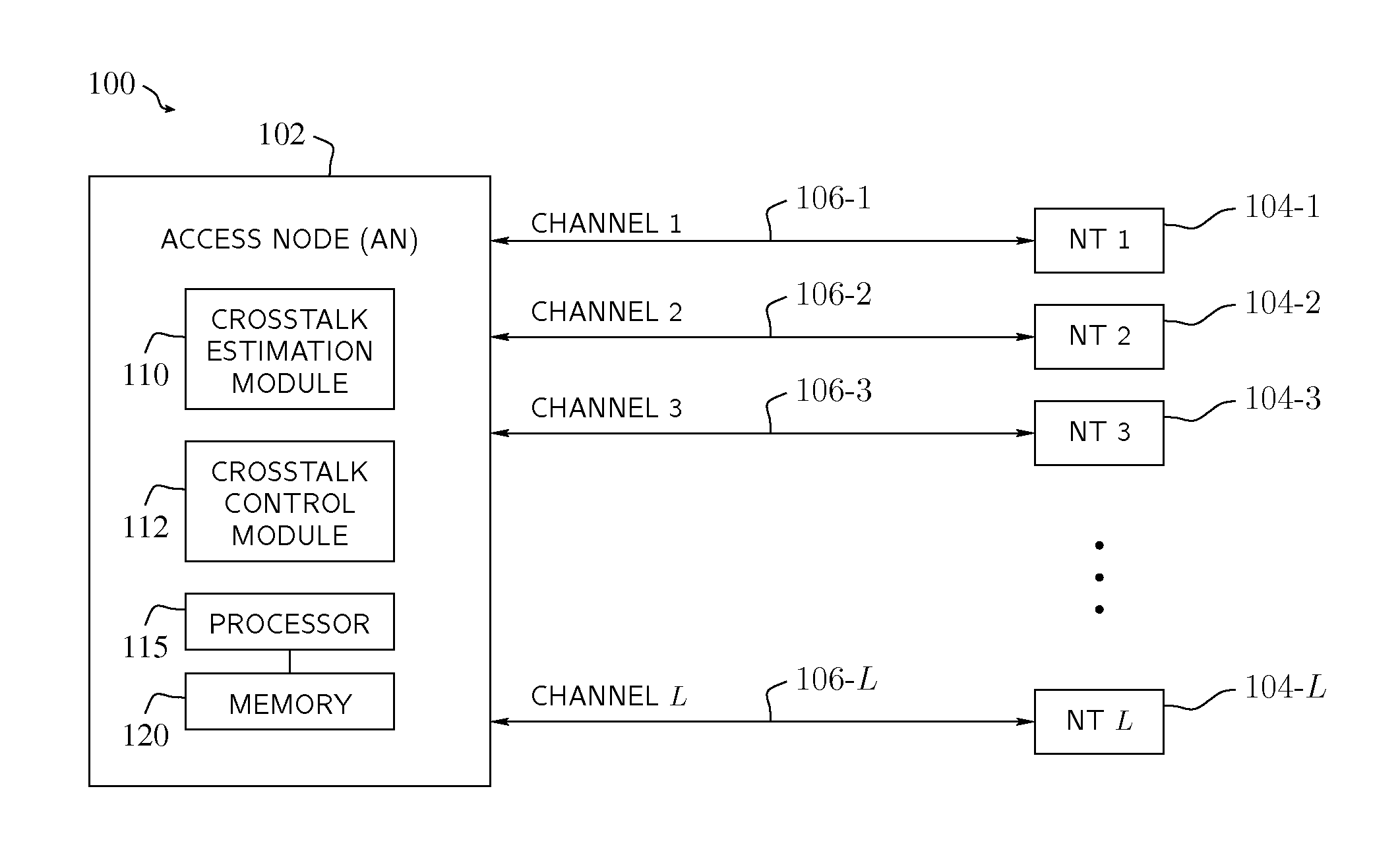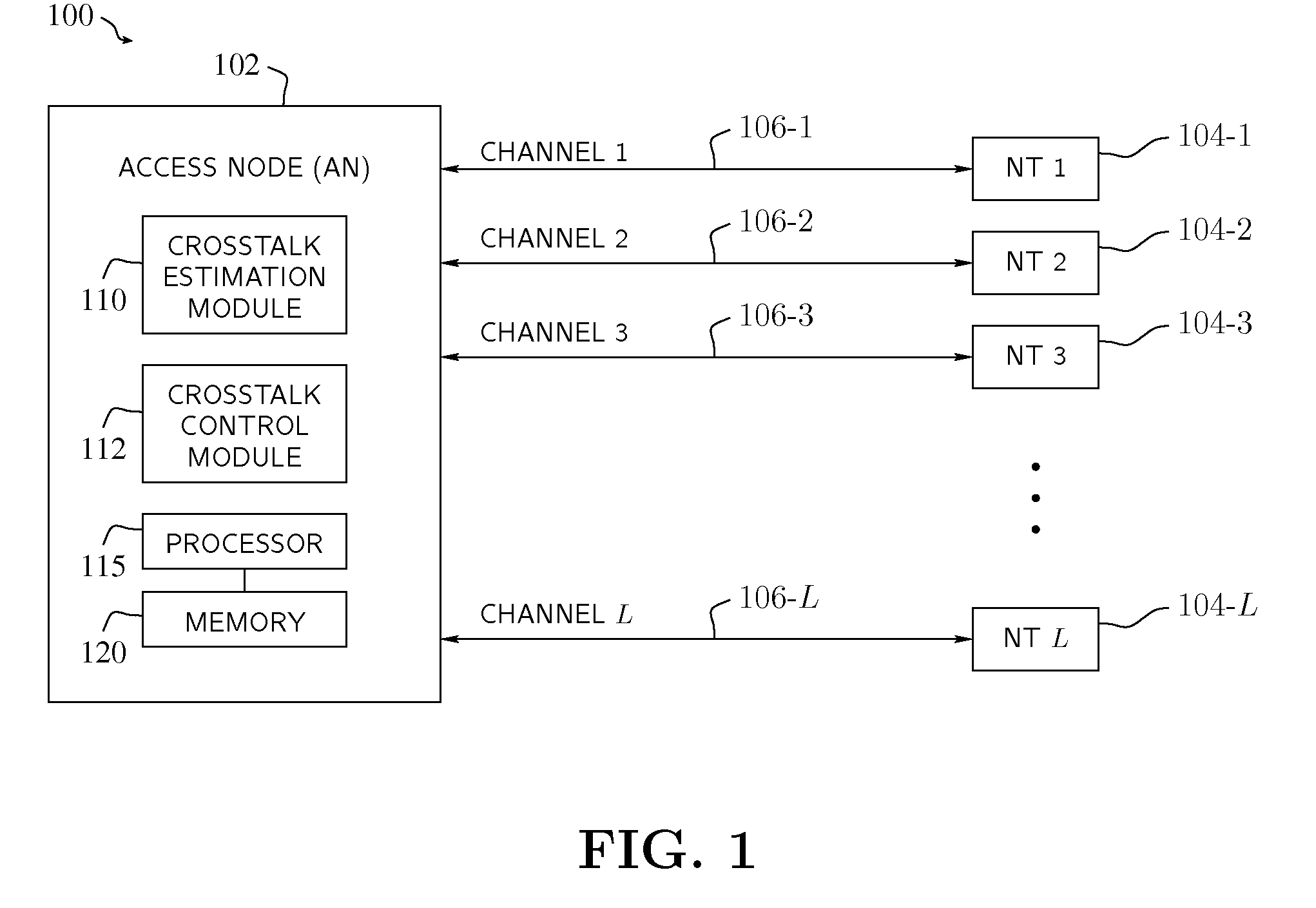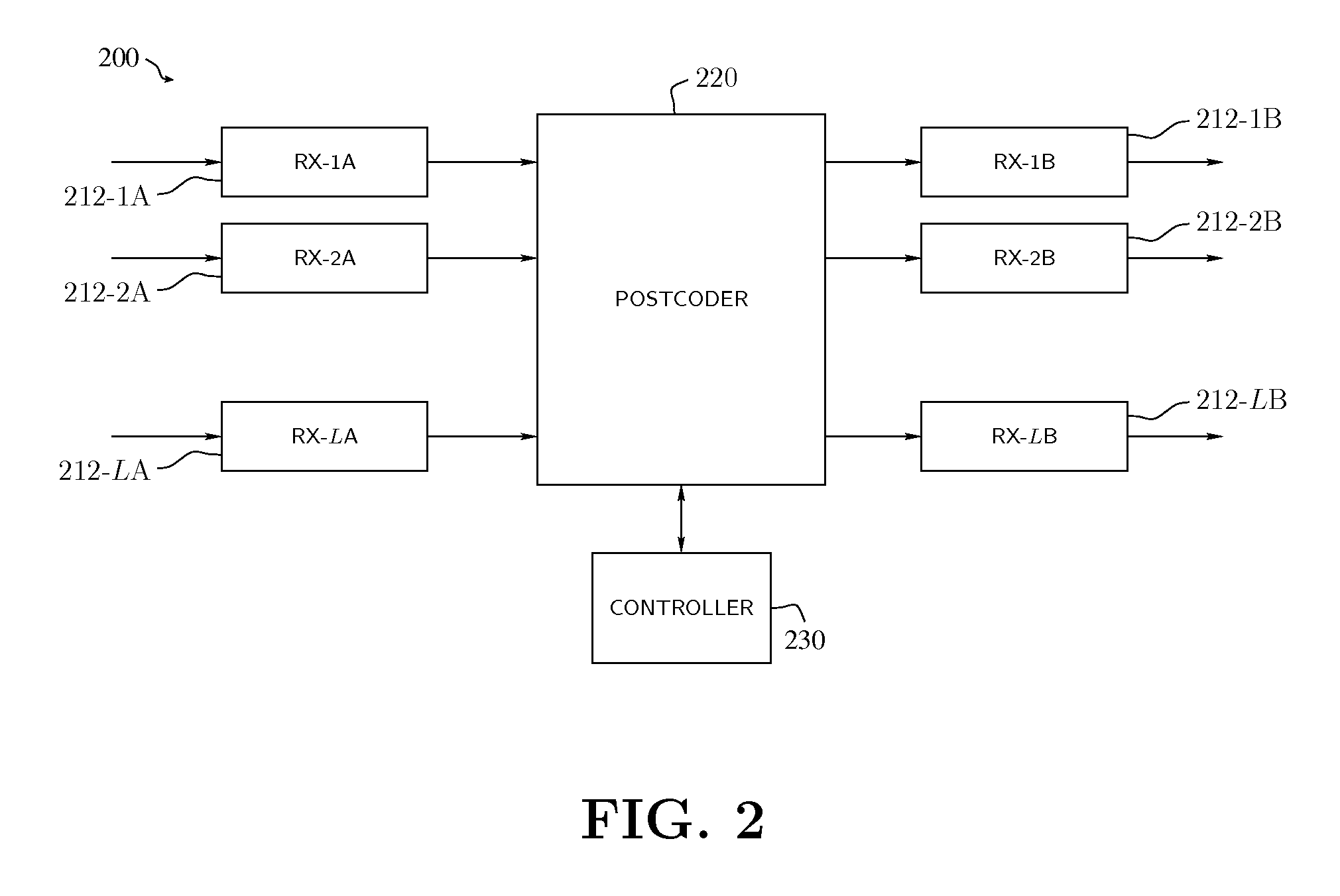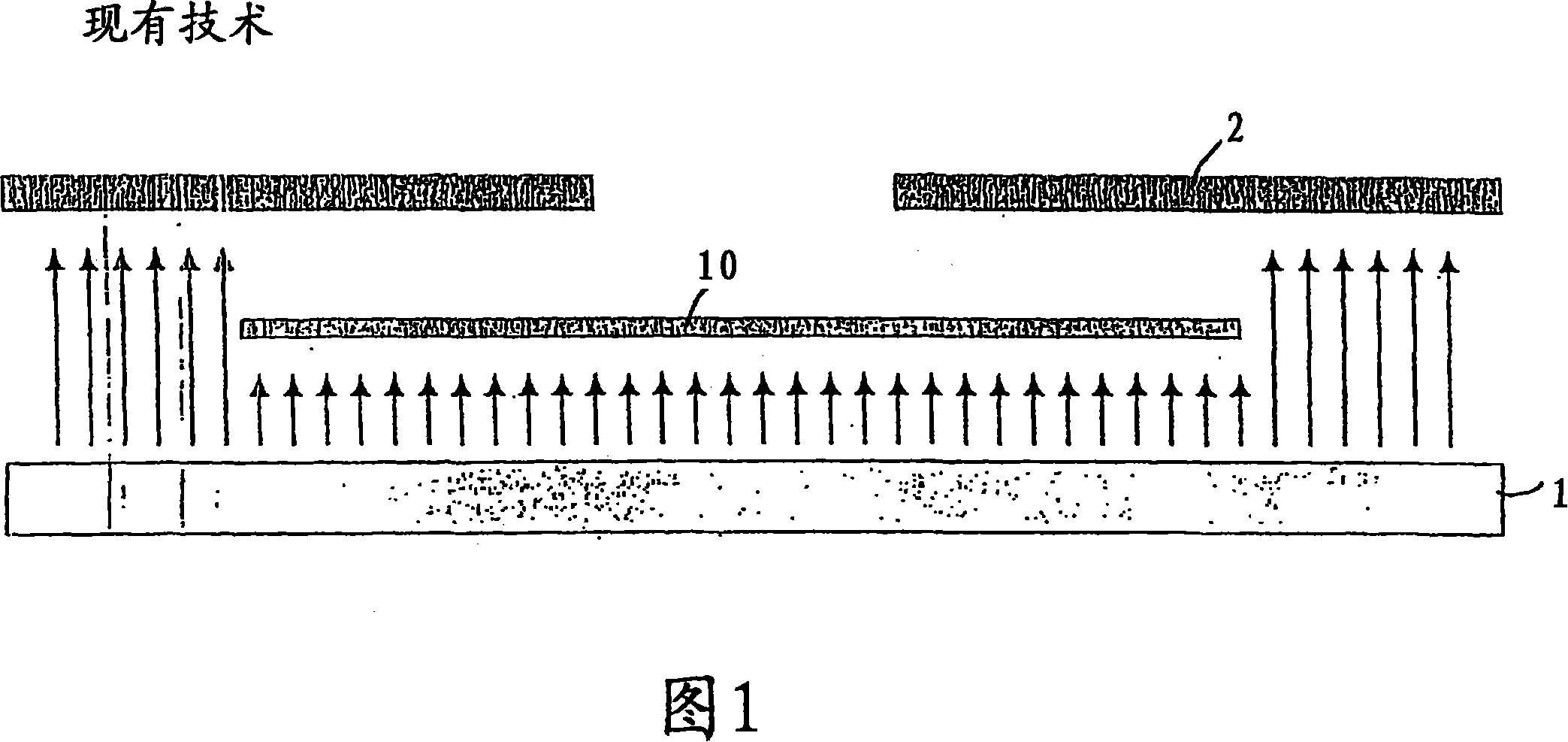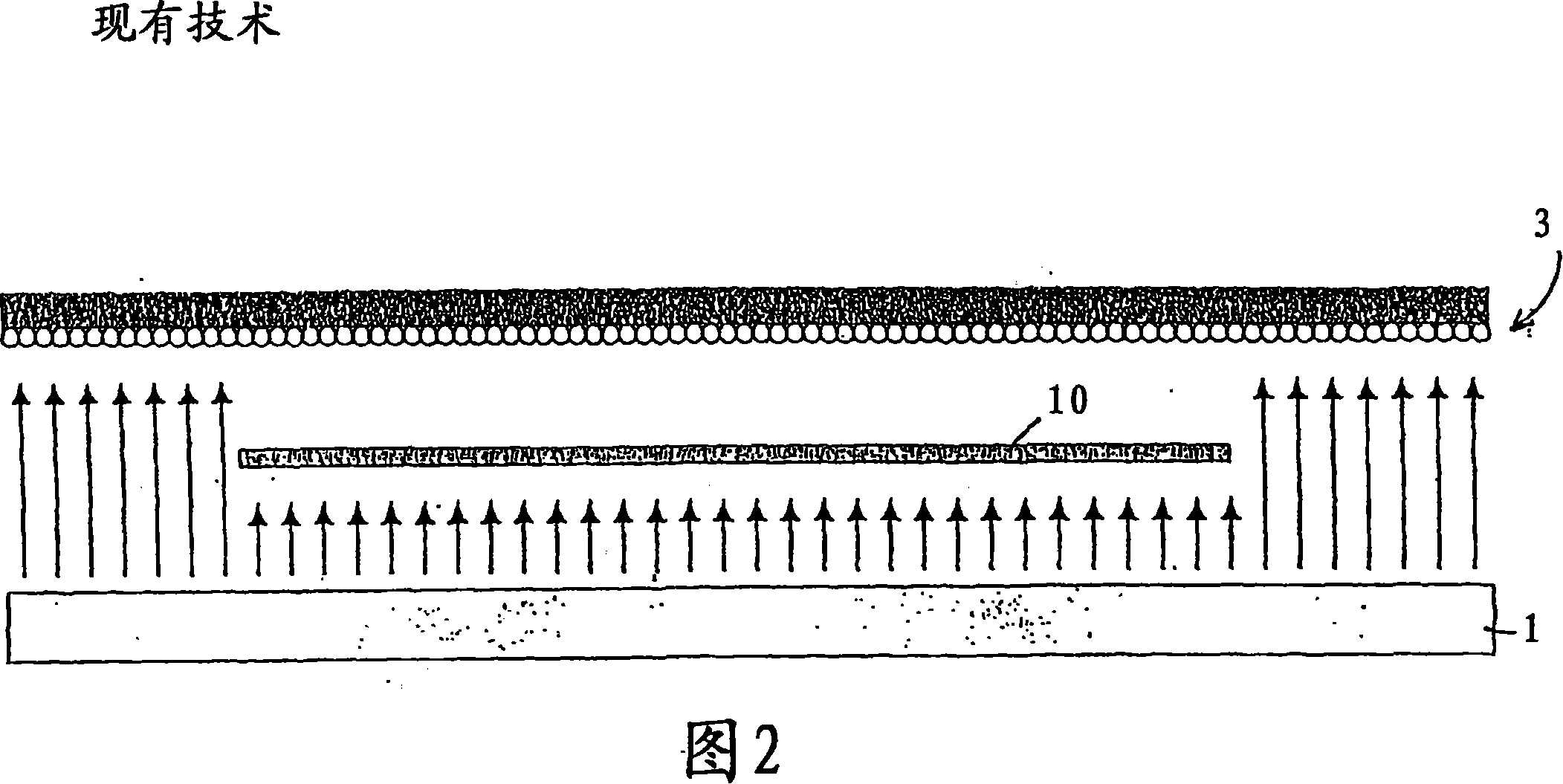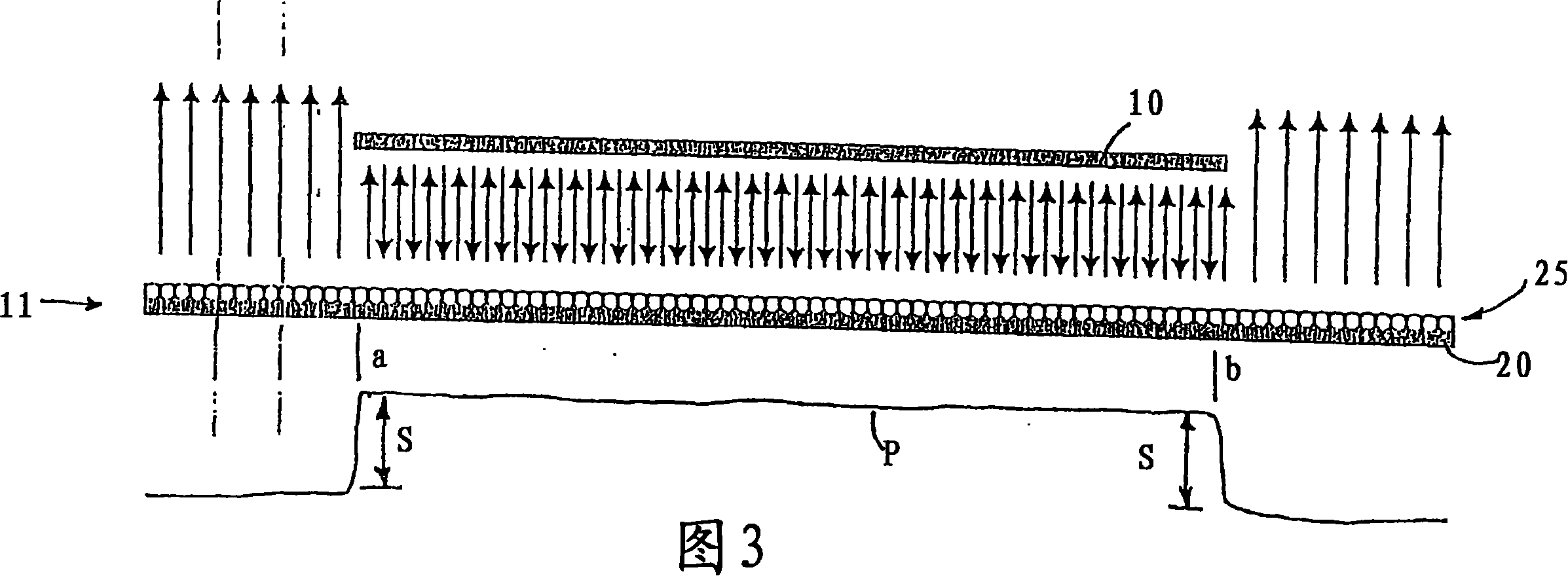Patents
Literature
129results about How to "Limited resolution" patented technology
Efficacy Topic
Property
Owner
Technical Advancement
Application Domain
Technology Topic
Technology Field Word
Patent Country/Region
Patent Type
Patent Status
Application Year
Inventor
Systems Using Eye Mounted Displays
ActiveUS20090189974A1Avoid and reduce interferenceVarious limitationCathode-ray tube indicatorsSteroscopic systemsCorneal surfaceEntire pupil
A display device is mounted on and / or inside the eye. The eye mounted display contains multiple sub-displays, each of which projects light to different retinal positions within a portion of the retina corresponding to the sub-display. The projected light propagates through the pupil but does not fill the entire pupil. In this way, multiple sub-displays can project their light onto the relevant portion of the retina. Moving from the pupil to the cornea, the projection of the pupil onto the cornea will be referred to as the corneal aperture. The projected light propagates through less than the full corneal aperture. The sub-displays use spatial multiplexing at the corneal surface. Various electronic devices interface to the eye mounted display.
Owner:TECTUS CORP
Systems using eye mounted displays
ActiveUS8786675B2Avoid and reduce interferenceVarious limitationNon-optical adjunctsCathode-ray tube indicatorsCorneal surfaceEntire pupil
A display device is mounted on and / or inside the eye. The eye mounted display contains multiple sub-displays, each of which projects light to different retinal positions within a portion of the retina corresponding to the sub-display. The projected light propagates through the pupil but does not fill the entire pupil. In this way, multiple sub-displays can project their light onto the relevant portion of the retina. Moving from the pupil to the cornea, the projection of the pupil onto the cornea will be referred to as the corneal aperture. The projected light propagates through less than the full corneal aperture. The sub-displays use spatial multiplexing at the corneal surface. Various electronic devices interface to the eye mounted display.
Owner:TECTUS CORP
Eye Mounted Displays
InactiveUS20090189830A1Avoid and reduce interferenceVarious limitationCathode-ray tube indicatorsSteroscopic systemsCorneal surfaceEntire pupil
A display device is mounted on and / or inside the eye. The eye mounted display contains multiple sub-displays, each of which projects light to different retinal positions within a portion of the retina corresponding to the sub-display. The projected light propagates through the pupil but does not fill the entire pupil. In this way, multiple sub-displays can project their light onto the relevant portion of the retina. Moving from the pupil to the cornea, the projection of the pupil onto the cornea will be referred to as the corneal aperture. The projected light propagates through less than the full corneal aperture. The sub-displays use spatial multiplexing at the corneal surface.
Owner:TECTUS CORP
Focused state display device and focused state display method
ActiveUS20060146174A1Edge exclusionInhibition effectTelevision system detailsPrintersTime segmentImage resolution
A focus state display apparatus comprising focus area extraction means for extracting the image signals of a predetermined area from photographed image signals, edge enhancement processing means for enhancing the edge of the extracted image signals, time integration value calculation means for calculating an integration value of the edge-enhanced image signals in a certain period of time, focus state determination means for determining the focus state of the photographed image signals on the basis of the calculated integration value, and focus state display means for displaying the determined focus state. A user is capable of readily determining the focus state of a camera and confirming and adjusting the focus thereof with accuracy even in a display apparatus of a camera-equipped portable terminal device, where the size and resolution thereof are limited.
Owner:SHARP KK
Eye Mounted Displays and Systems Using Eye Mounted Displays
ActiveUS20150049004A1Avoid and reduce interferenceOvercome limitationsImage analysisGeometric image transformationCorneal surfaceEntire pupil
A display device is mounted on and / or inside the eye. The eye mounted display contains multiple sub-displays, each of which projects light to different retinal positions within a portion of the retina corresponding to the sub-display. The projected light propagates through the pupil but does not fill the entire pupil. In this way, multiple sub-displays can project their light onto the relevant portion of the retina. Moving from the pupil to the cornea, the projection of the pupil onto the cornea will be referred to as the corneal aperture. The projected light propagates through less than the full corneal aperture. The sub-displays use spatial multiplexing at the corneal surface. Various electronic devices interface to the eye mounted display.
Owner:TECTUS CORP
Millimeter wave imager with visible or infrared overlay for brownout assist
InactiveUS20090002220A1Decrease footprintImprove resolutionAnalogue computers for vehiclesAnalogue computers for trafficImage systemHigh resolution
An imaging system for a rotary aircraft having a millimeter wave imager with visible or infrared overlay. The system includes an active millimeter wave imaging system comprising a millimeter wave transmitter and a millimeter wave phased array receiver for producing millimeter wave images of a landing region, a second imaging system operating at visible or infrared wavelengths to produce visible or infrared images of the landing region, and a processor programmed with a see and remember algorithm for overlaying the visible or infrared images and the millimeter wave images and to save at least one good high-resolution visible or infrared image in case of a brownout event begins to obscuring the visible or infrared images wherein in case of the brownout event the millimeter wave images are overlaid on the at least one good visible or infrared image and not obscured visible or infrared images.
Owner:TREX ENTERPRISES CORP
Dynamic interactive region-of-interest panoramic/three-dimensional immersive communication system and method
InactiveUS20070002131A1Reduce and remove wide-angle objective lens distortionEfficient systemTelevision system detailsCommunications systemComputer science
Owner:RITCHEY KURTIS J
Dual mode capacitive touch panel
ActiveUS8698769B2Cost of manufactureLimited resolutionForce measurementWork measurementElectrical resistance and conductanceCapacitance
A dual mode capacitive touch panel includes a sensor substrate, an electrode layer comprising an array of sensor electrodes arranged over the sensor substrate, the array of sensor electrodes including a plurality of drive electrodes and a plurality of sense electrodes, each sensor electrode corresponding to a location on the sensor substrate, and a shield layer arranged over and spaced apart from the electrode layer. The shield layer includes a predetermined resistance that permits transmission of an electric field at a first frequency and prevents transmission of an electric field at a second frequency, wherein a spacing between the shield layer and the electrode layer is deformable as a result of a force applied to the shield layer due to a user touch, wherein the deformation alters a capacitance between the shield layer and a sensor electrode of the array. A controller is operatively coupled to the array of sensor electrodes, the controller configured to drive the shield layer and at least some sensor electrodes of the sensor electrode array at the first frequency in a first mode to measure a location of an object relative to the sensor substrate, and drive the shield and the at least some sensor electrodes at a second frequency in a second mode different from the first mode to measure a force applied toward the sensor substrate.
Owner:SHARP KK
Method of forming fine pattern using block copolymer
InactiveUS20090191713A1Easily realizedLimited resolutionMaterial nanotechnologyNanoinformaticsPolymer scienceSelf-assembly
Provided is a method of forming a fine pattern using a block copolymer. The method comprises forming a coating layer including a block copolymer having a plurality of repeating units on a substrate. A mold is provided having a first pattern comprising a plurality of ridges and valleys. The first pattern is transferred from the mold into the coating layer. Then, a self-assembly structure is formed comprising a plurality of polymer blocks aligned in a direction guided by the ridges and valleys of the mold thereby rearranging the repeating units of the block copolymer within the coating layer by phase separation while the coating layer is located within the valleys of the mold. A portion of the polymer blocks are removed from among the plurality of polymer blocks and a self-assembly fine pattern of remaining polymer blocks is formed.
Owner:SAMSUNG ELECTRONICS CO LTD
Single-transducer, three-dimensional laser imaging system and method
ActiveUS20110199621A1Little timing jitterBetter range resolutionUsing optical meansElectromagnetic wave reradiationLaser imagingTransducer
Disclosed herein are a system and method for three-dimensional imaging using a single transducer. A laser in a transmitter emits a sequence of short pulses, each of which is at a different center wavelength (frequency). A dispersive element in the transmitter spatially separates the pulses according to wavelength, with different pulses mapped to different spatial locations in a target volume via a lens. The pulses travel to the target, which scatters or back-reflects the pulses towards the dispersive element via the lens. The lens collects the returned pulses and transmits them to a single transducer via the dispersive element. The transducer measures the time of arrival for each returned pulse. Because the arrival time depends on the range to the object in the portion of the target illuminated by the corresponding emitted pulse, the measured arrival time can be used to reconstruct a 3D (angle-angle-range) image of the object.
Owner:MASSACHUSETTS INST OF TECH
Image Display Apparatus, Electronic Device, Portable Terminal Device, and Method of Displaying Image
ActiveUS20090091579A1Improve efficiencyImprove image qualityImage memory managementCathode-ray tube indicatorsLiquid-crystal displayComputer graphics (images)
The present invention is applied to e.g. a liquid crystal display apparatus based on a multi-bit memory system. In the invention, input image data (SIG) is recorded in a memory part 62 in each pixel, and the grayscale is represented by time-division driving in accordance with the input image data (SIG) recorded in this memory part 62.
Owner:JAPAN DISPLAY WEST
Laser micro/nano processing system and method
ActiveUS20130183833A1Improve accuracyLimited resolutionDecorative surface effectsPhotomechanical apparatusNano structuringNanosecond
A laser micro / nano processing system (100, 200, 300, 400) comprises: a laser light source used to provide a first laser beam having a first wavelength and a second laser beam having a second wavelength different from the first wavelength, with the pulse width of the first laser beam being in the range from a nanosecond to a femtosecond; an optical focusing assembly used to focus the first laser beam and the second laser beam to the same focal point; and a micro mobile platform (21) controlled by a computer. Also disclosed are a method for micro / nano-processing photosensitive materials with a laser and a method for fabricating a device with a micro / nano structure using laser two-photon direct writing technology. In the system and methods, spatial and temporal overlapping of two laser beams is utilized, so as to obtain a micro / nano structure with a processing resolution higher than that of a single laser beam, using an average power lower than that of a single laser beam.
Owner:TECHNICAL INST OF PHYSICS & CHEMISTRY - CHINESE ACAD OF SCI
Drug delivery device
ActiveUS20140163339A1Lower the volumeConveniently be rendered waterproofMedical devicesCatheterDrug reservoirCoupling
Embodiments of the present invention provide drug-delivery devices comprising a drug reservoir chamber containing a substance to be delivered, in fluid connection with a drug administration means, and at least one displacement-generating battery cell coupled to said drug reservoir chamber by a coupling means, the at least one displacement-generating battery cell comprising an element that changes shape as a result of discharge of the battery cell so as to cause a displacement within the battery unit, the arrangement being such that the displacement derived from said battery unit is conveyed by said coupling means to cause displacement of at least a portion of a wall of said drug reservoir chamber reducing the volume of said drug reservoir chamber such that said substance is expelled from said drug reservoir chamber towards said drug administration means upon discharge, thereby being a self-powered drug delivery device.
Owner:UNITED THERAPEUTICS CORP
Electronic assembly/system with reduced cost, mass, and volume and increased efficiency and power density
InactiveUS7105858B2Limited resolutionCost issueSemiconductor/solid-state device detailsSolid-state devicesElectricityElectrical conductor
An LED display assembly, comprising a grid of electrical conductors; light emitting diodes in association with the grid and in electrical communication with the conductors that provide power for LED operation, the grid operable to receive heat from the diodes during diode operation, and the array configured for passing coolant fluid for transfer of heat to the fluid. LED packages adjustable relative to a mounting grid, are also provided.
Owner:DISPLAY VECTORS LLC
Temporal envelope shaping for spatial audio coding using frequency domain wiener filtering
InactiveUS20080040103A1High resolutionLimited resolutionSpeech analysisCode conversionVocal tractTime difference
Certain types of parametric spatial coding encoders use interchannel amplitude differences, interchannel time differences, and interchannel coherence or correlation to build a parametric model of a multichannel soundfield that is used by a decoder to construct an approximation of the original soundfield. However, such a parametric model does not reconstruct the original temporal envelope of the soundfield's channels, which has been found to be extremely important for some audio signals. The present invention provides for the reshaping the temporal envelope of one or more of the decoded channels in a spatial coding system to better match one or more original temporal envelopes.
Owner:DOLBY LAB LICENSING CORP
Molecular devices activated by an electric field for electronic ink and other visual display
InactiveUS20020075420A1High resolutionLimited resolutionNanoinformaticsInksDisplay deviceCharge separation
An electric field activated molecular system, preferably bi-stable, configured within an electric field generated by a pair of electrodes is provided for use, e.g., as electronic ink or other visual displays. The molecular system has an electric field induced band gap change that occurs via a change (reversible or irreversible) of the extent of the electron conjugation via chemical bonding change to change the band gap, wherein in a first state, there is substantial conjugation throughout the molecular system, resulting in a relatively smaller band gap, and wherein in a second state, the substantial conjugation is destroyed, resulting in a relatively larger band gap. The changing of substantial conjugation may be accomplished in one of the following ways: (1) charge separation or recombination accompanied by increasing or decreasing electron localization in the molecule; or (2) change of substantial conjugation via charge separation or recombination and pi-bond breaking or making. A primary advantage of the molecular system is improved contrast. Because the colorant of the present invention is molecular and thus effectively monoplanar, there should be no backside reflection or excessive scattering from the colorant. A second advantage of the present invention is improved resolution. Finally, each molecule of the present invention will latch to stabilize one or the other of its color states.
Owner:HEWLETT PACKARD DEV CO LP
Method for predicting indoor three-dimensional space signal field strength using an outdoor-to-indoor propagation model
InactiveUS20170338901A1Improve balanceImprove engineering applicabilityTransmission monitoringOperating energyThree-dimensional space
The present invention relates to a method for predicting indoor three-dimensional space signal field strength by an outdoor-to-indoor propagation model, which comprises the steps of: establishing a three-dimensional space scene model from a transmitting base station to a target building; predicting space field strength of an outer envelope of the target building according to an extended COST-231-Walfisch-Ikegami propagation model; generating, on the outer envelope of the target building, a series of out-door-to-indoor virtual rays in accordance with a certain resolution; simulating a propagation procedure of the virtual rays using a ray tracing propagation model algorithm, to predict three-dimensional space signal field strength in the target building. In the present invention, an extended COST231-Walfisch-Ikegami propagation model is adopted for the transmitting base station and the outdoor region of the target building, while a ray tracing propagation model algorithm is adopted for the indoor region of the target building, which effectively combines an outdoor empirical propagation model and an indoor deterministic propagation model, so that a good equilibrium is achieved between calculation efficiency and calculation accuracy, and the algorithm has a strong engineering applicability.
Owner:RANPLAN WIRELESS NETWORK DESIGN
Apparatus for determining physical parameters in an object using simultaneous microwave and ultrasound radiation and measurement
InactiveUS7040168B1Limited resolutionAnalysing solids using sonic/ultrasonic/infrasonic wavesResistance/reactance/impedenceElectrical interactionRadiation
The present invention relates to an apparatus for determining a dielectric function in an object. The apparatus includes one transmit antenna for transmitting microwave radiation through the object, and one receive antenna for receiving the transmitted microwave radiation, one ultrasound transmitter for emitting ultrasound radiation through the object to generate a density variation in the object, means to analyse the microwave radiation transmitted through the density variation to determine the acousto-electric interaction in the object, and a device to calculate the dielectric function in the object from the acousto-electric interaction. The invention also relates to a method for determining the dielectric function in an object.
Owner:JOHN BEAN TECH AB
Ion optics systems
InactiveUS7351958B2High resolutionLimited resolutionParticle separator tubesIsotope separationOptic systemFocal surface
In various embodiments, provided are ion optics systems comprising an even number of ion mirrors arranged in pairs such that a trajectory of an ion exiting the ion optics system can be provided that intersects a surface substantially parallel to an image focal surface of the ion optics system at a position that is substantially independent of the kinetic energy the ion had on entering the ion optics system. In various embodiments, provided are ion optics systems comprising an even number of ion mirrors arranged in pairs where the first member and second member of each pair are disposed on opposite sides of a first plane such that the first member of the pair has a position that is substantially mirror-symmetric about the first plane relative to the position of the second member of the pair.
Owner:APPL BIOSYSTEMS INC +1
Standard reference for metrology and calibration method of electron-beam metrology system using the same
InactiveUS7078691B2Easy to distinguishImprove accuracyMaterial analysis using wave/particle radiationElectric discharge tubesOptical diffractionMetrology
The present invention is to provide a standard reference for metrology having finer reference sizes and high-precision electron-beam metrology including the same. By using a standard reference member in which a grating unit pattern of a pitch size proven by an optical diffraction angle by using a laser beam whose wavelength is absolutely guaranteed and a plurality of patterns having a finer size than that (100 nm or less) over the same substrate, fineness and correctness of calibration are made verifiable on a regular basis, and by using an electron-beam collective exposure method for pattern fabrication, fabrication of this standard reference is made possible.
Owner:HITACHI HIGH-TECH CORP
Encapsulated motor
ActiveUS20050121987A1High resolutionLimited resolutionUsing electrical meansDC commutatorDC motorRotary transformer
The canned motor in accordance with the invention comprises a rotor having a rotor shaft; a can having a cylindrical wall which is closed at one end; and a stator, the cylindrical wall of the can being inserted between the rotor and the stator. To measure the rotational position and, where applicable, the number of revolutions of the rotor, the invention provides a resolver integrated in the canned motor which has a resolver rotor that rotates with the rotor and a stationary resolver stator, the cylindrical wall of the can also lying between the resolver rotor and the resolver stator. The resolver enables the rotational position of the rotor, in particular, to be precisely measured as well as the number of revolutions, and thereby enables the motor to be regulated as basically known from the field of electronically commutated DC motors.
Owner:MINEBEAMITSUMI INC
Multipath data acquisition system and method
InactiveUS6878931B1Improve signal-to-noise ratioReduce noise levelTime-of-flight spectrometersIsotope separationLow noiseData acquisition
Improved data acquisition systems and methods that enable large numbers of data samples to be accumulated rapidly with low noise are described. In one aspect, a data acquisition system includes an accumulator that has two or more parallel accumulation paths and is configured to accumulate corresponding data samples across a transient sequence through different accumulation paths.
Owner:AGILENT TECH INC
Focus state display apparatus and focus state display method
ActiveUS20070065132A1Sure easyWay accurateTelevision system detailsProjector focusing arrangementImage resolutionTime segment
A focus state display apparatus comprising focus area extraction means for extracting the image signals of a predetermined area from photographed image signals, edge enhancement processing means for enhancing the edge of the extracted image signals, time integration value calculation means for calculating an integration value of the edge-enhanced image signals in a certain period of time, focus state determination means for determining the focus state of the photographed image signals on the basis of the calculated integration value, and focus state display means for displaying the determined focus state. A user is capable of readily determining the focus state of a camera and confirming and adjusting the focus thereof with accuracy even in a display apparatus of a camera-equipped portable terminal device, where the size and resolution thereof are limited.
Owner:SHARP KK
Method and device for the contactless determination of the body temperature
InactiveUS7364356B2Accurate and reliable and contactless determinationLow effortSensing radiation from moving bodiesThermometer testing/calibrationDisplay deviceMeasurement site
A method is provided for the contactless determination of the body core temperature of a person (7), wherein the surface temperature of the person (7) is detected at a measuring site (6) on the body by means of a temperature sensor unit (2) arranged at a spaced location therefrom. The sensor signal generated by the temperature sensor unit (2) is sent to an evaluating unit (3) for evaluating the sensor signal and for calculating the body core temperature, and the temperature signal generated in the evaluating unit (3) is sent to a display unit (4) for the optical display of the body core temperature determined. The temperature sensor unit (2) locally identifies a measuring area (8) on the body in a first step and the measuring area (8) on the body is resolved by the temperature sensor unit (2) in a second step such that the measuring site (6) on the body is detected and the detection is carried out by the temperature sensor unit (2) at this measuring site (6) on the body.
Owner:DRAGERWERK AG
Focus state display apparatus and focus state display method
InactiveUS20070094190A1Sure easyWay accurateTelevision system detailsPrintersTime segmentImage resolution
A focus state display apparatus comprising focus area extraction means for extracting the image signals of a predetermined area from photographed image signals, edge enhancement processing means for enhancing the edge of the extracted image signals, time integration value calculation means for calculating an integration value of the edge-enhanced image signals in a certain period of time, focus state determination means for determining the focus state of the photographed image signals on the basis of the calculated integration value, and focus state display means for displaying the determined focus state. A user is capable of readily determining the focus state of a camera and confirming and adjusting the focus thereof with accuracy even in a display apparatus of a camera-equipped portable terminal device, where the size and resolution thereof are limited.
Owner:SHARP KK
Millimeter wave imager with visible or infrared overlay for brownout assist
InactiveUS7692571B2Improve immunityIncrease rangeAnalogue computers for vehiclesAnalogue computers for trafficPhased arrayInfrared wavelength
An imaging system for a rotary aircraft having a millimeter wave imager with visible or infrared overlay. The system includes an active millimeter wave imaging system comprising a millimeter wave transmitter and a millimeter wave phased array receiver for producing millimeter wave images of a landing region, a second imaging system operating at visible or infrared wavelengths to produce visible or infrared images of the landing region, and a processor programmed with a see and remember algorithm for overlaying the visible or infrared images and the millimeter wave images and to save at least one good high-resolution visible or infrared image in case of a brownout event begins to obscuring the visible or infrared images wherein in case of the brownout event the millimeter wave images are overlaid on the at least one good visible or infrared image and not obscured visible or infrared images.
Owner:TREX ENTERPRISES CORP
Method for manufacturing finFET
ActiveUS9142641B1Suitable for manufactureLimited resolutionSemiconductor/solid-state device manufacturingSemiconductor devicesEngineeringNitride
A method for manufacturing a FinFET includes forming a merging spacer, through a plurality of sidewall pattern-transferring processes, and modifying a first interval between adjacent first mandrels as shorter than twice of thicknesses of a nitride layer, which is formed on the first mandrels and contoured thereto, followed by a first spacer being formed on a sidewall thereof, so that a FinFET composed of a plurality of fin-shaped structures having a non-integral multiple of pitches as well as an integral multiple of pitches can be manufactured.
Owner:UNITED MICROELECTRONICS CORP
Number Of Pixels In Detector Arrays Using Compressive Sensing
InactiveUS20130070138A1Limited resolutionIncrease the number of pixelsTelevision system detailsTelevision system scanning detailsPhysicsDetector array
A method and apparatus using the techniques of compressive sensing, which has so far been applied mostly to improving a single-pixel detector into an effectively N-pixel detector, for improving a P-pixel detector array into an effectively P×N-pixel detector array.
Owner:BARANIUK RICHARD G +2
Method and Apparatus for Interference Post-Compensation Using a Bandwidth-Adaptive Postcoder Interface
ActiveUS20100329399A1Reduce required information transfer rateAvoid quantization errorMultiple-port networksSubstations coupling interface circuitsCommunications systemAdaptive indexing
In a communication system, a postcoder is coupled between first and second portions of each of a plurality of receivers. The postcoder is configured to receive an adaptive index representation of a scaled signal associated with the first portion of a first one of the receivers, and to process the adaptive index representation using an adjusted postcoder coefficient to generate a postcompensation signal. The postcompensation signal is supplied by the postcoder to the second portion of a second one of the receivers for use in postcompensation of at least one signal received by the second receiver.
Owner:RPX CORP
Sensor assembly for optically detecting the edges of a product and width-measurement method
InactiveCN101151506ALimited resolutionEasy to retrofitUsing optical meansArticle feedersPhotovoltaic detectorsImage resolution
The present invention relates to a sensor device in the edge of the optic detecting product for measuring the product width especially by confirming the light transmission affected by the product. According to the invention one row of point-shaped light sources which can be separately controlled and is provided with assured position lie at one side of the product and is used coordinately with at least one optical fiber unit, the optical fiber unit extends parallel with the row of light sources and is insulated with the latter in optics, and is optically coupled with the light which is emitted by the light source and is reflected by the product, and at least one photodetector is connected with the optical fiber unit. As the position of each optimized light source is known and the point-shaped light source is controlled successively or selectively, or is controlled with small group, the detecting of the edge can be executed with the following mode. In the control period of the n point-shaped light source the reflecting signal falls on the optical fiber and is transmitted to the photodetector, and the position of the edge of the product conveyor belt can be confirmed as the exclusive assigning of the just now controlled point-shaped light source relative to the respective position. The resolution of the information relative to the product width is confirmed by each smallest unit of the point-shaped light source, the distance between the units or the relationship of the hole.
Owner:MAHLO
Features
- R&D
- Intellectual Property
- Life Sciences
- Materials
- Tech Scout
Why Patsnap Eureka
- Unparalleled Data Quality
- Higher Quality Content
- 60% Fewer Hallucinations
Social media
Patsnap Eureka Blog
Learn More Browse by: Latest US Patents, China's latest patents, Technical Efficacy Thesaurus, Application Domain, Technology Topic, Popular Technical Reports.
© 2025 PatSnap. All rights reserved.Legal|Privacy policy|Modern Slavery Act Transparency Statement|Sitemap|About US| Contact US: help@patsnap.com
